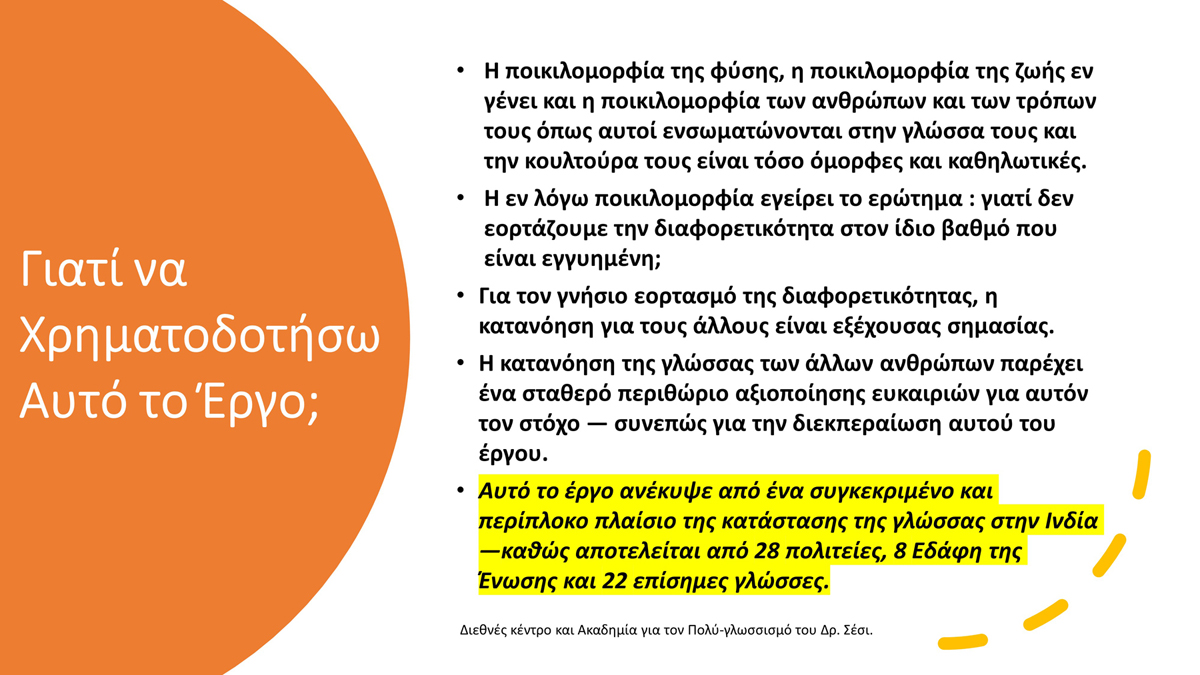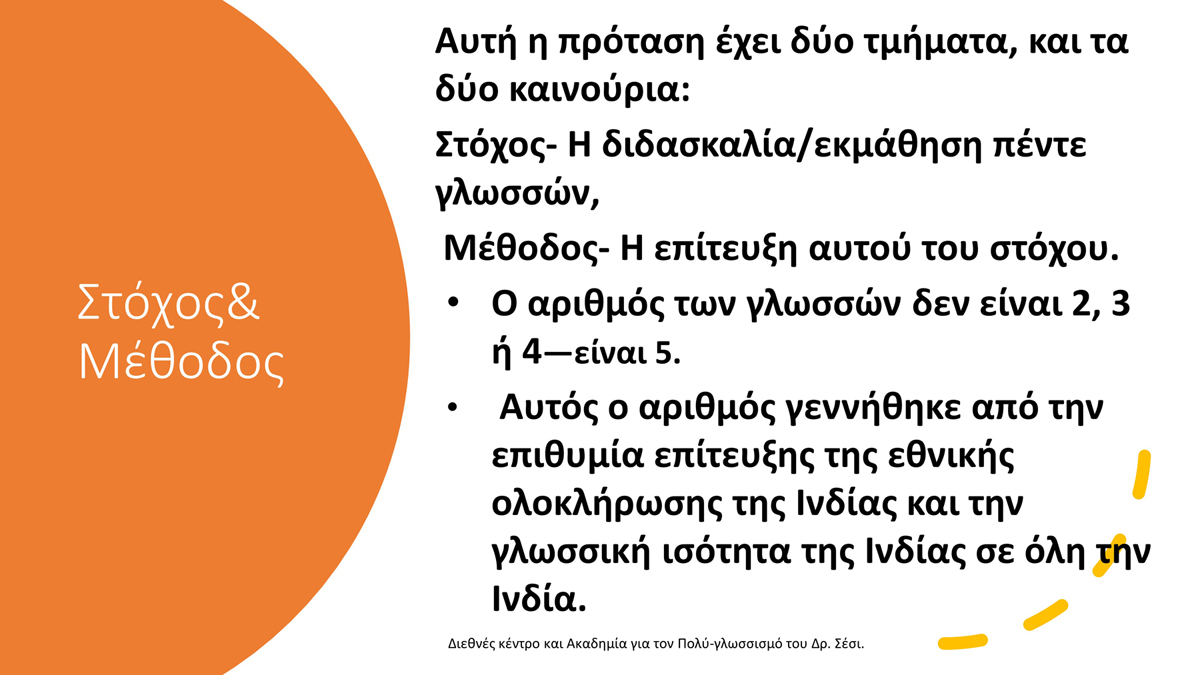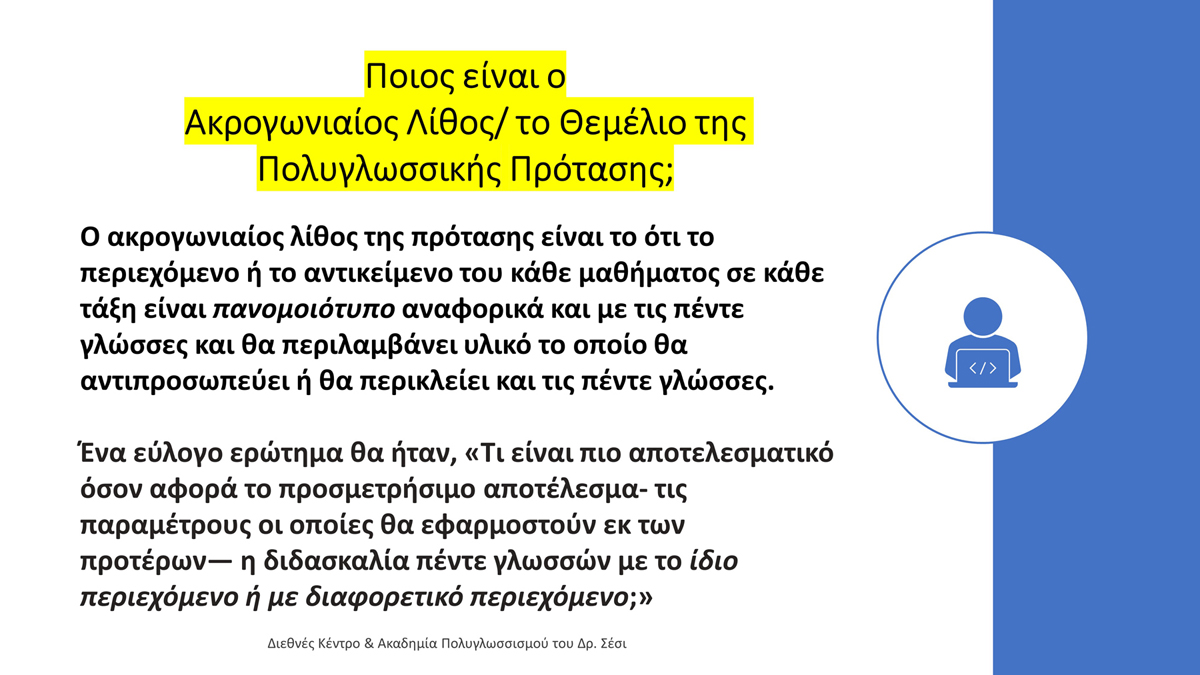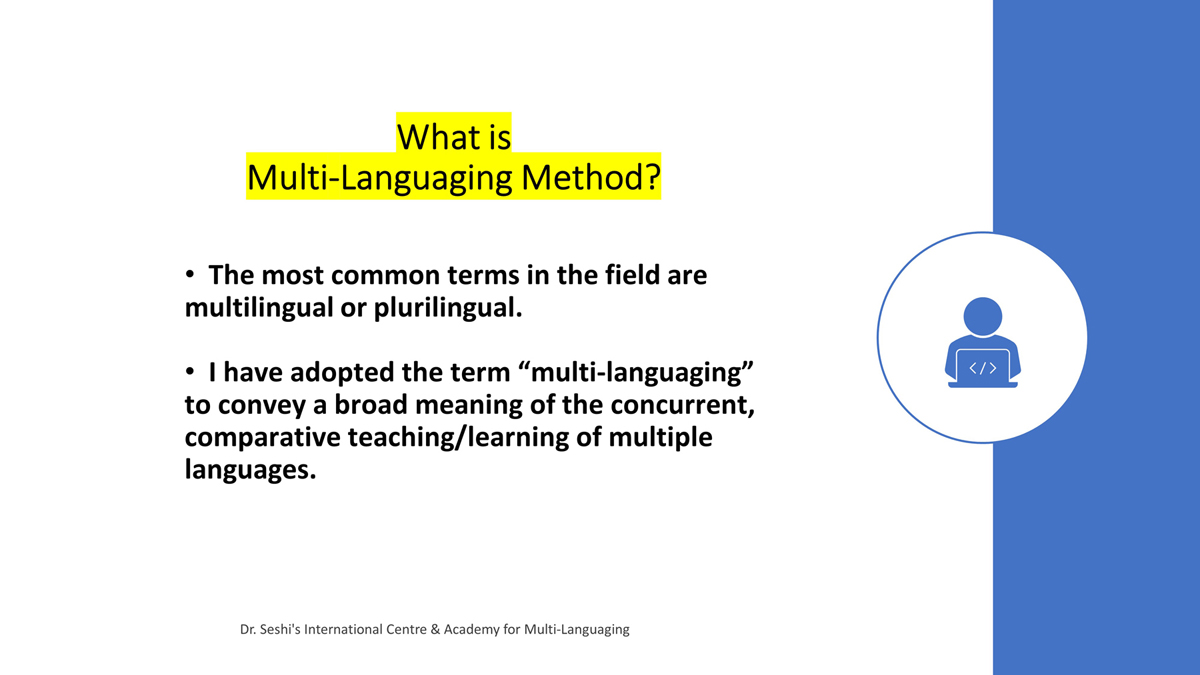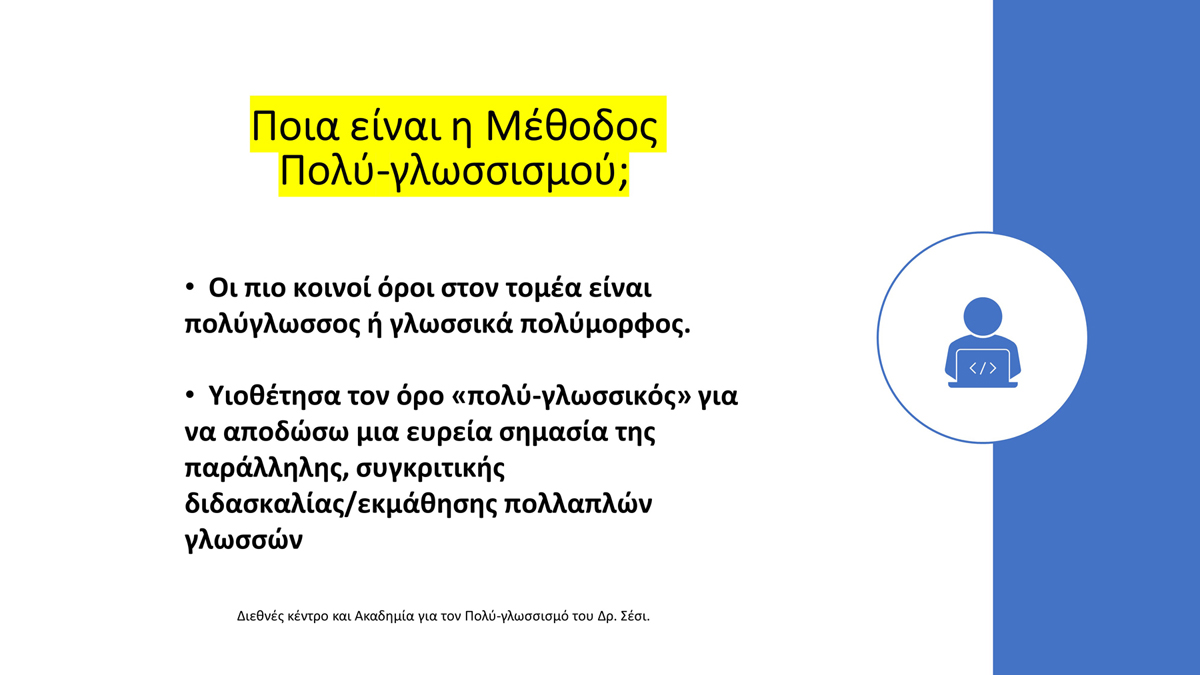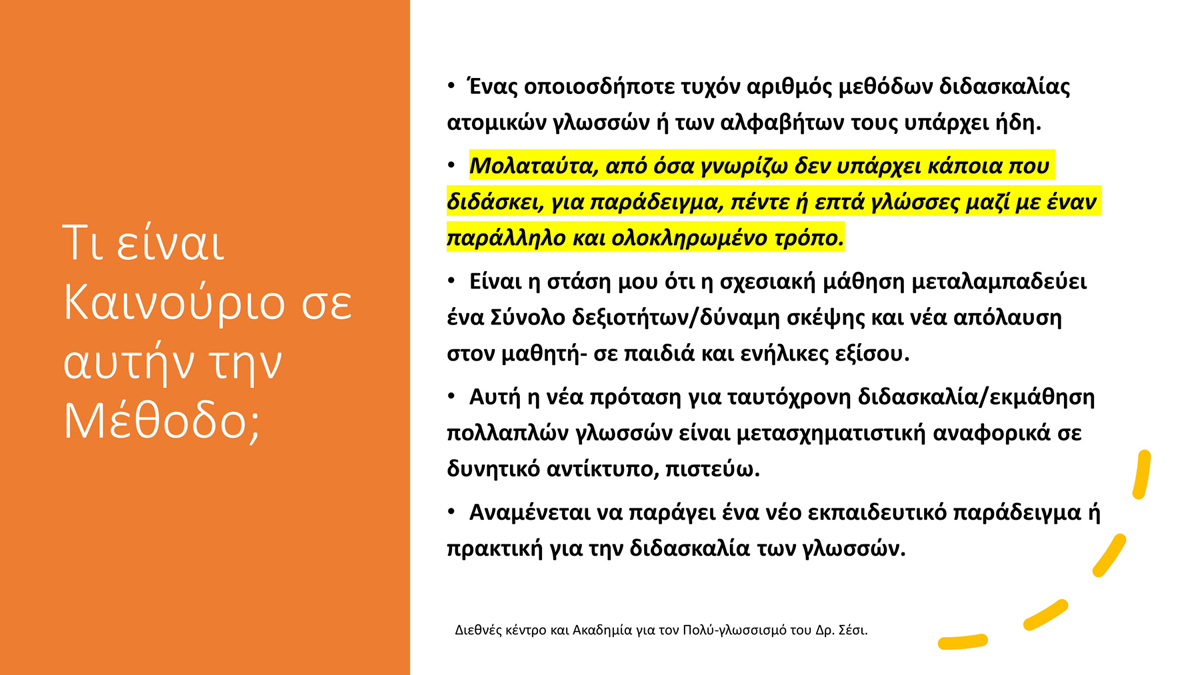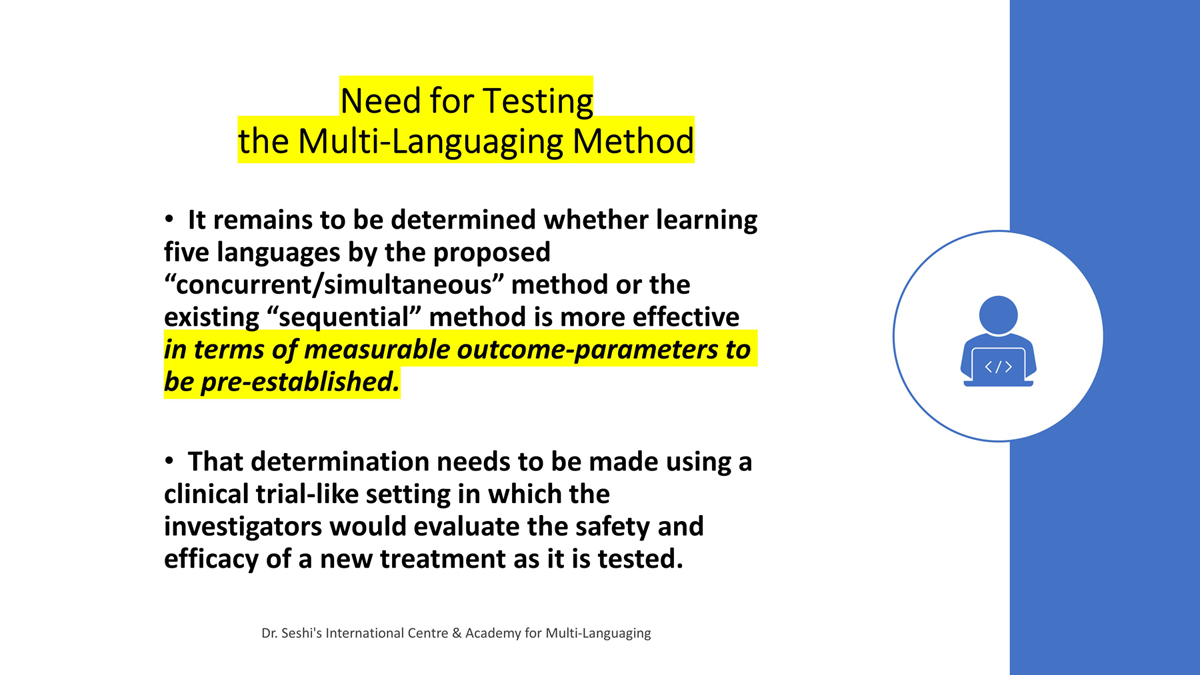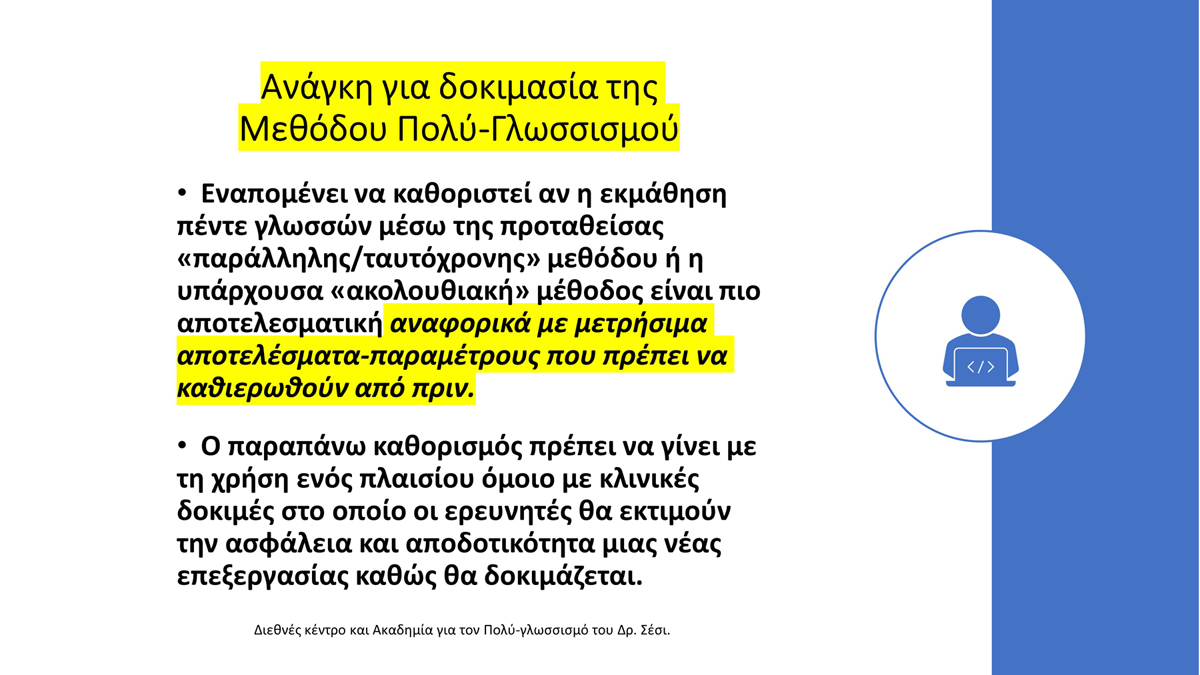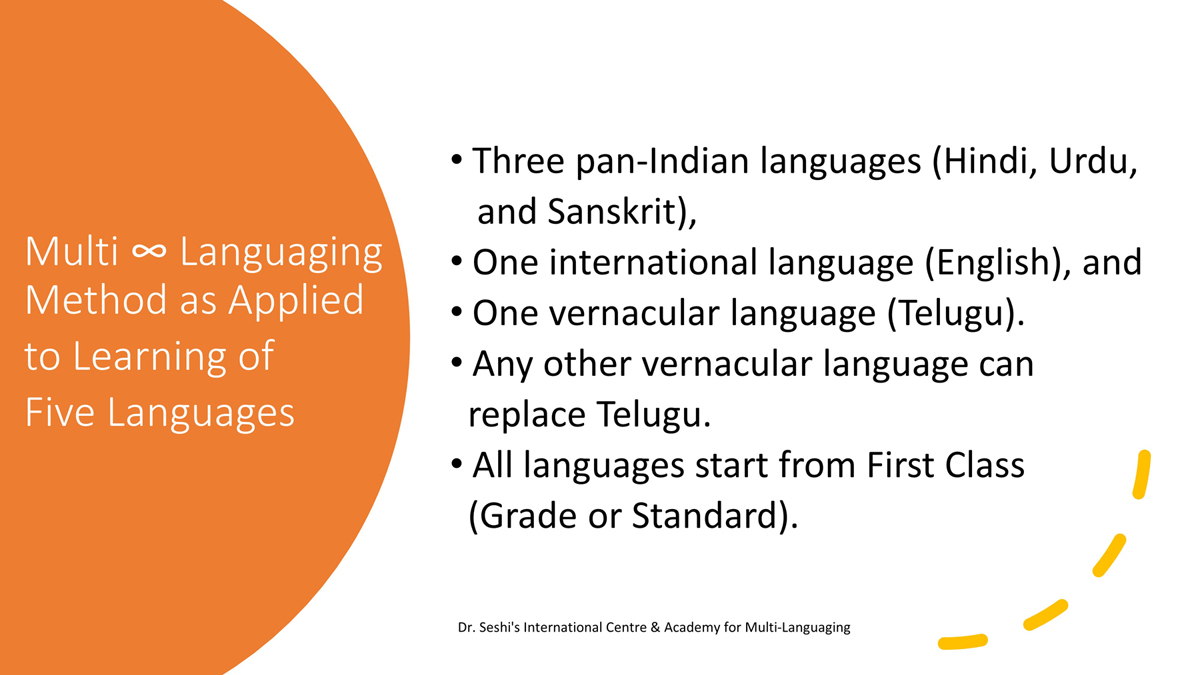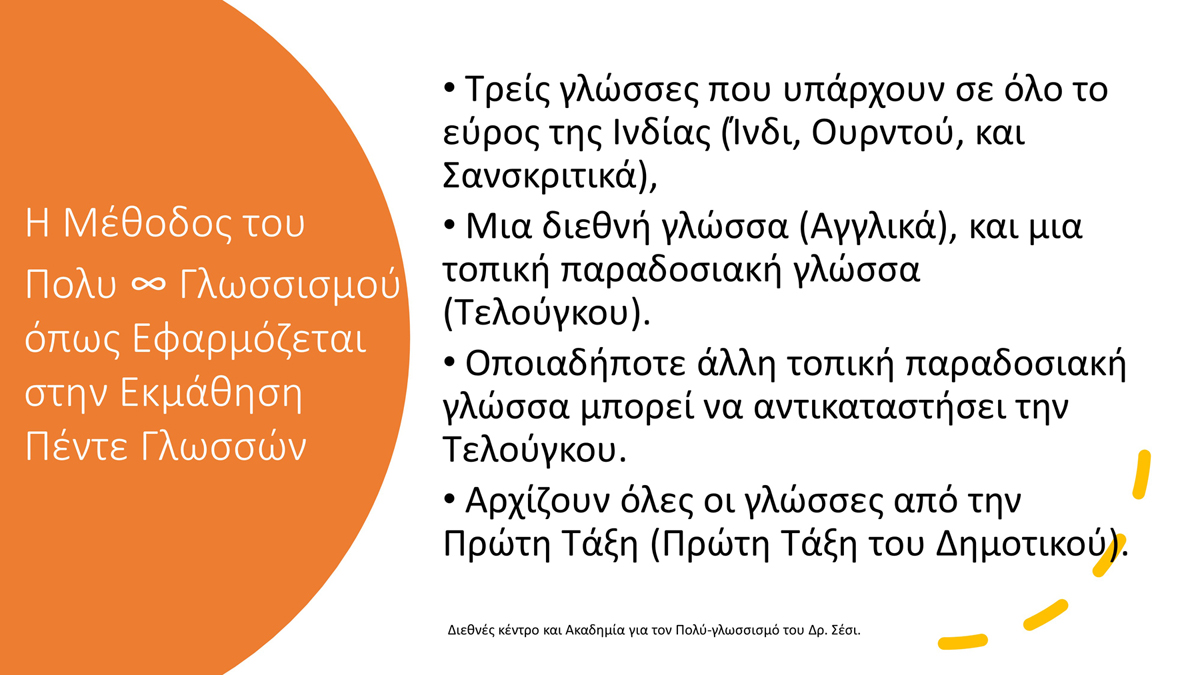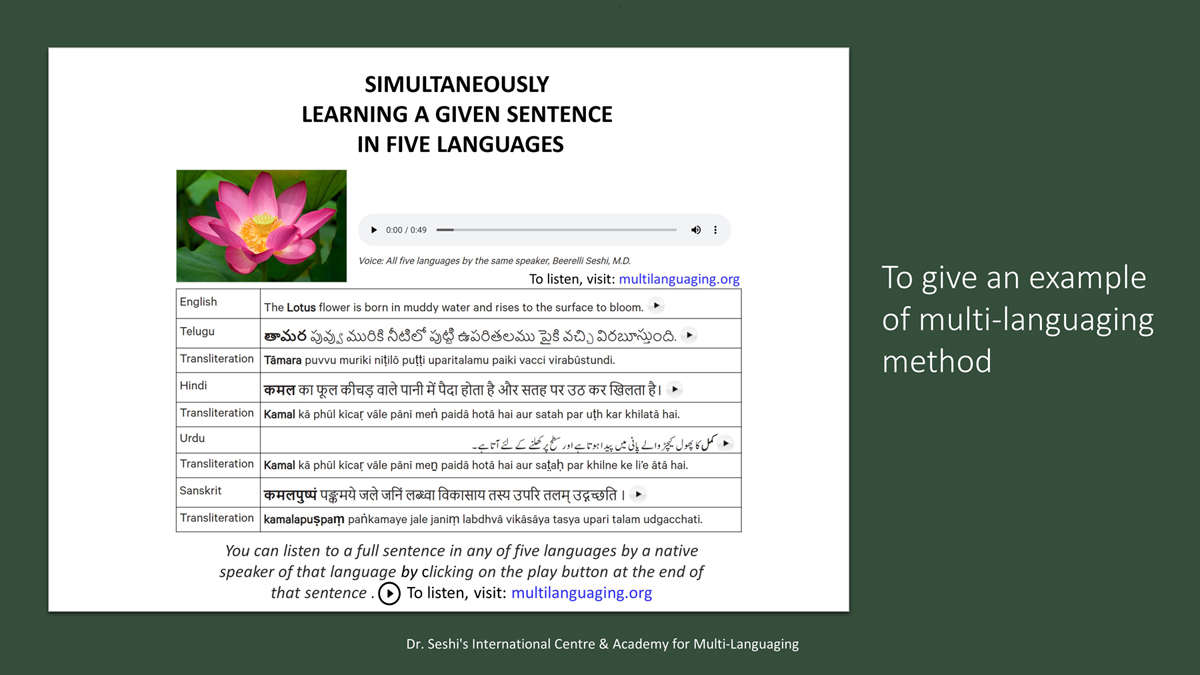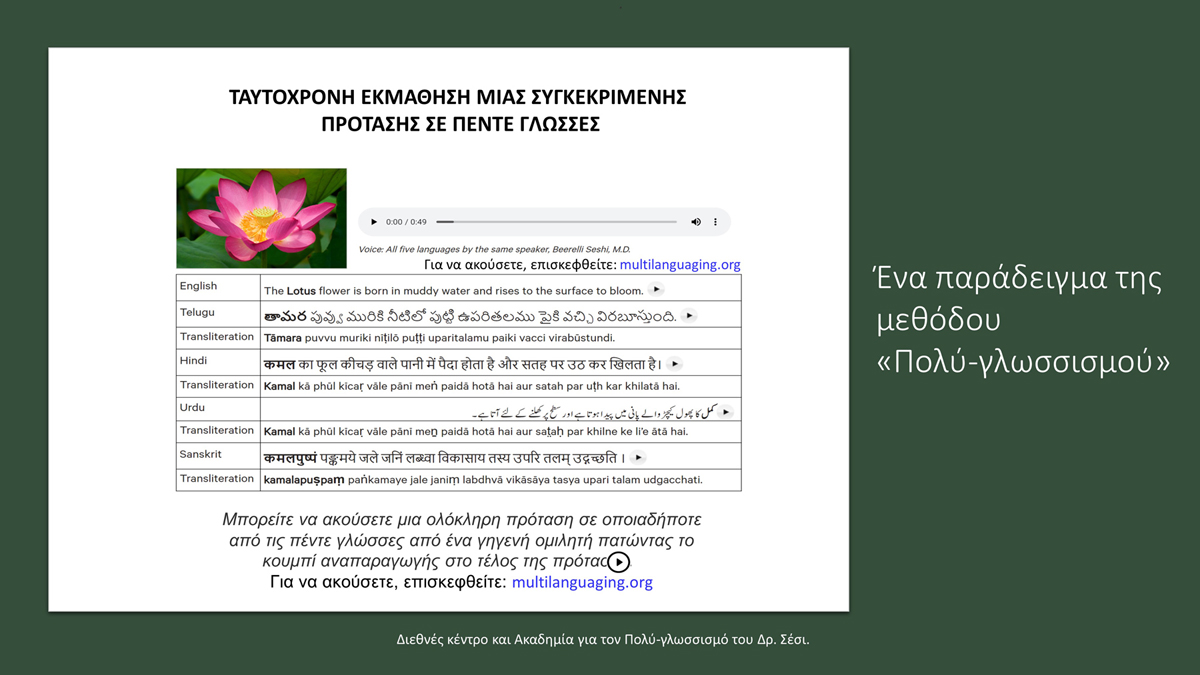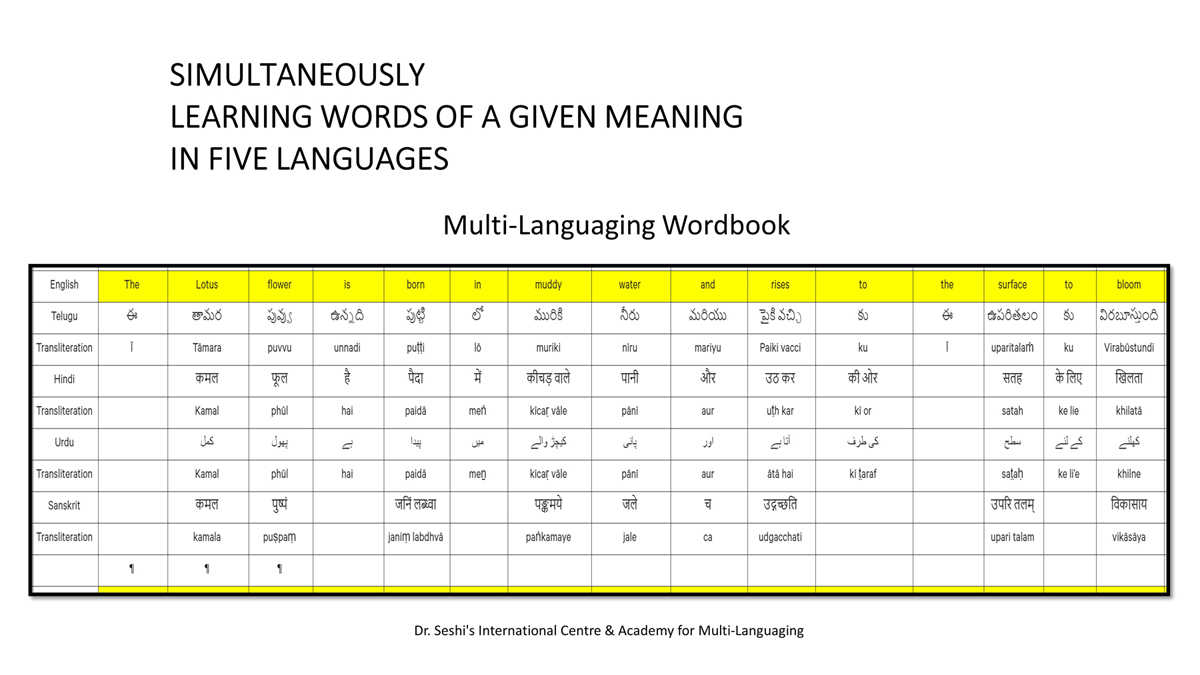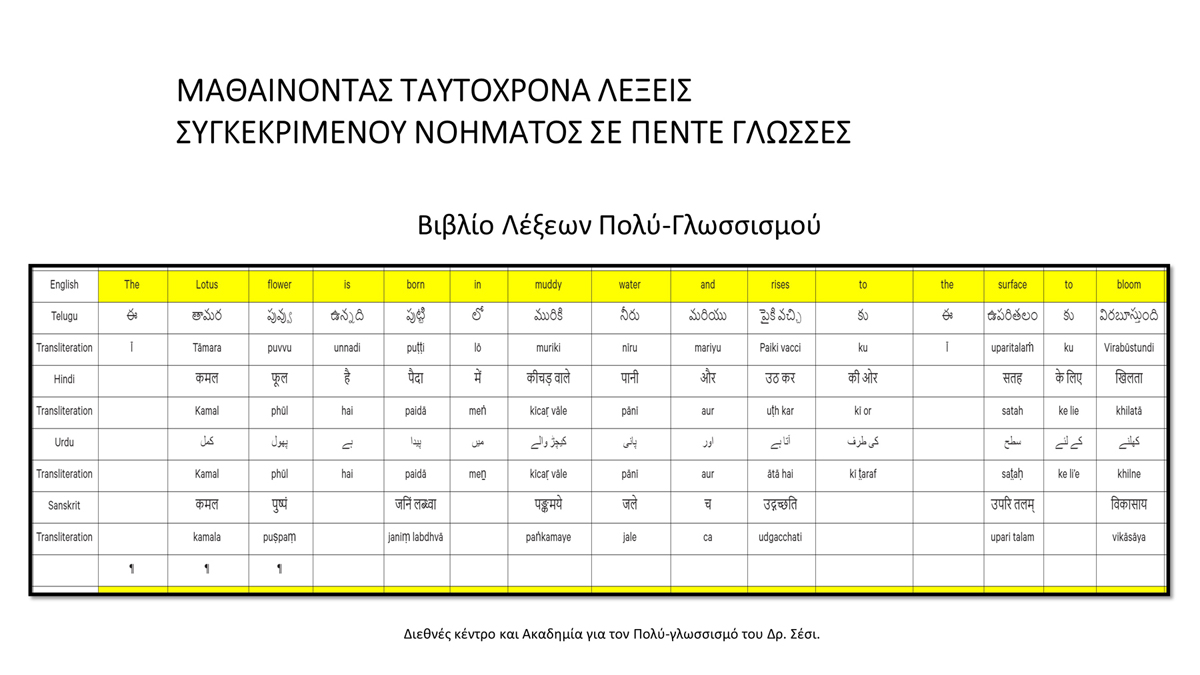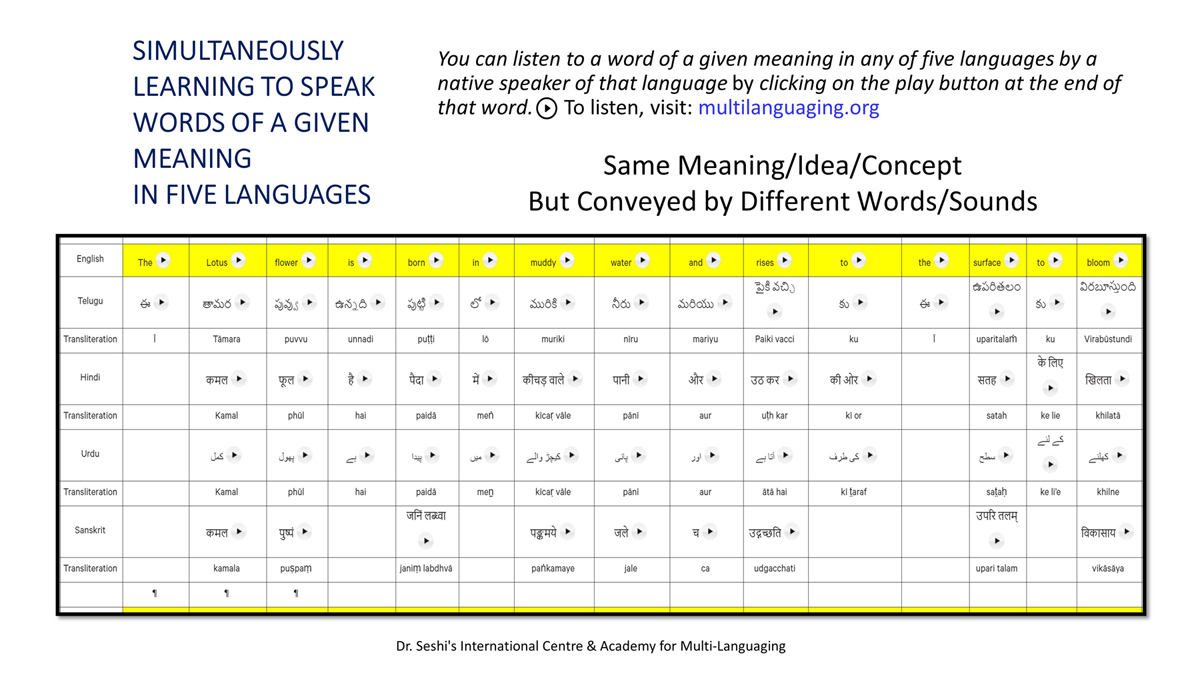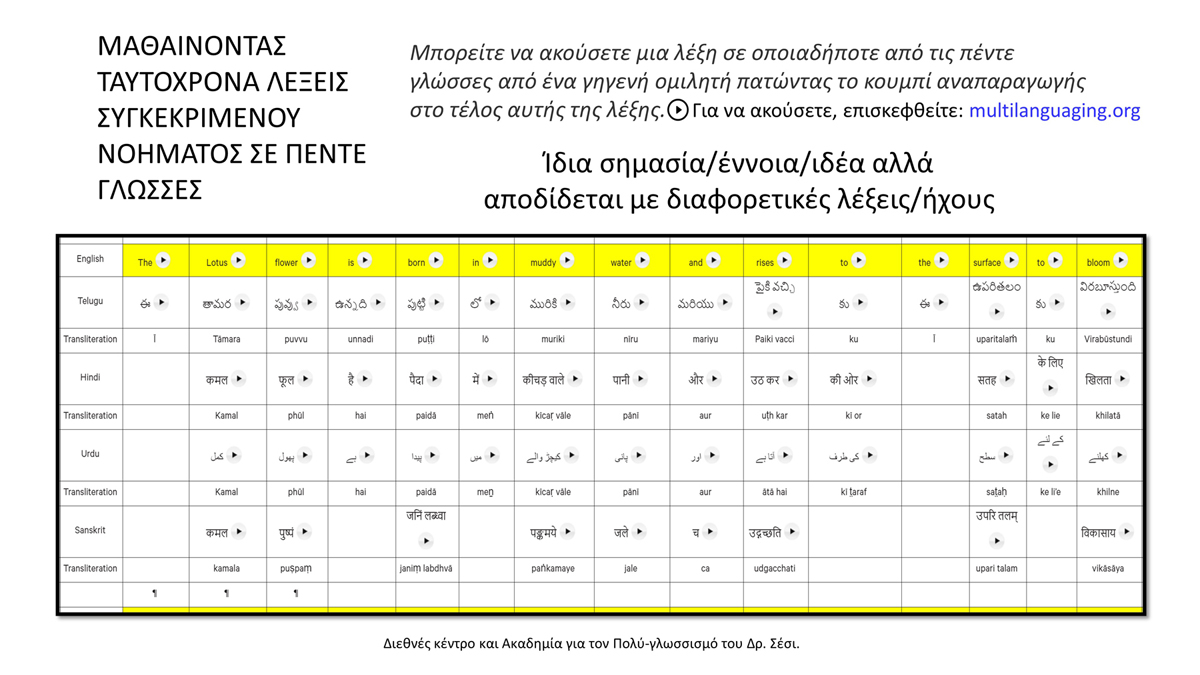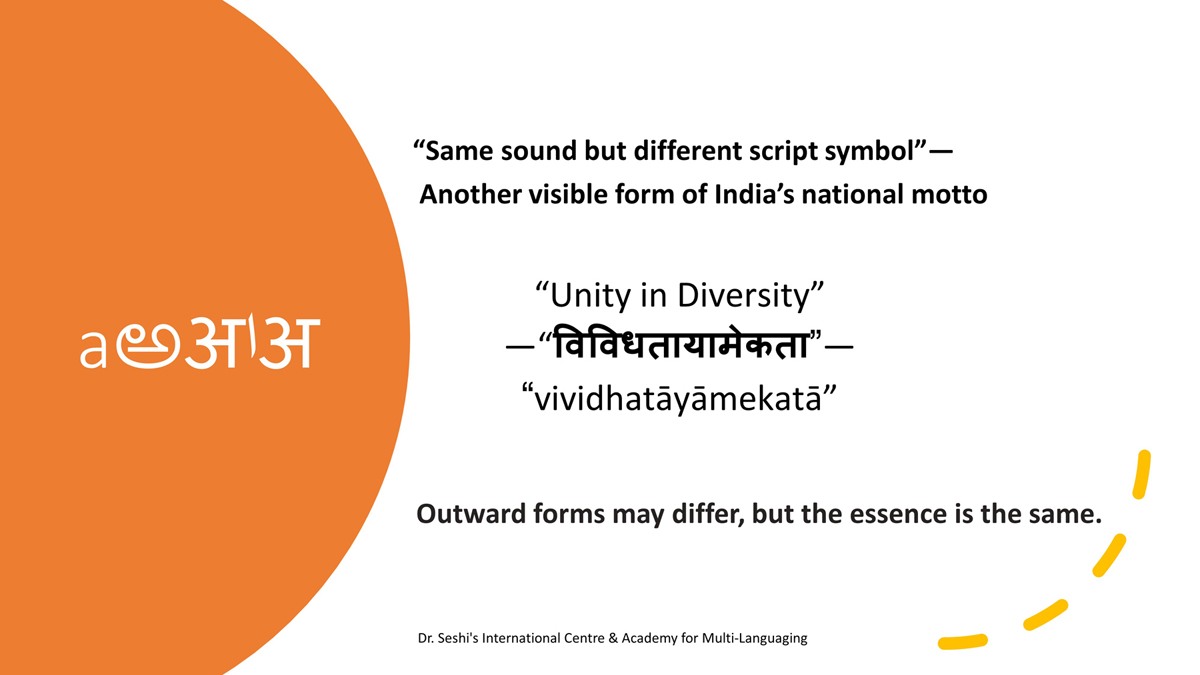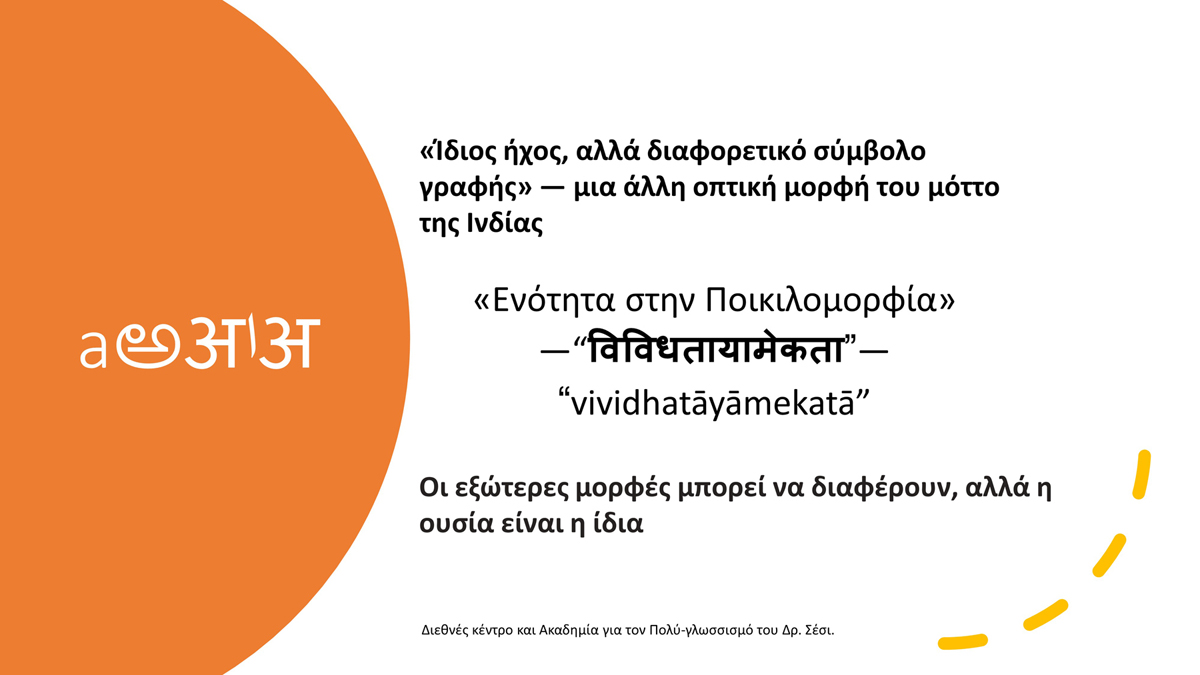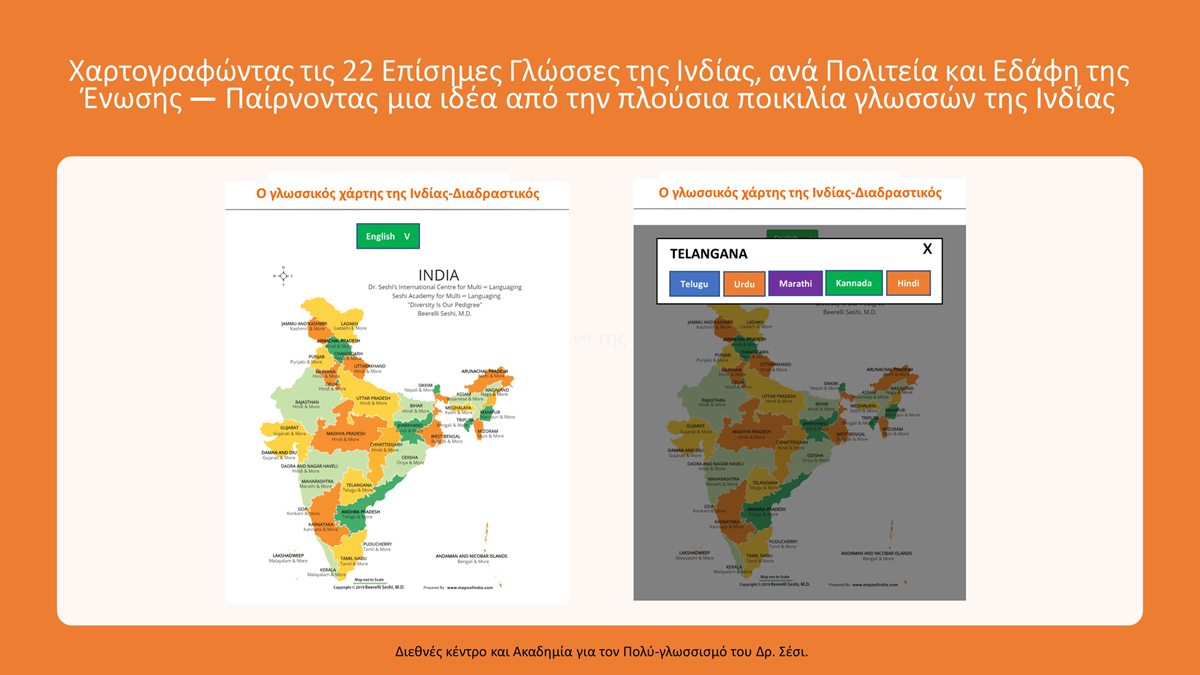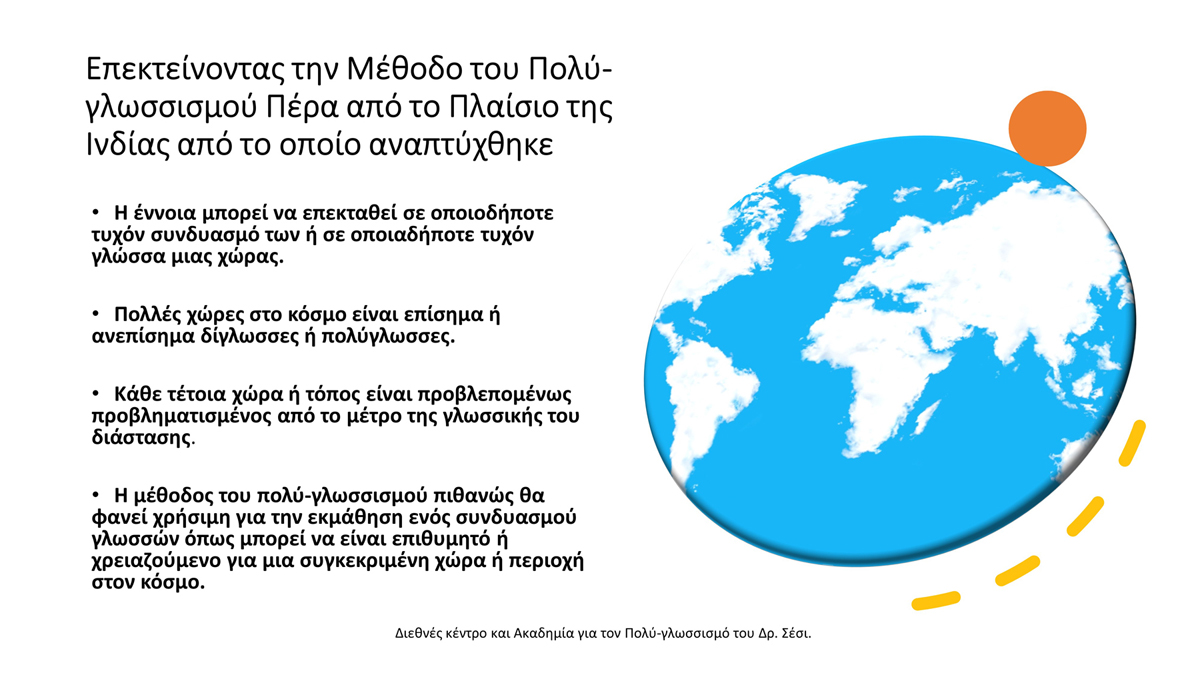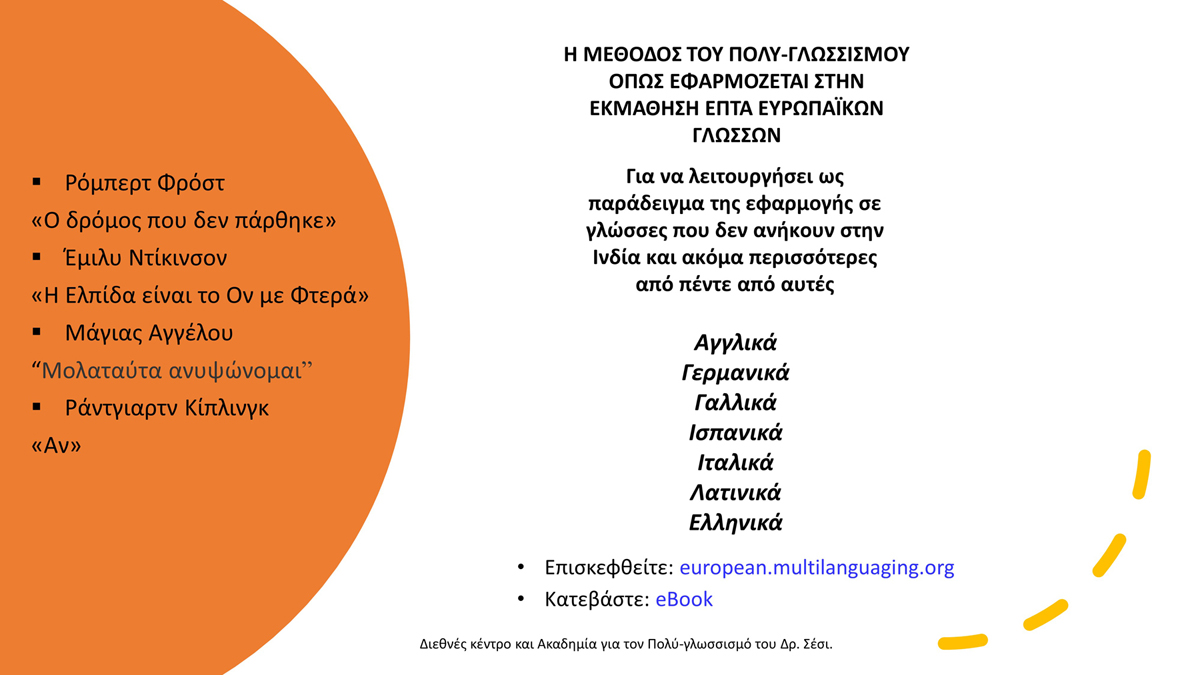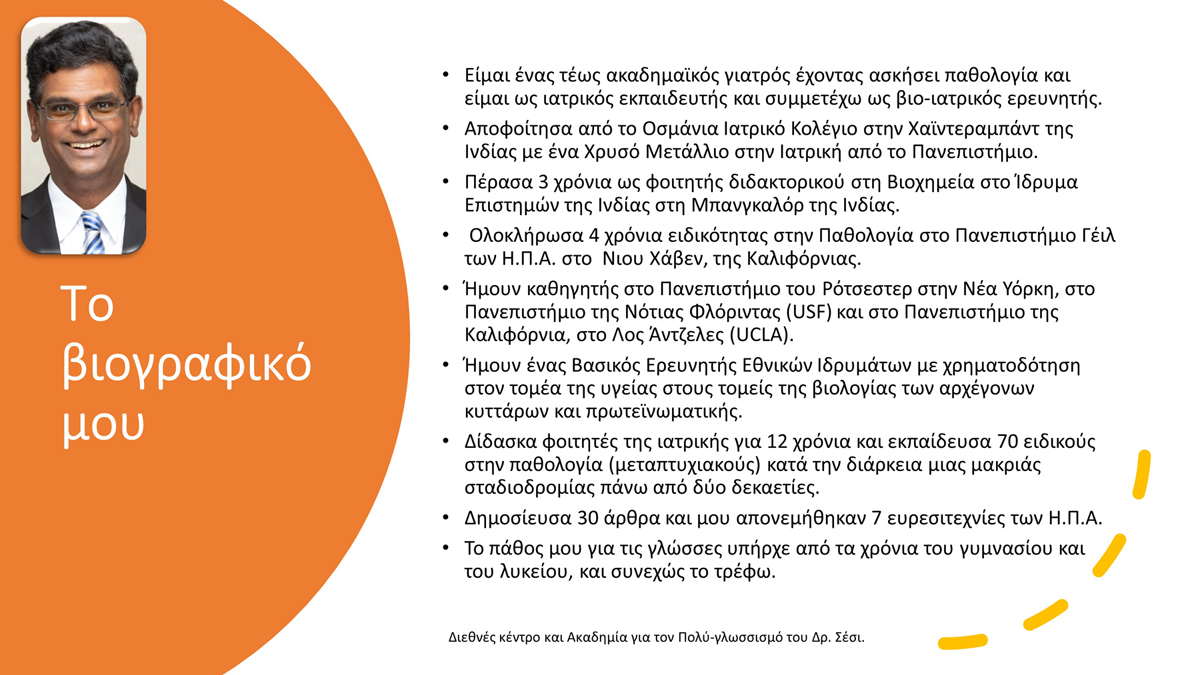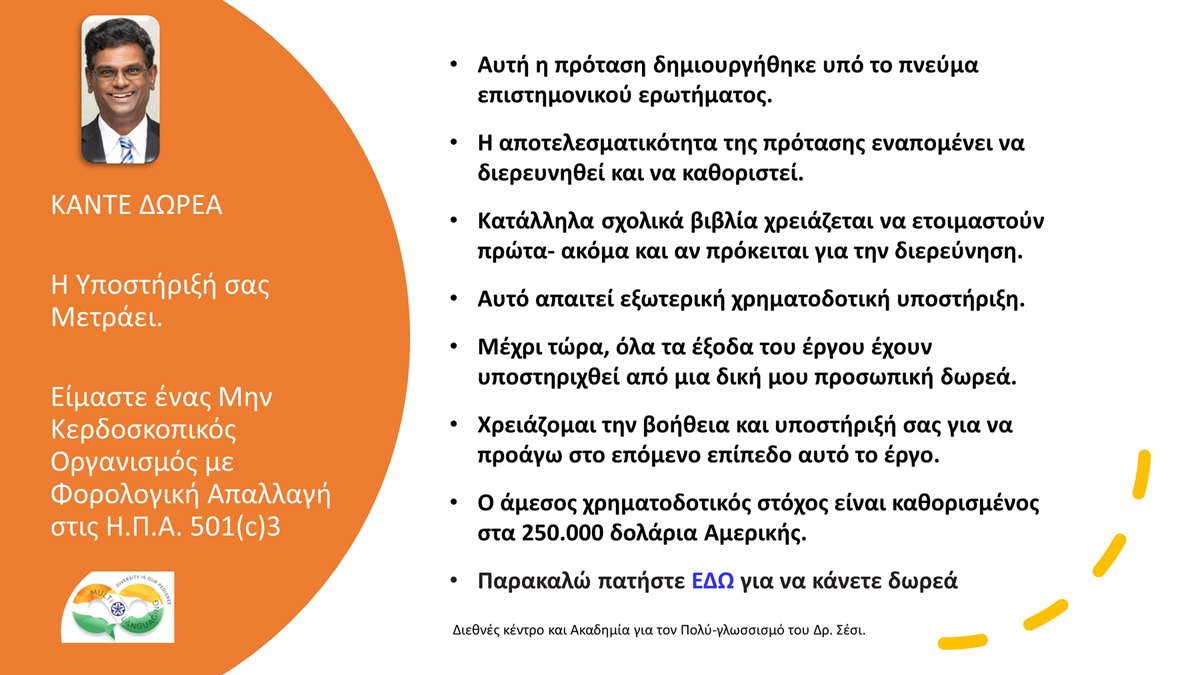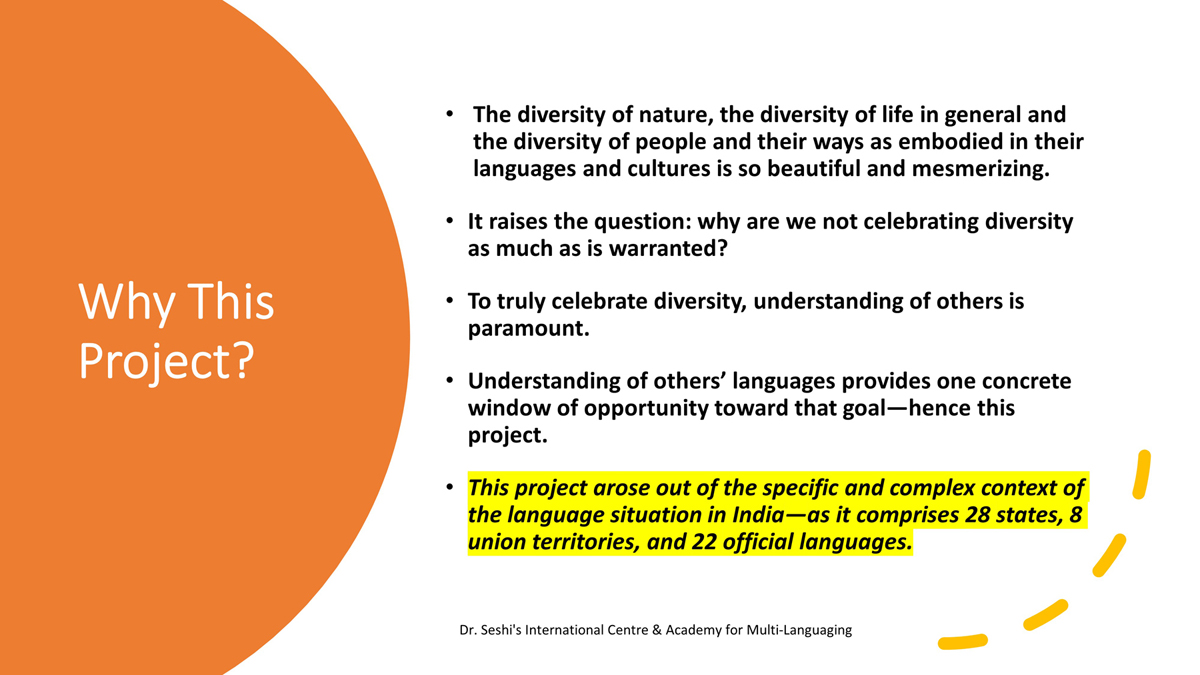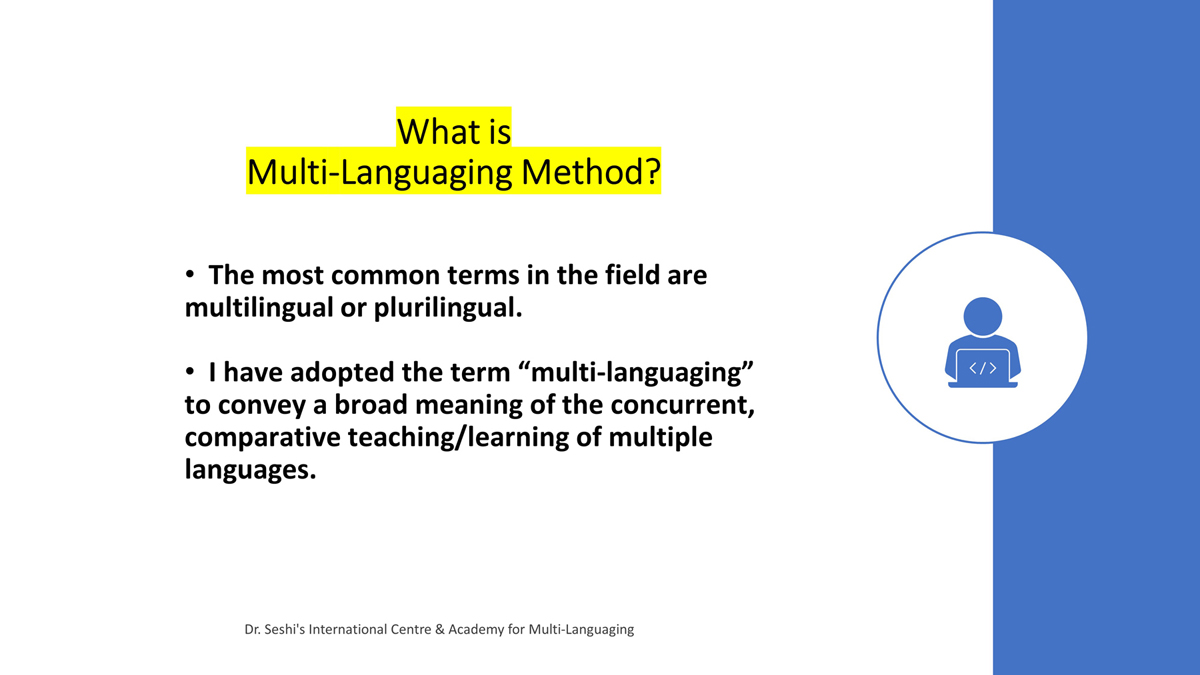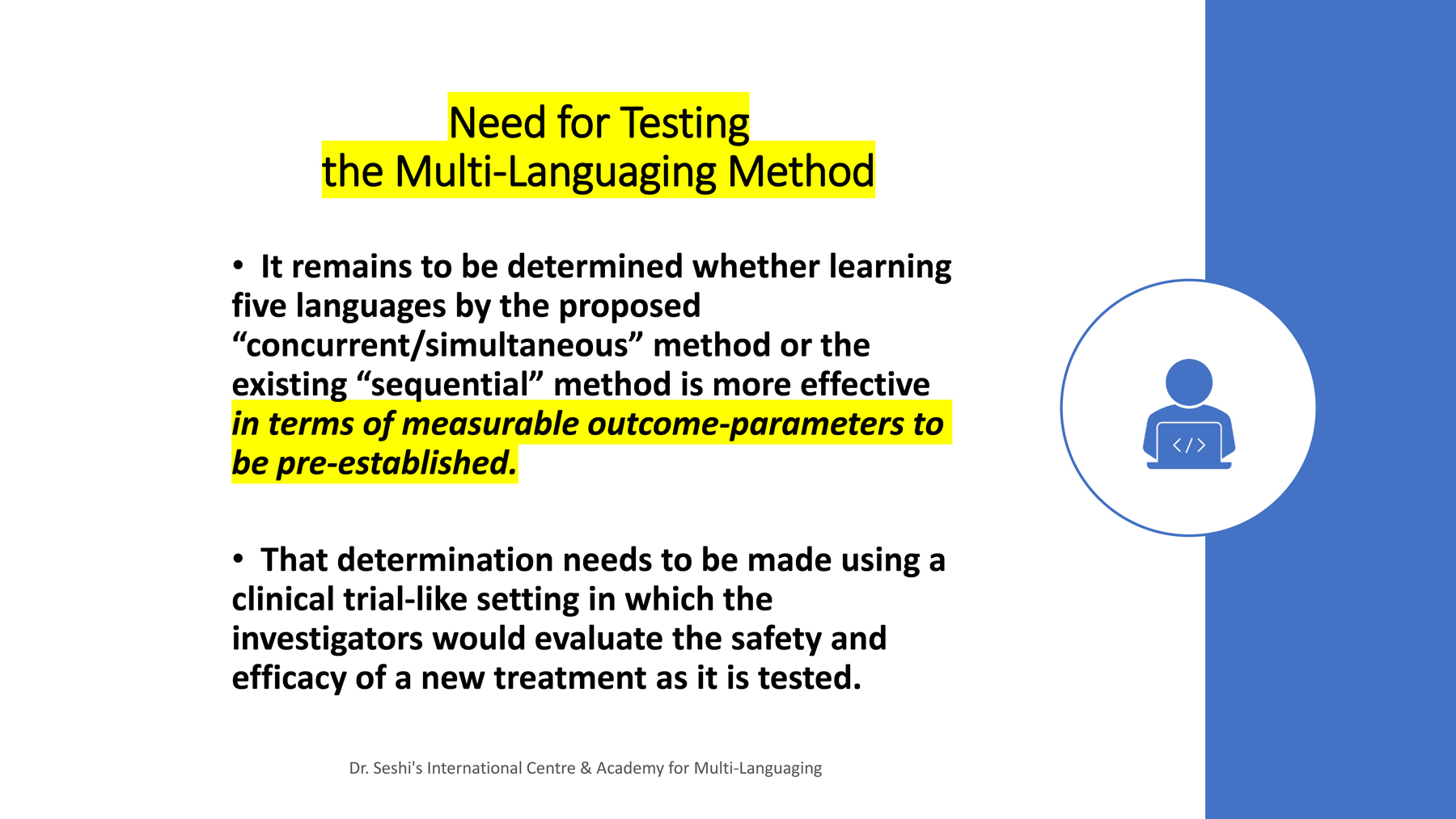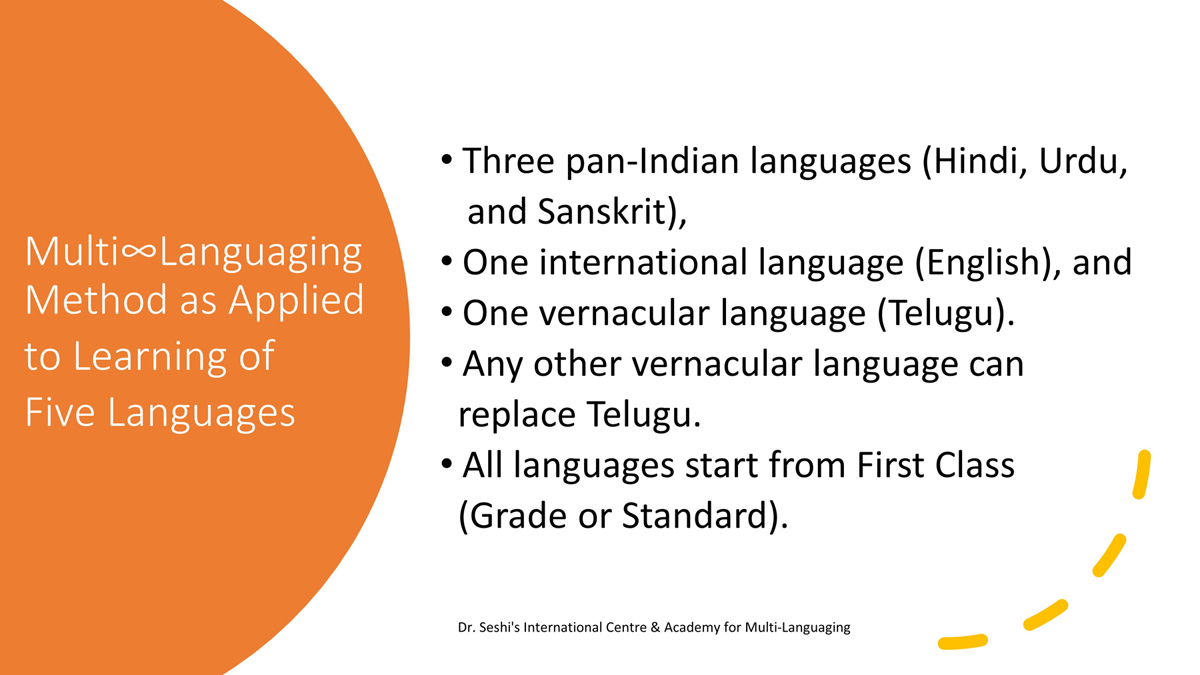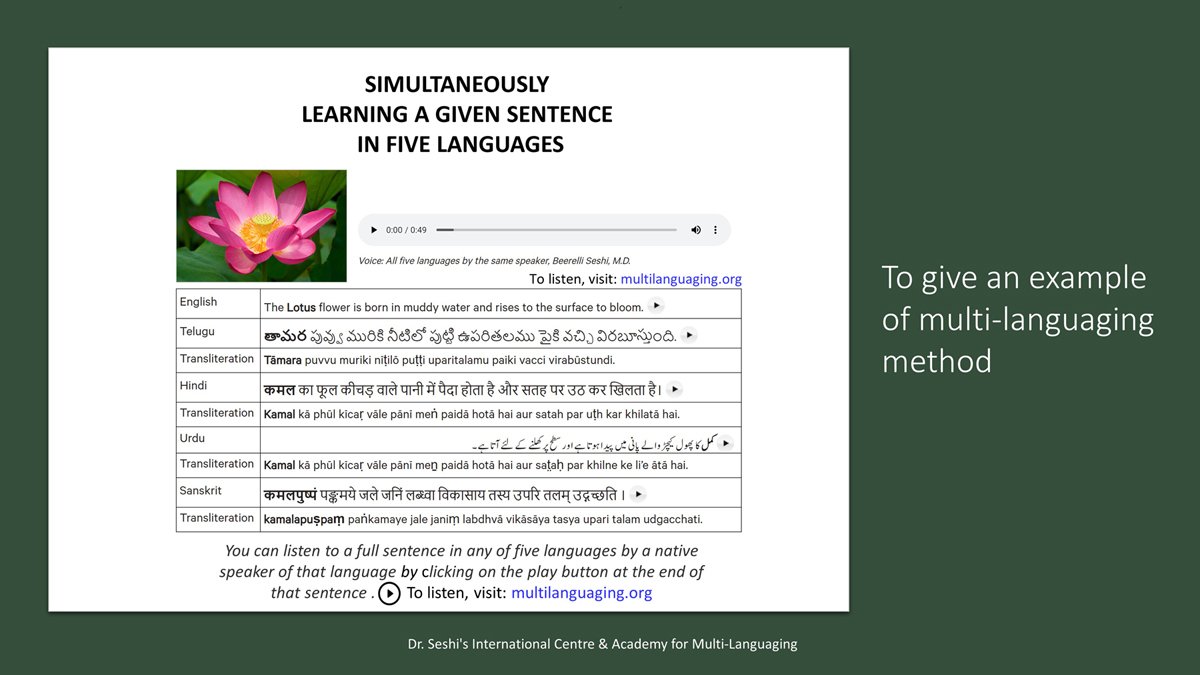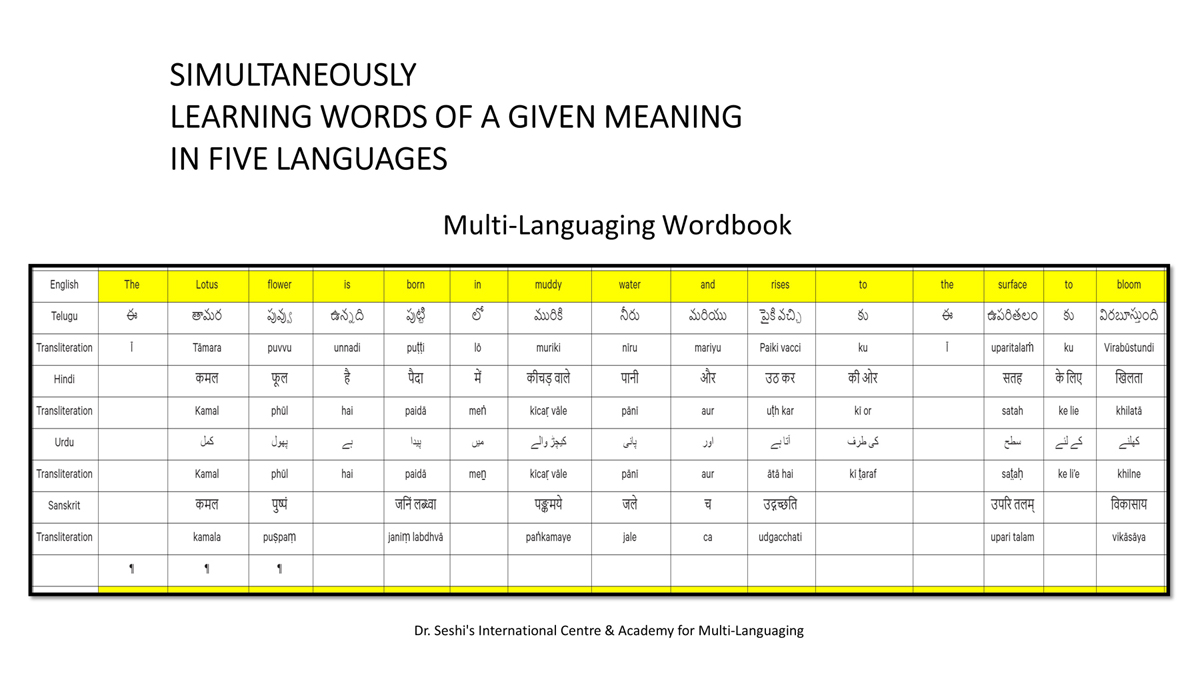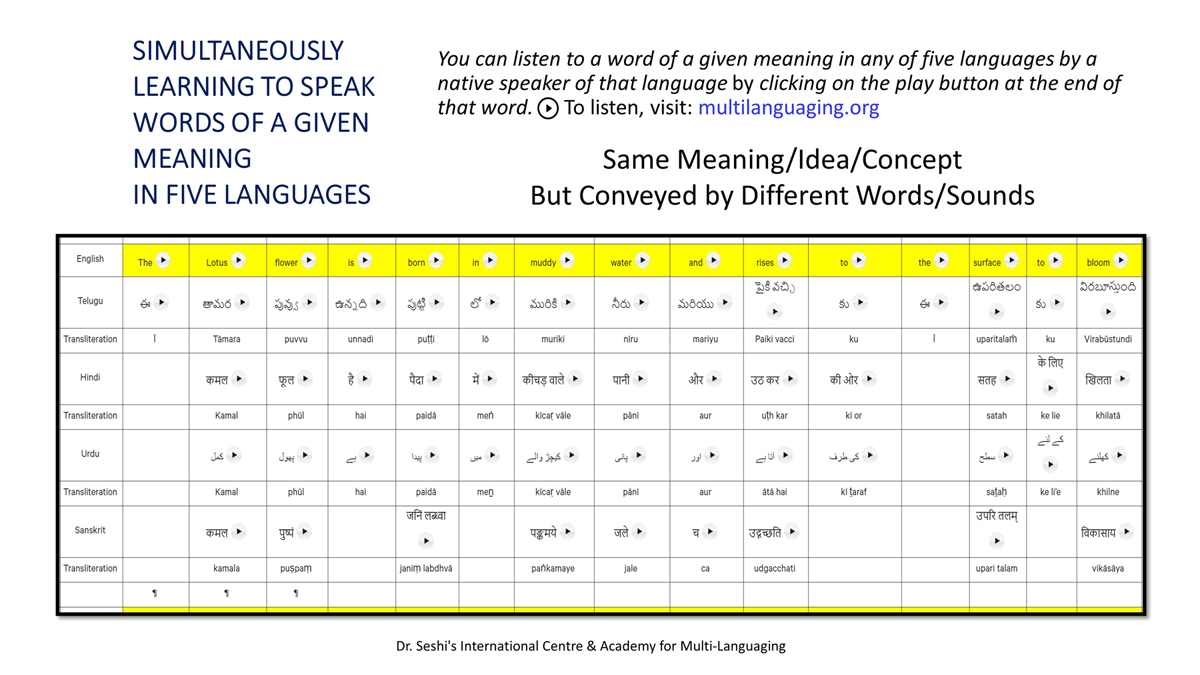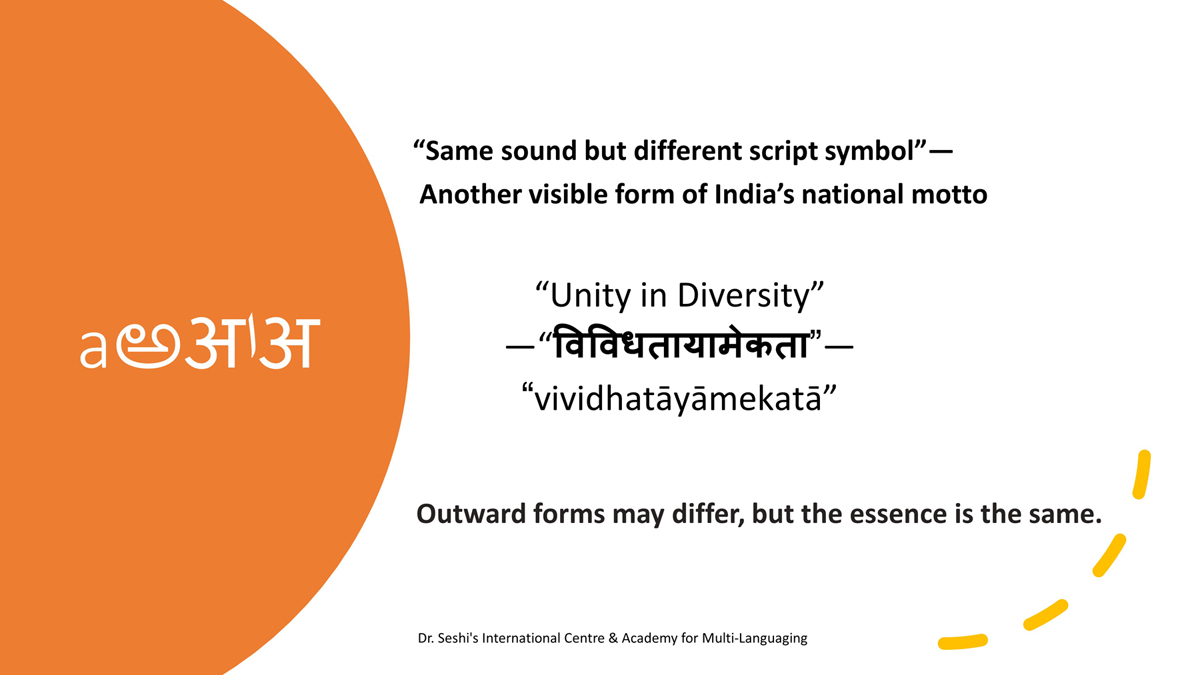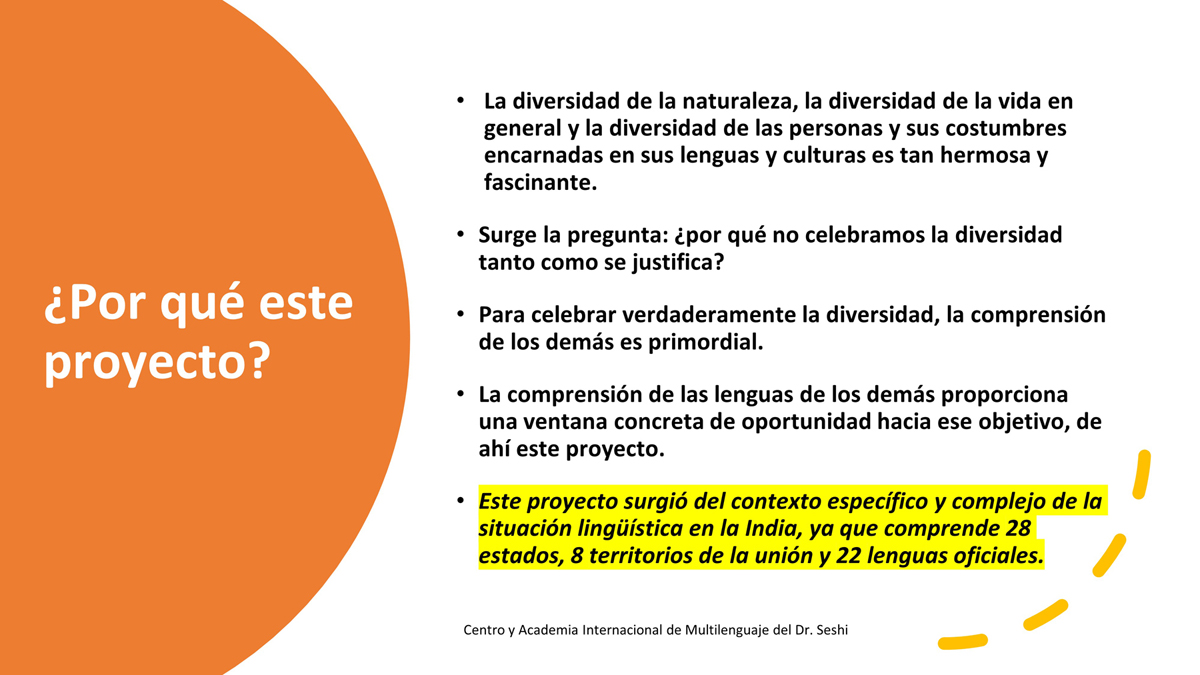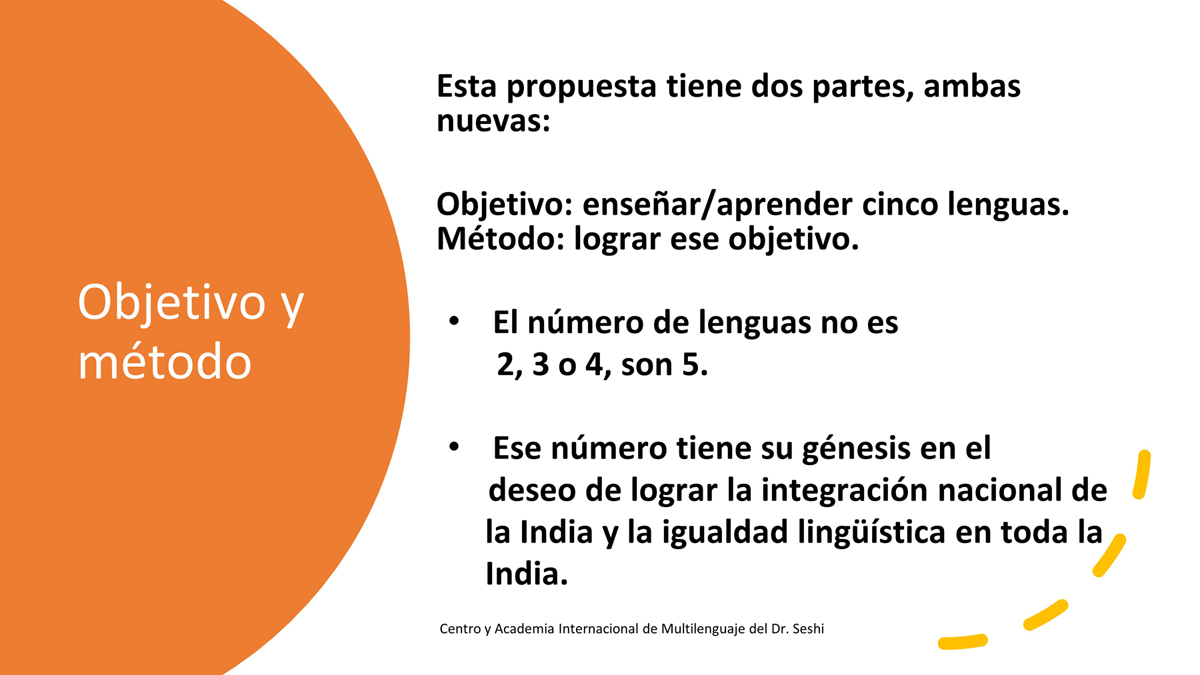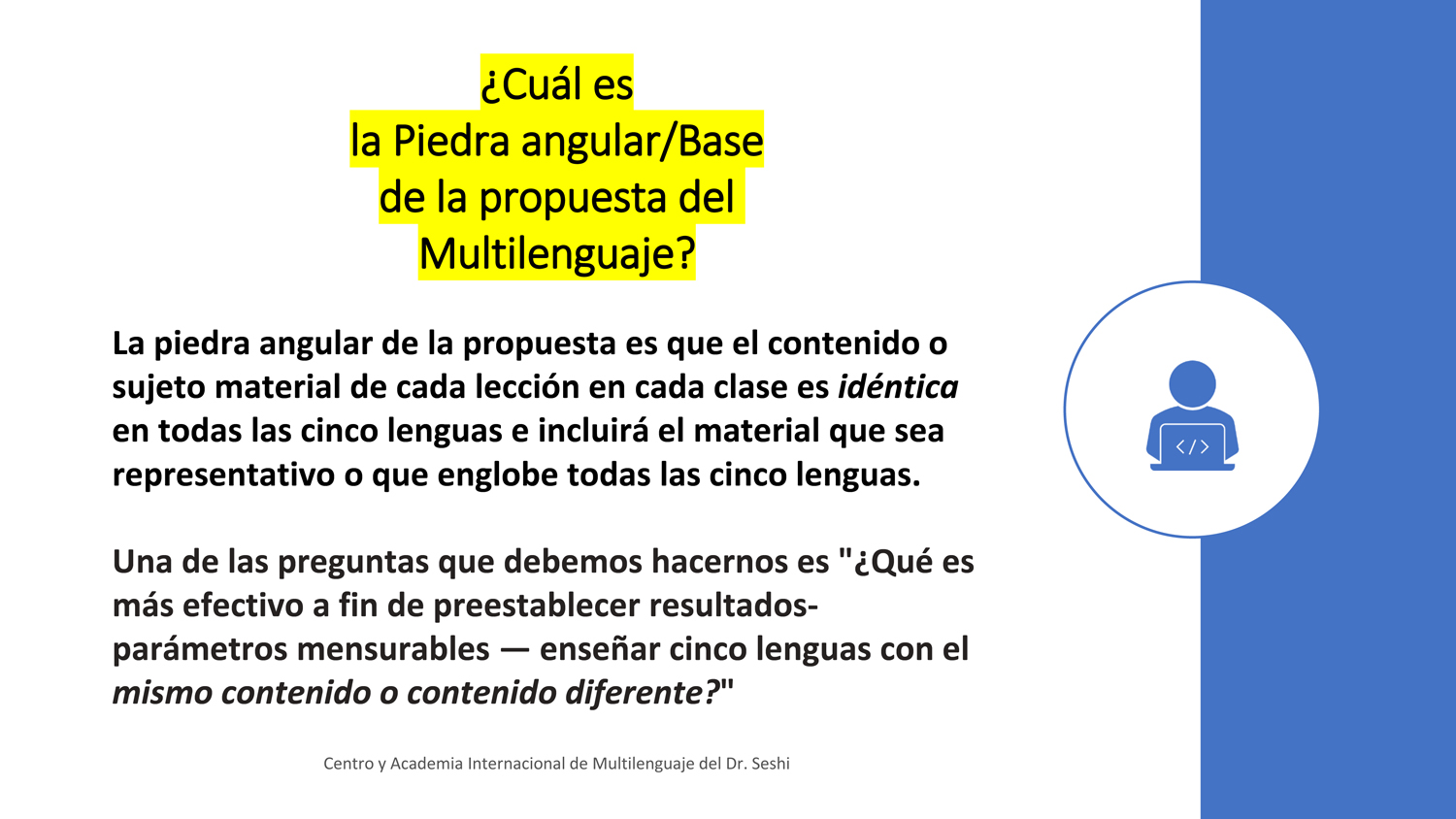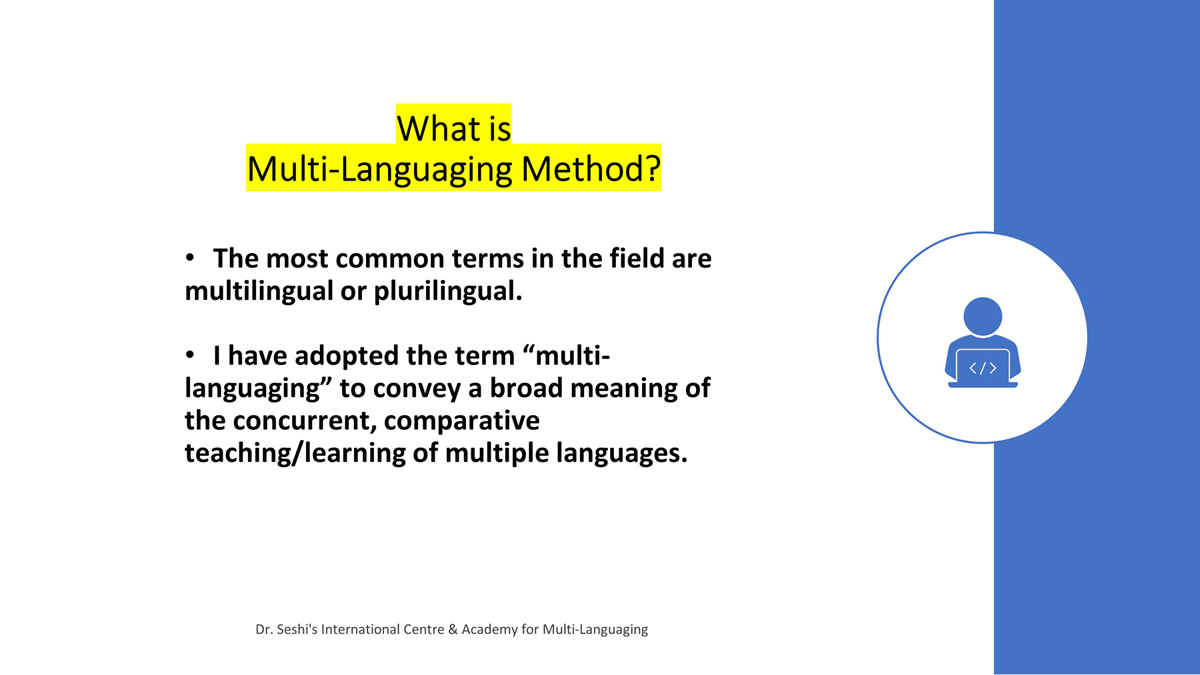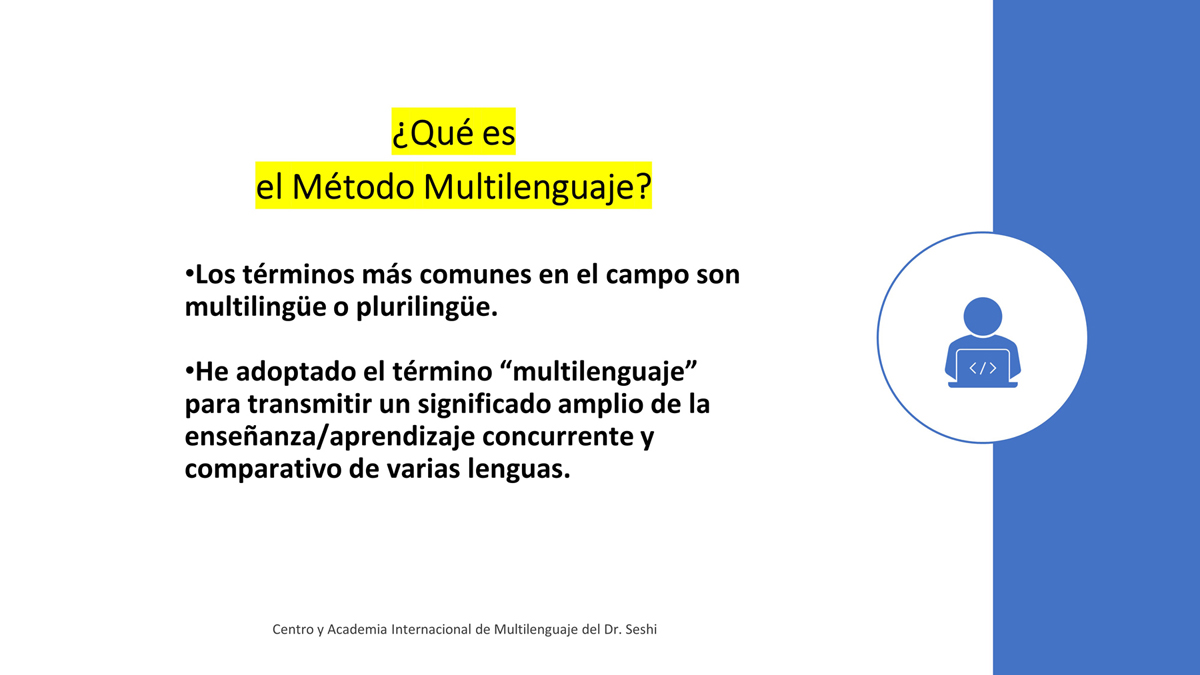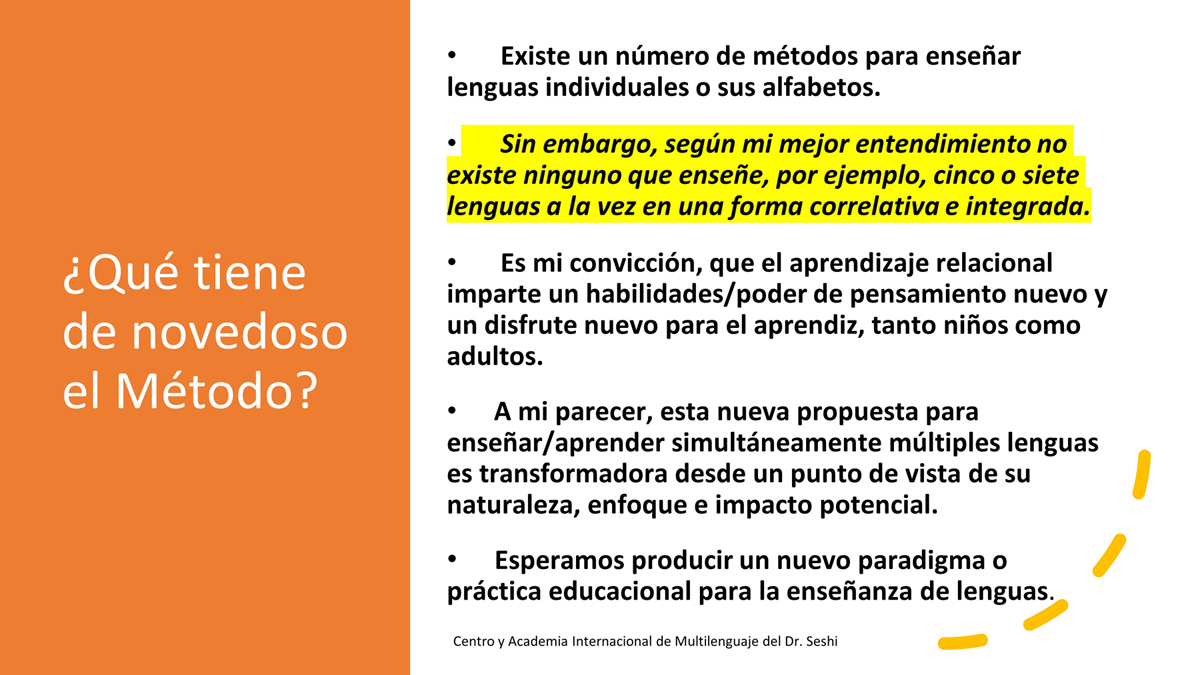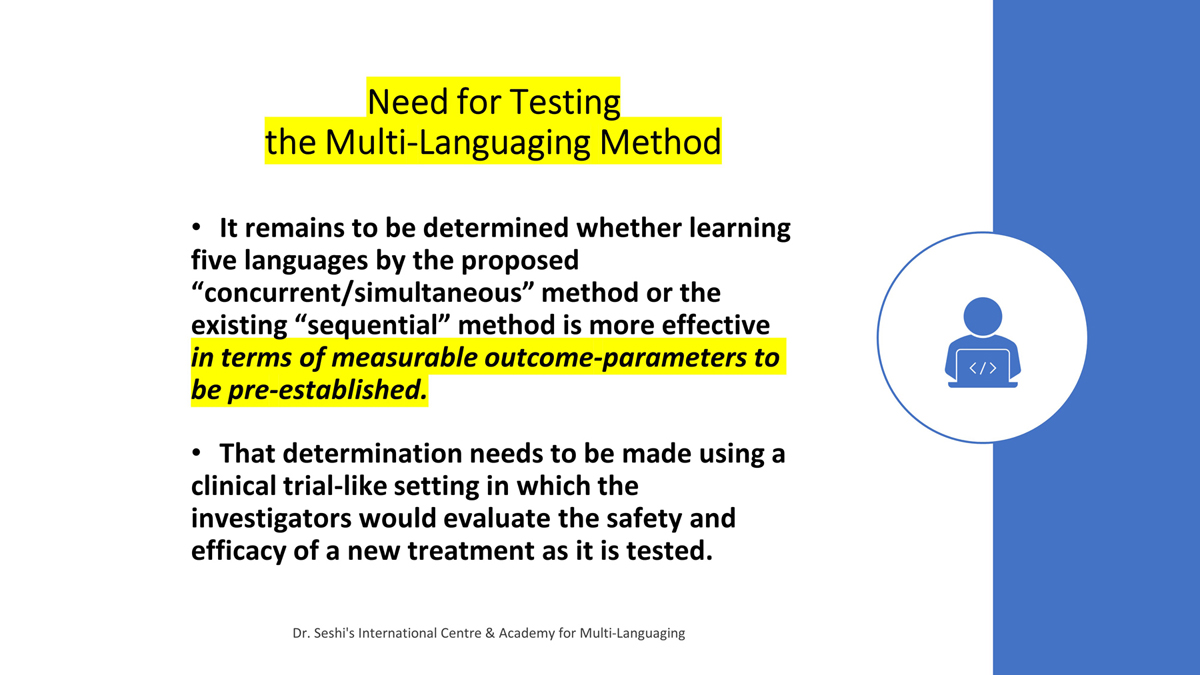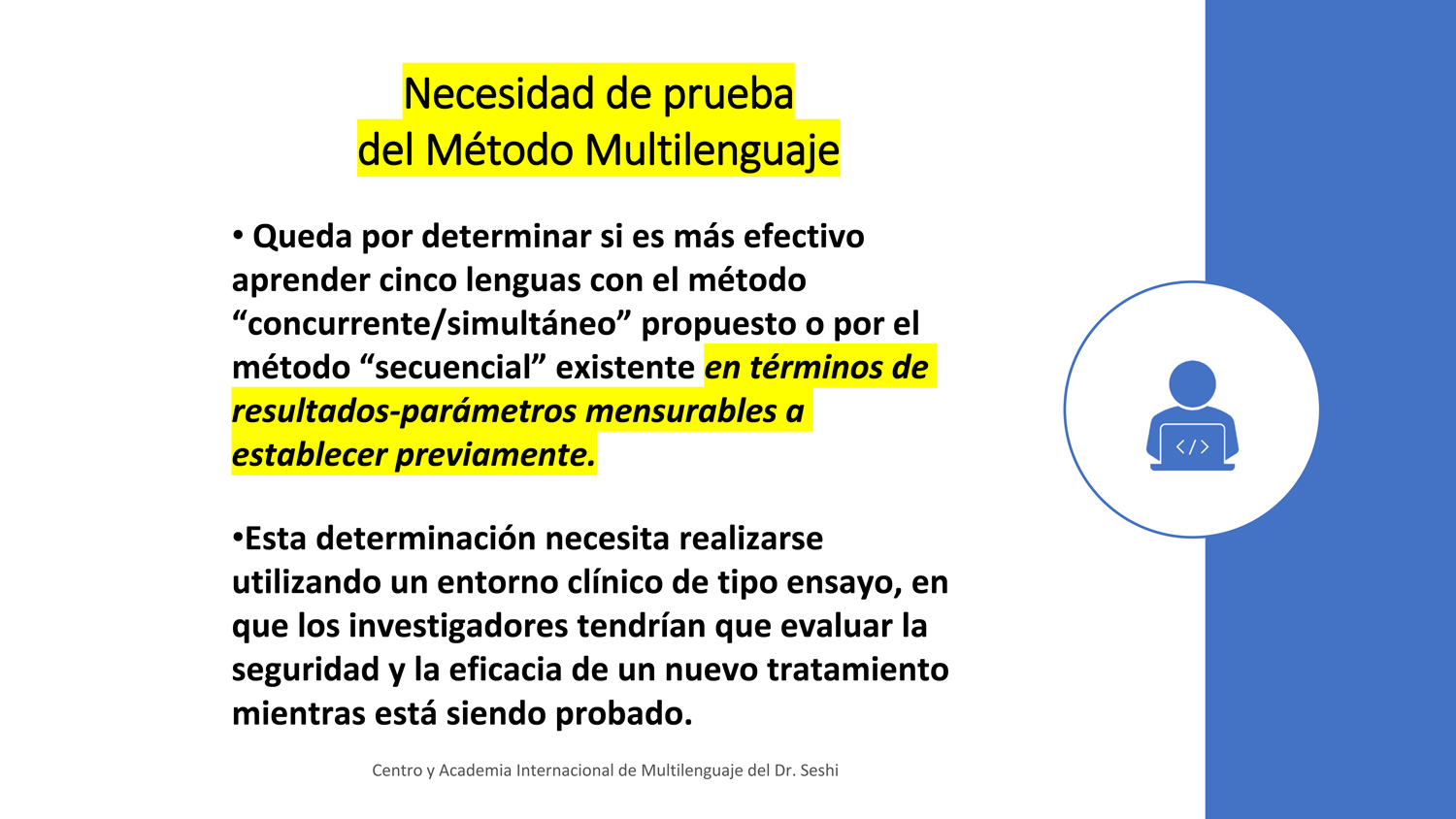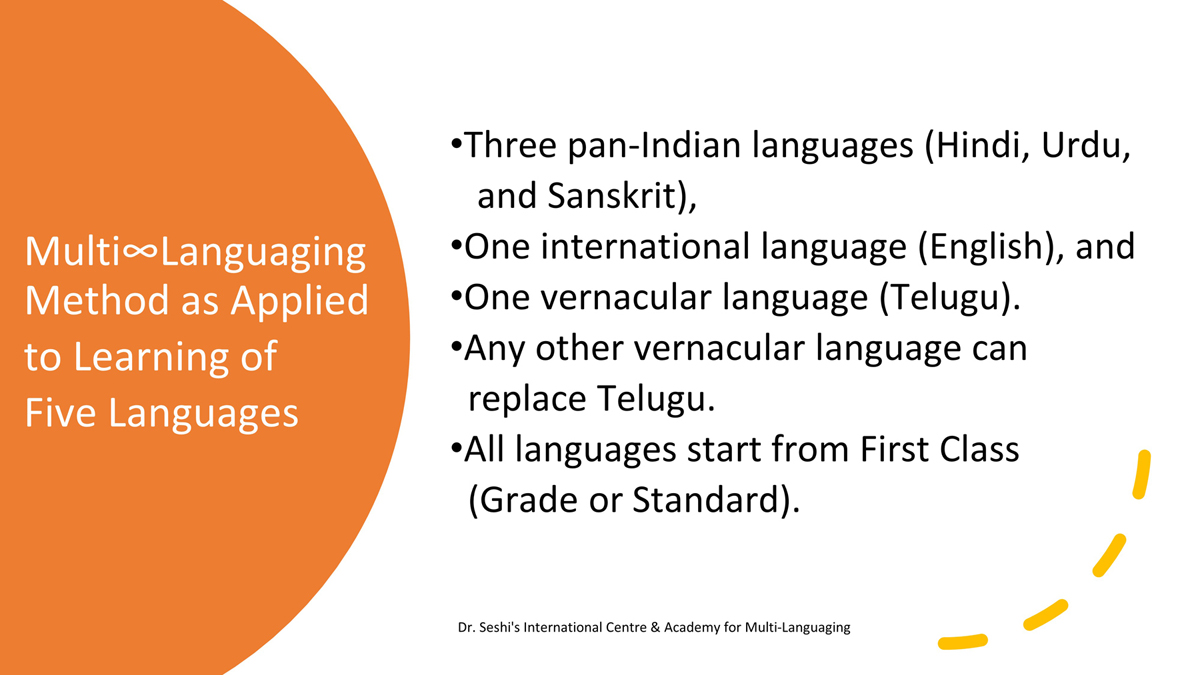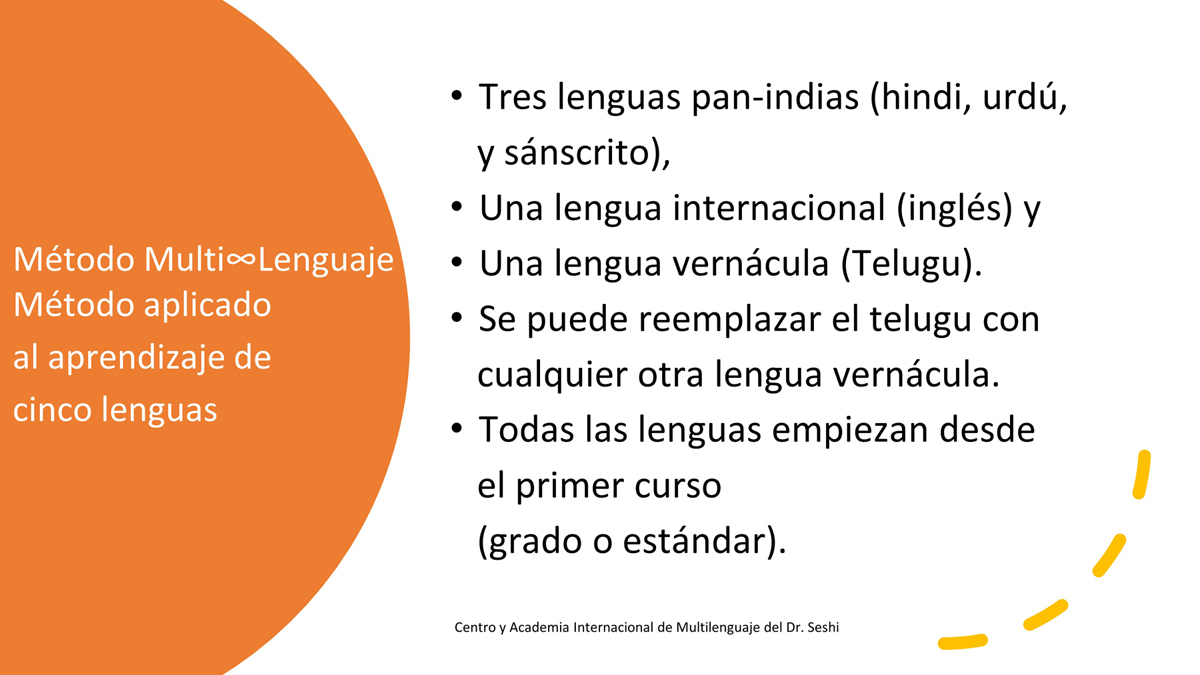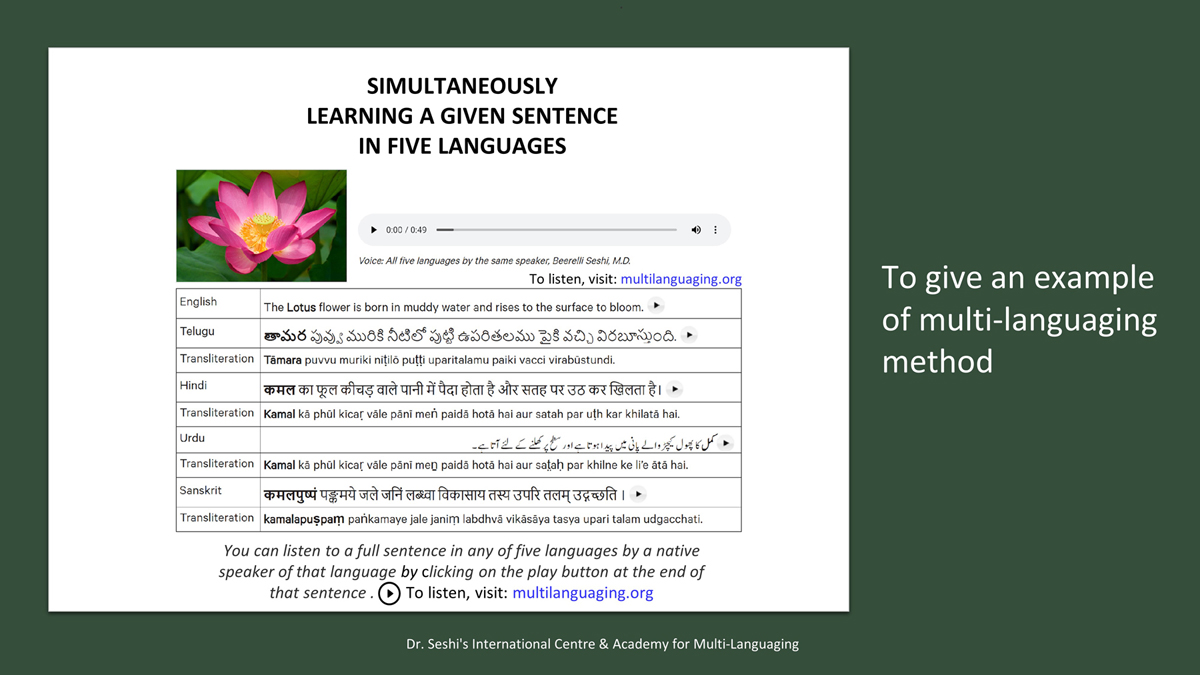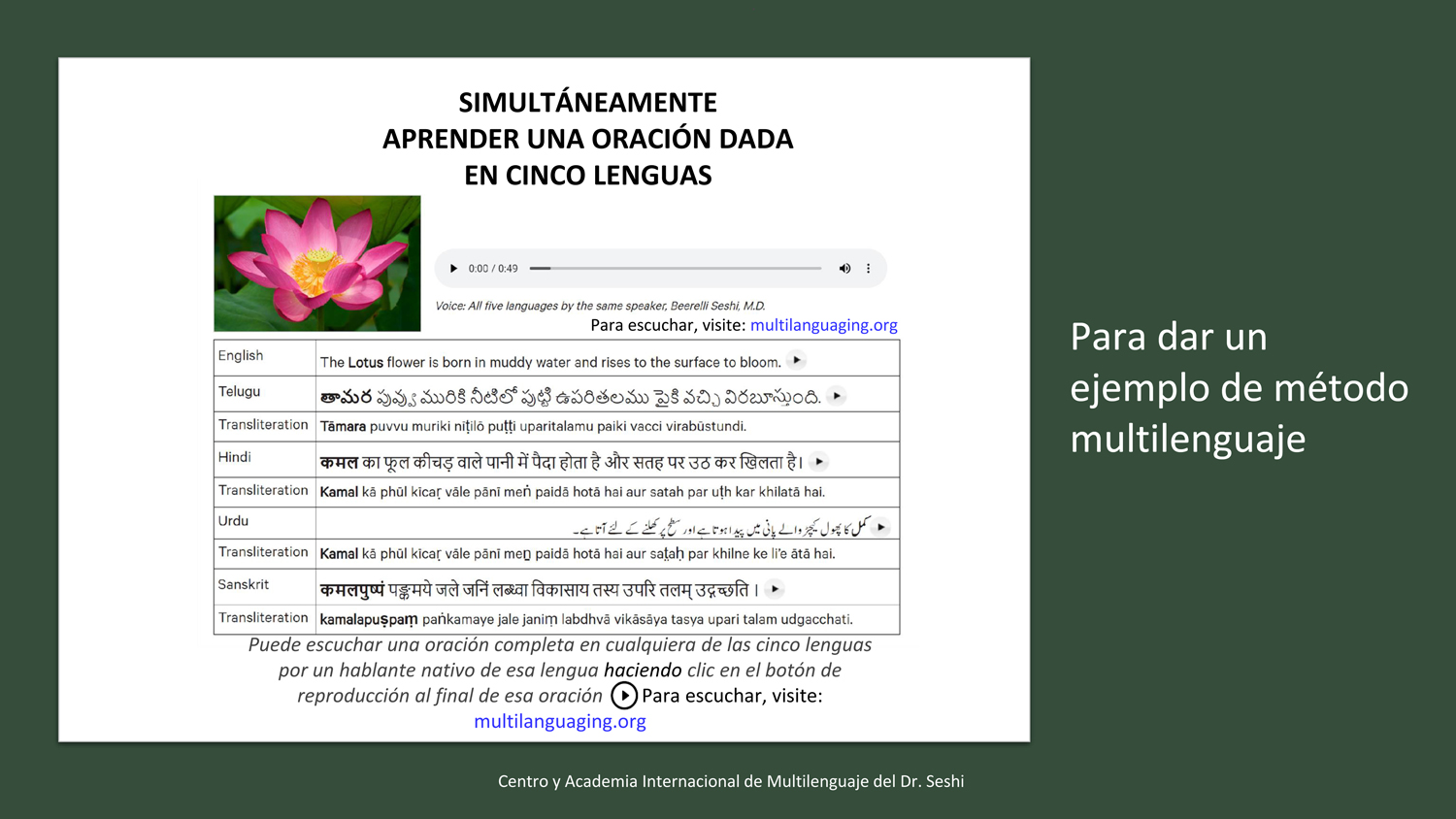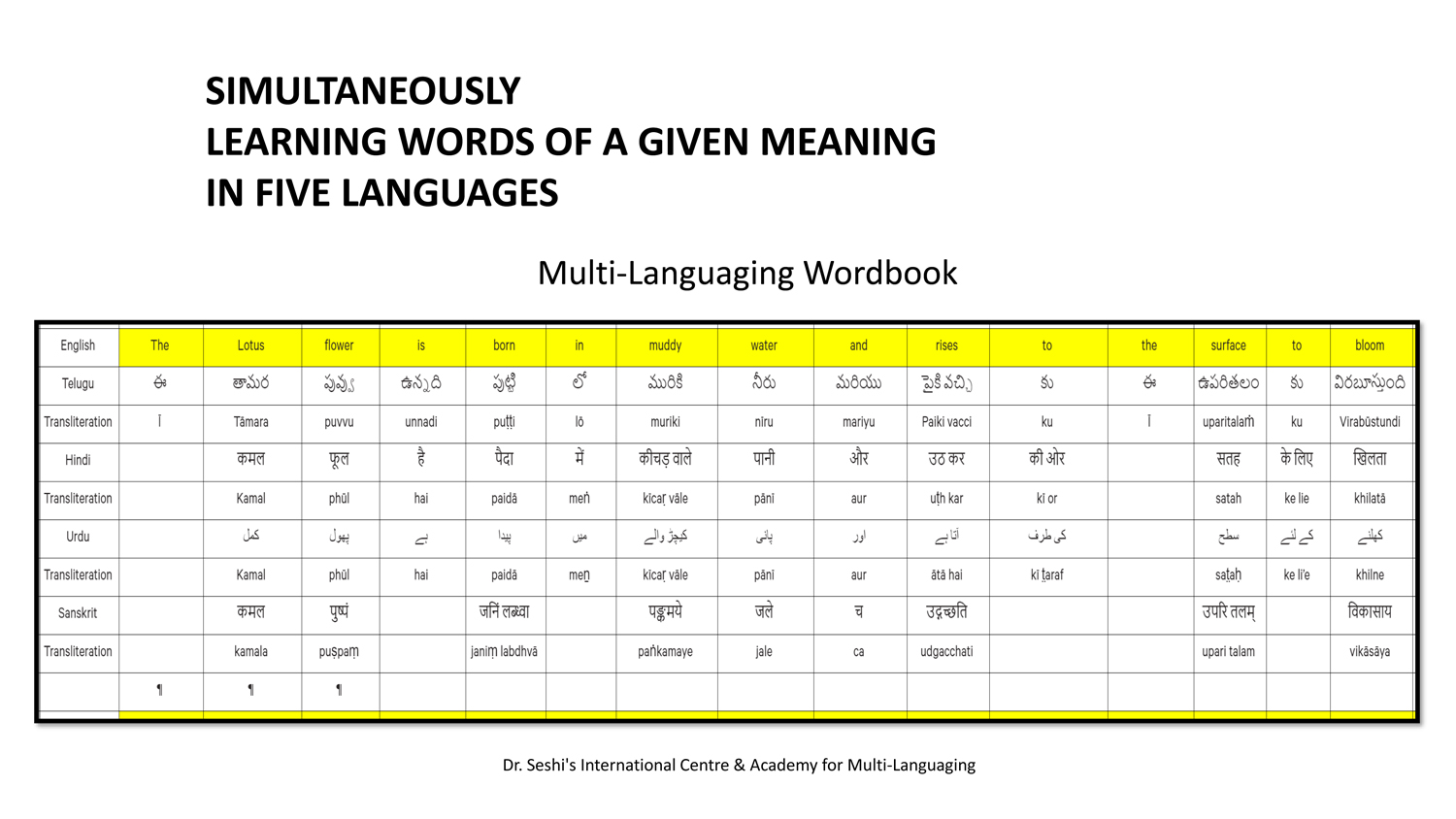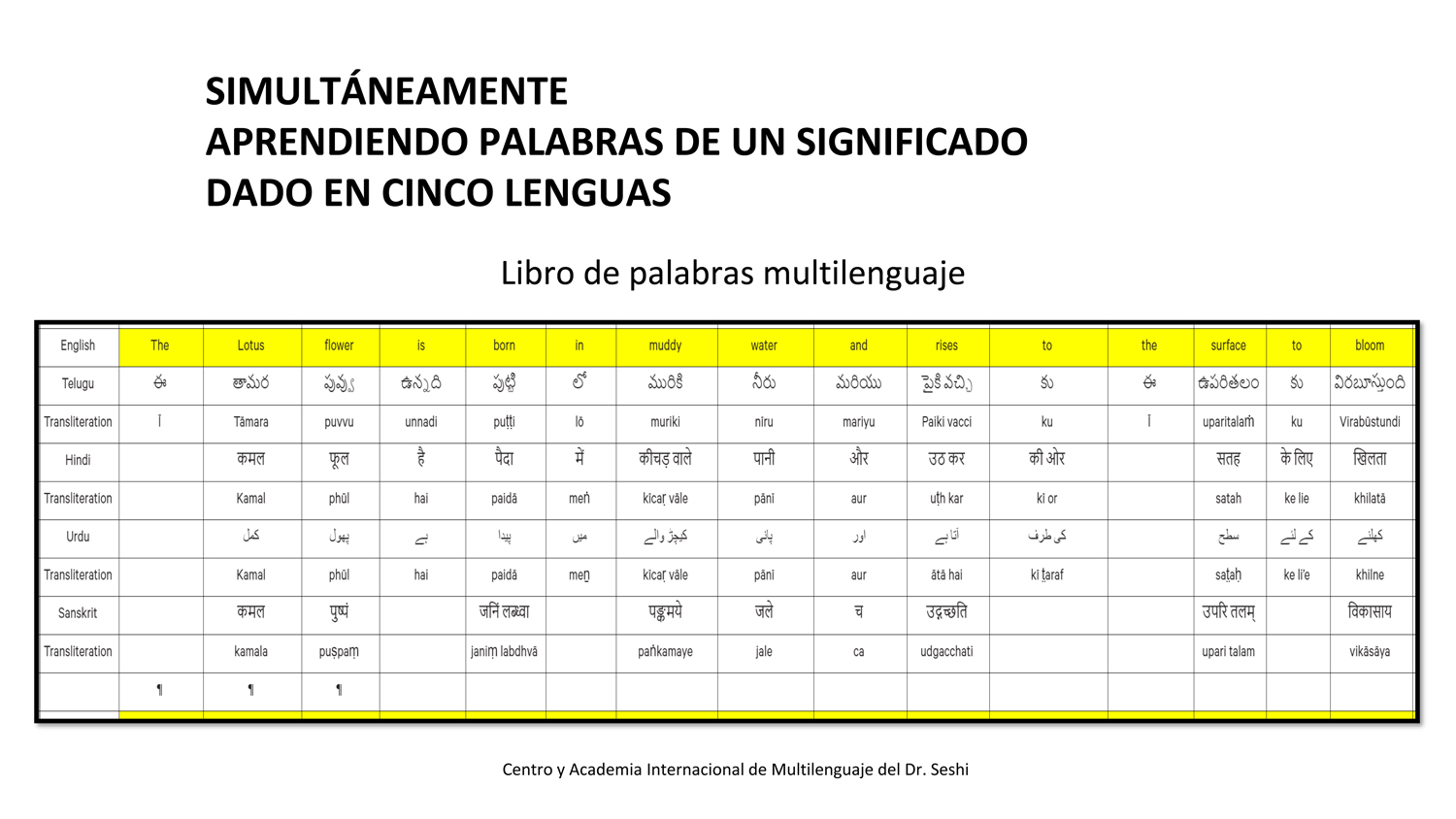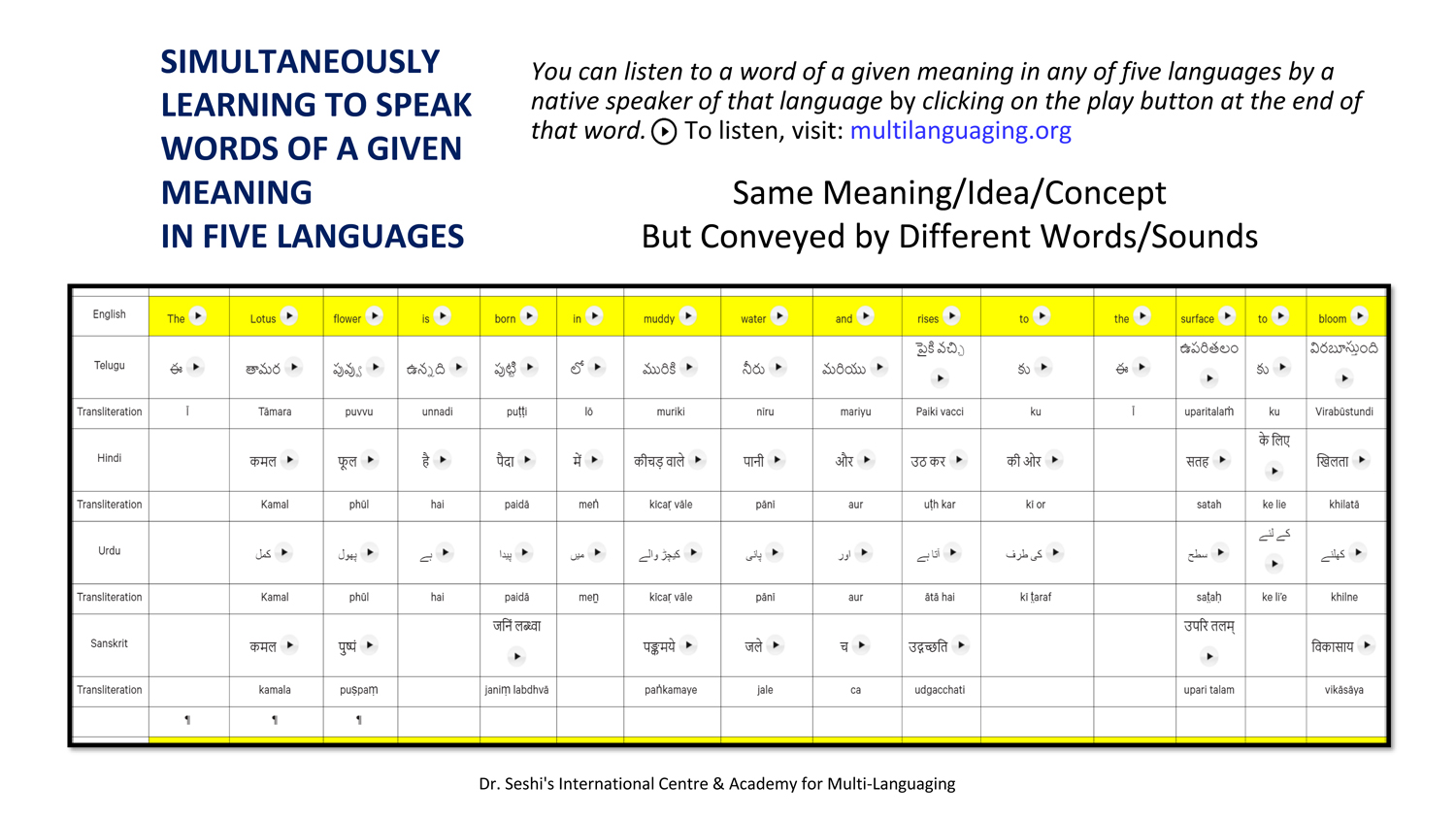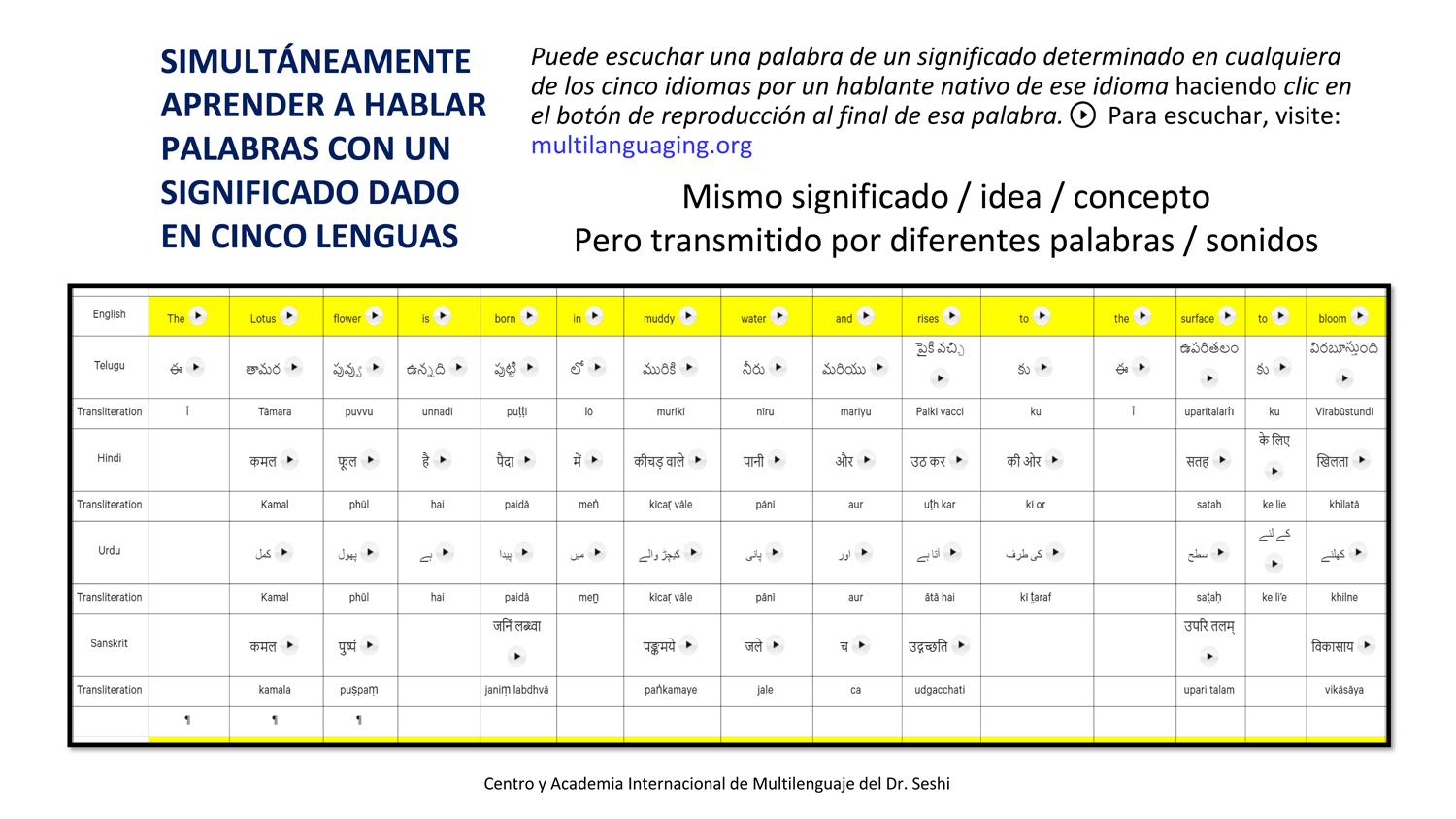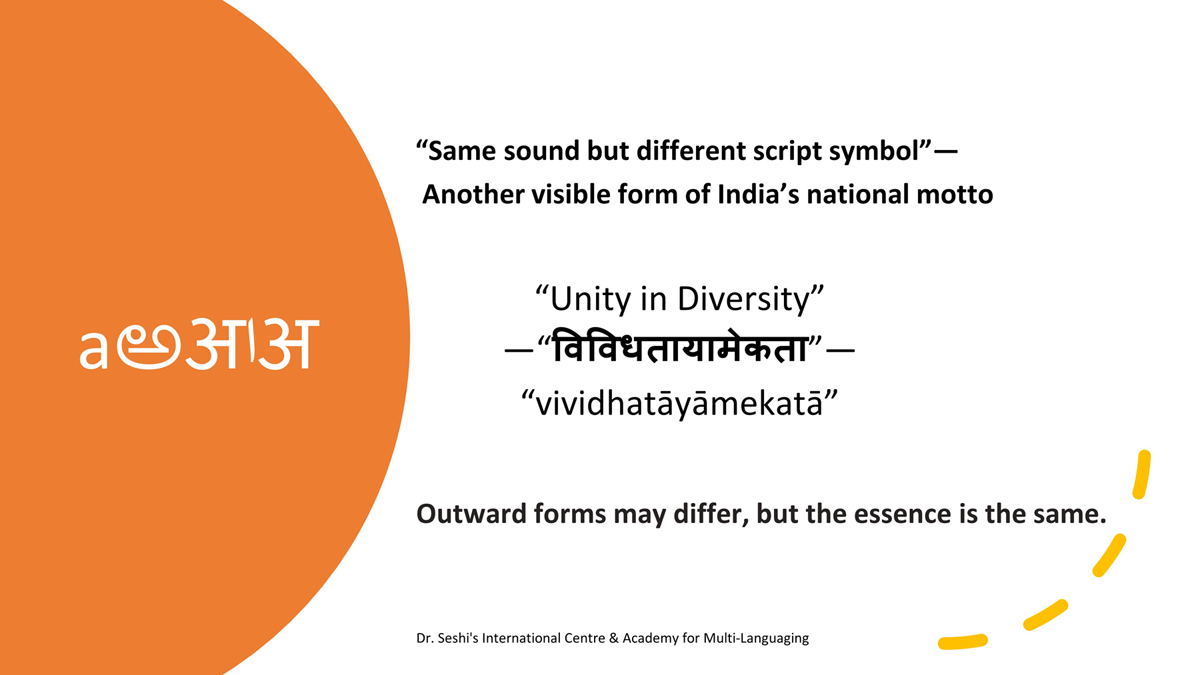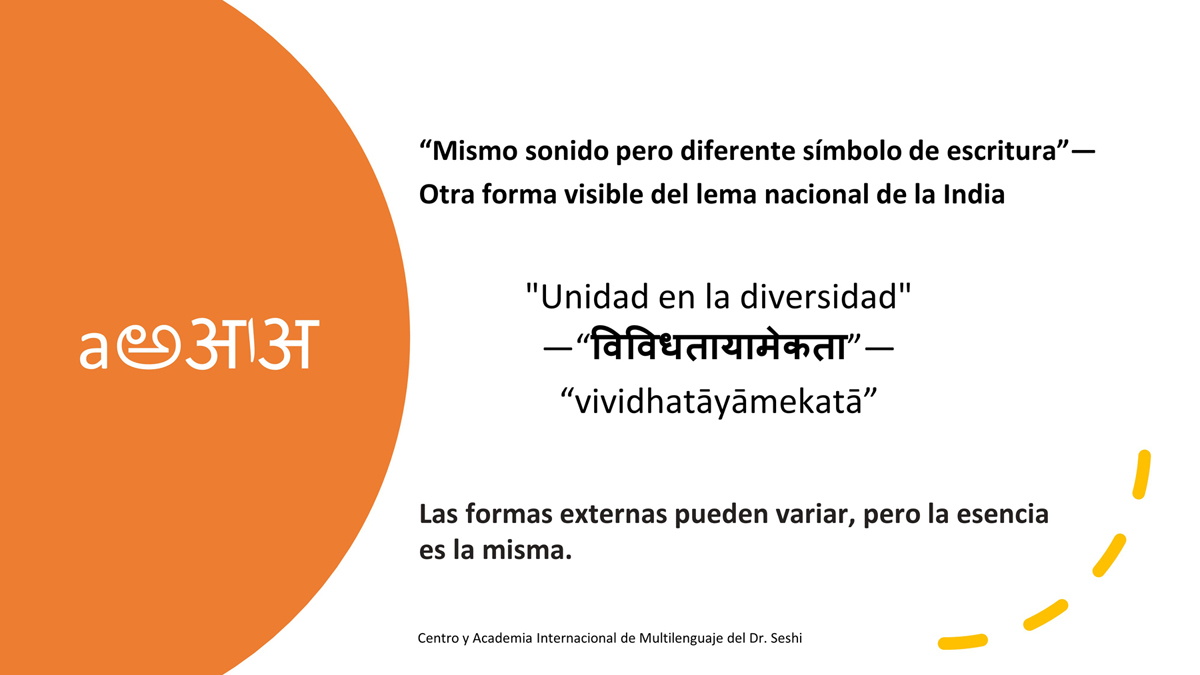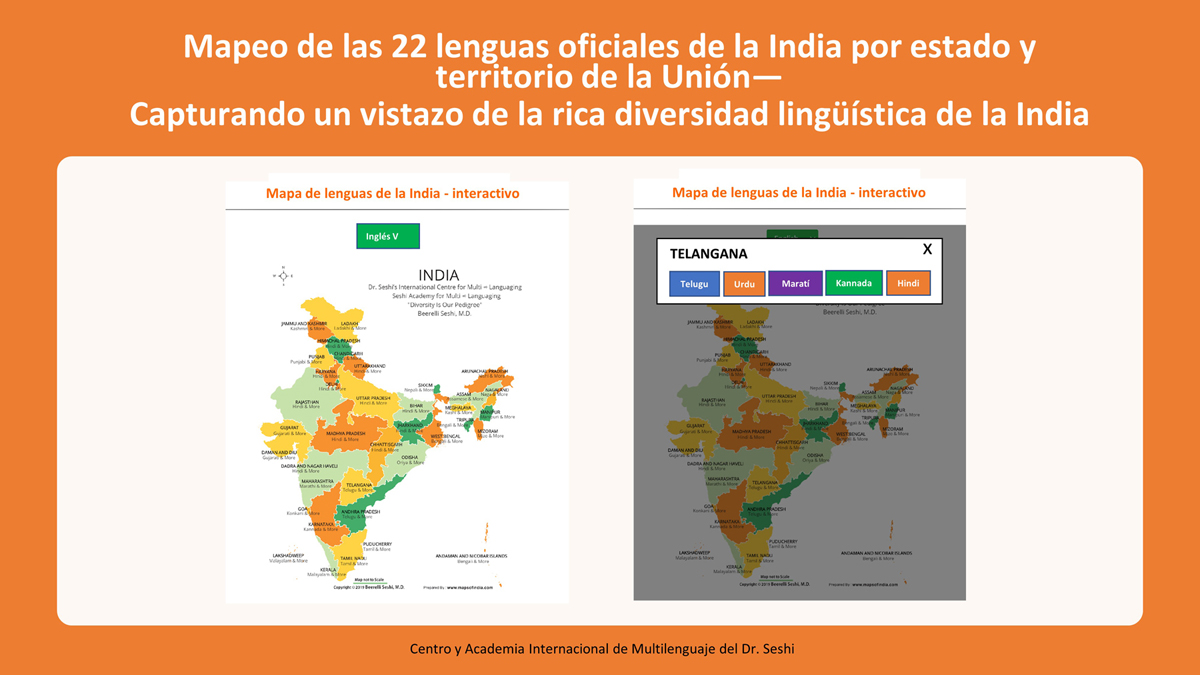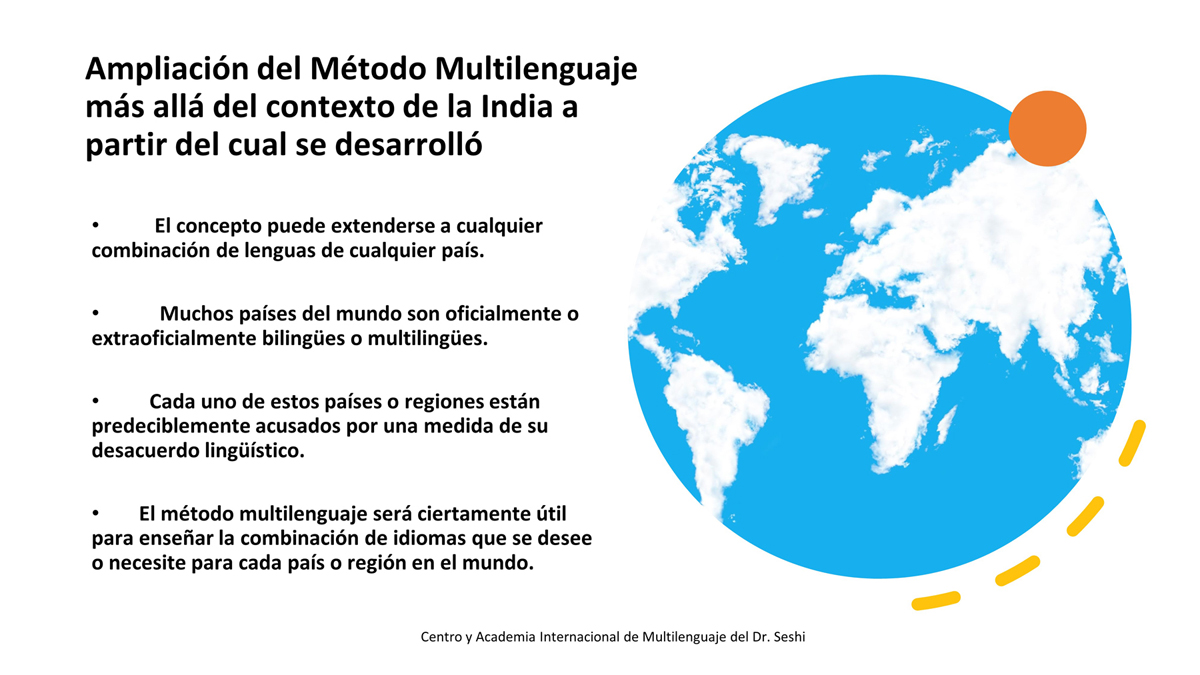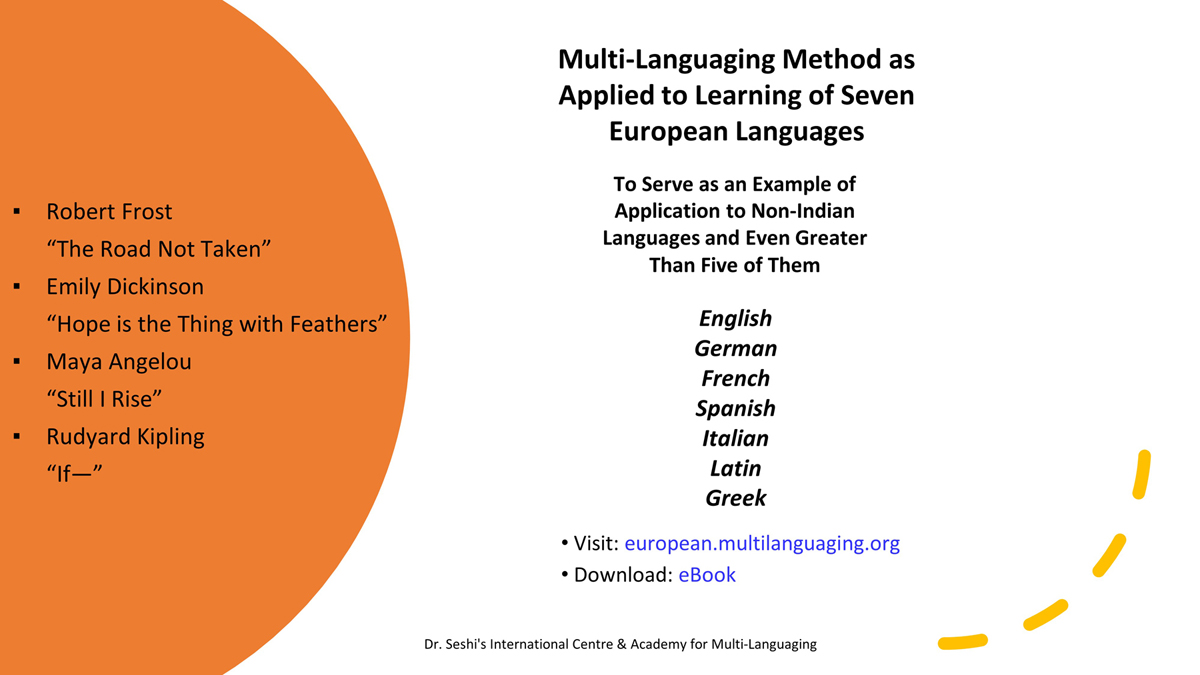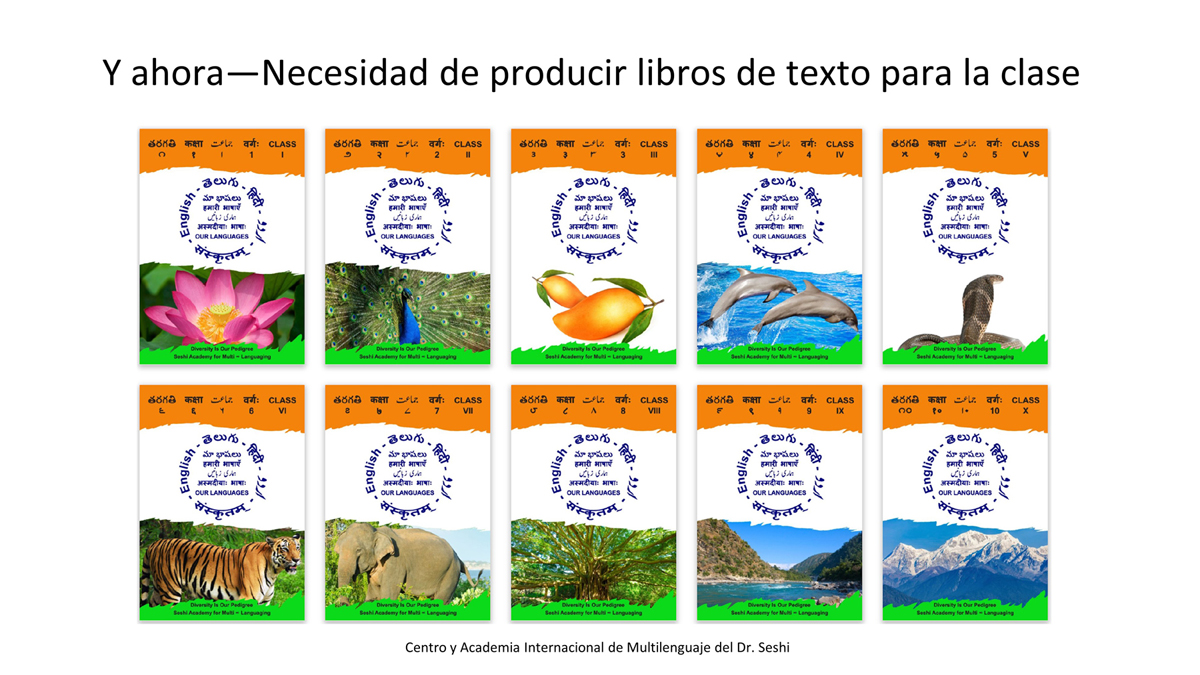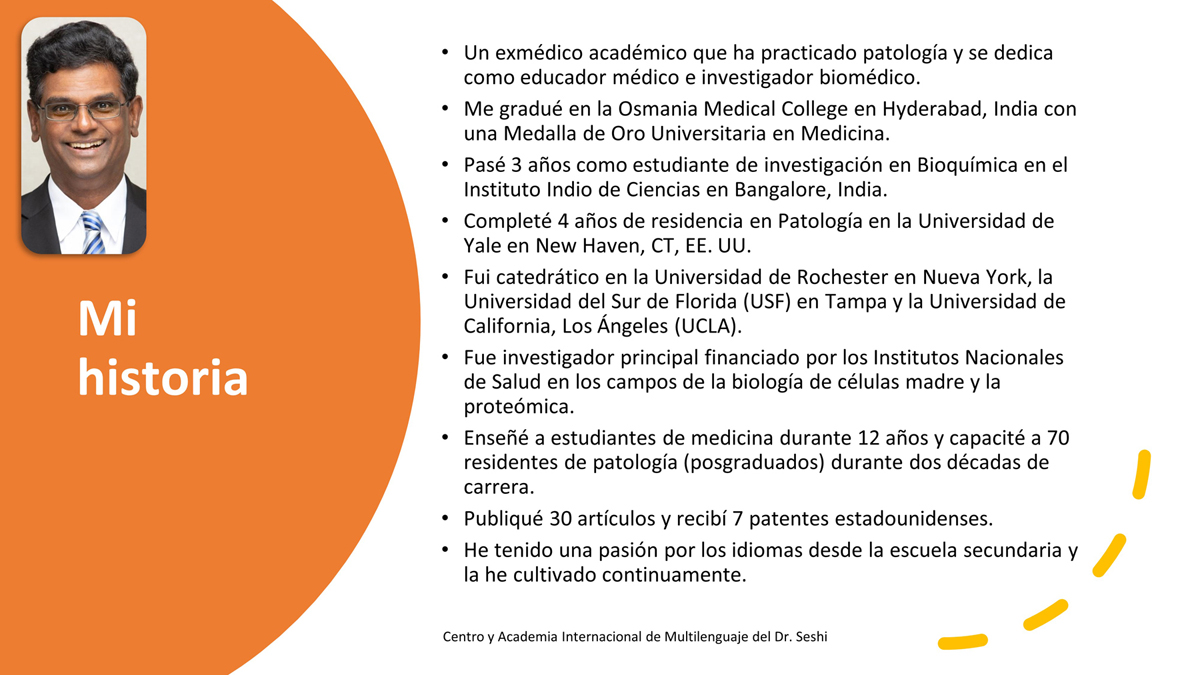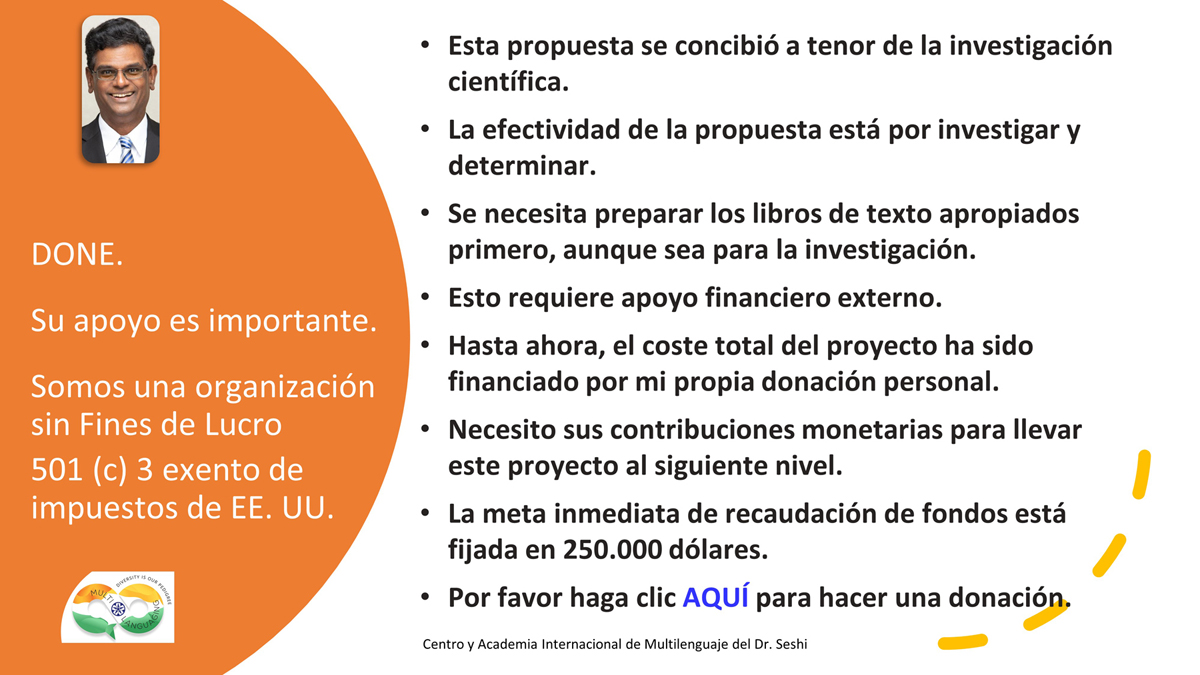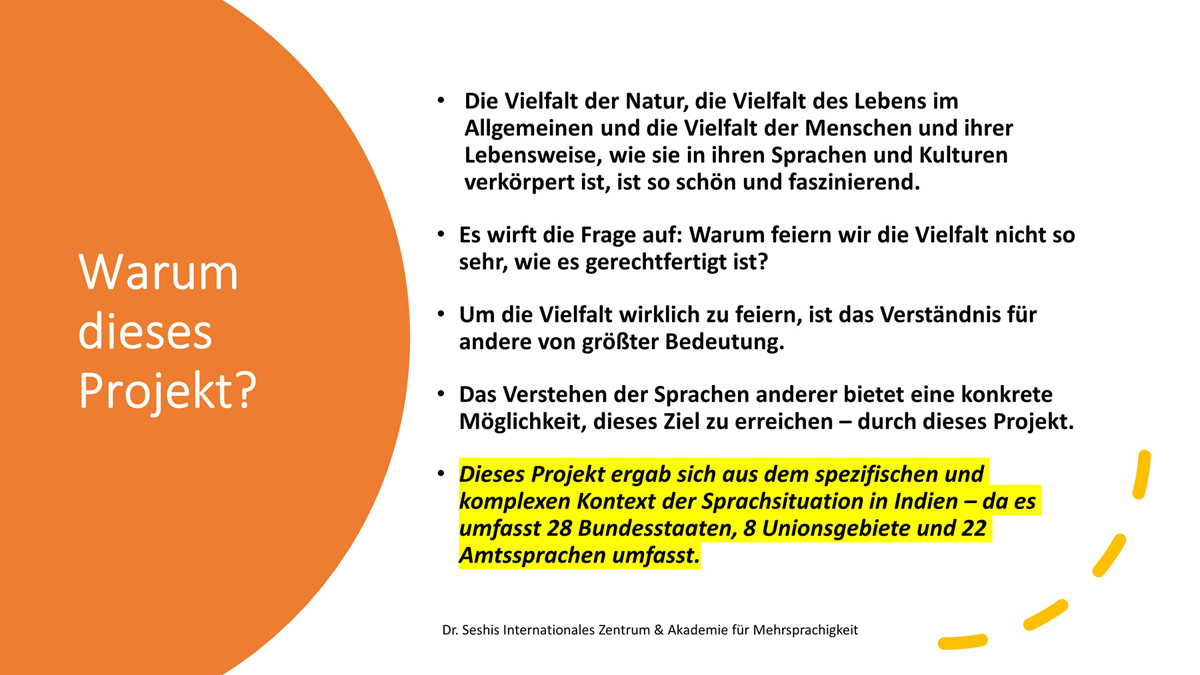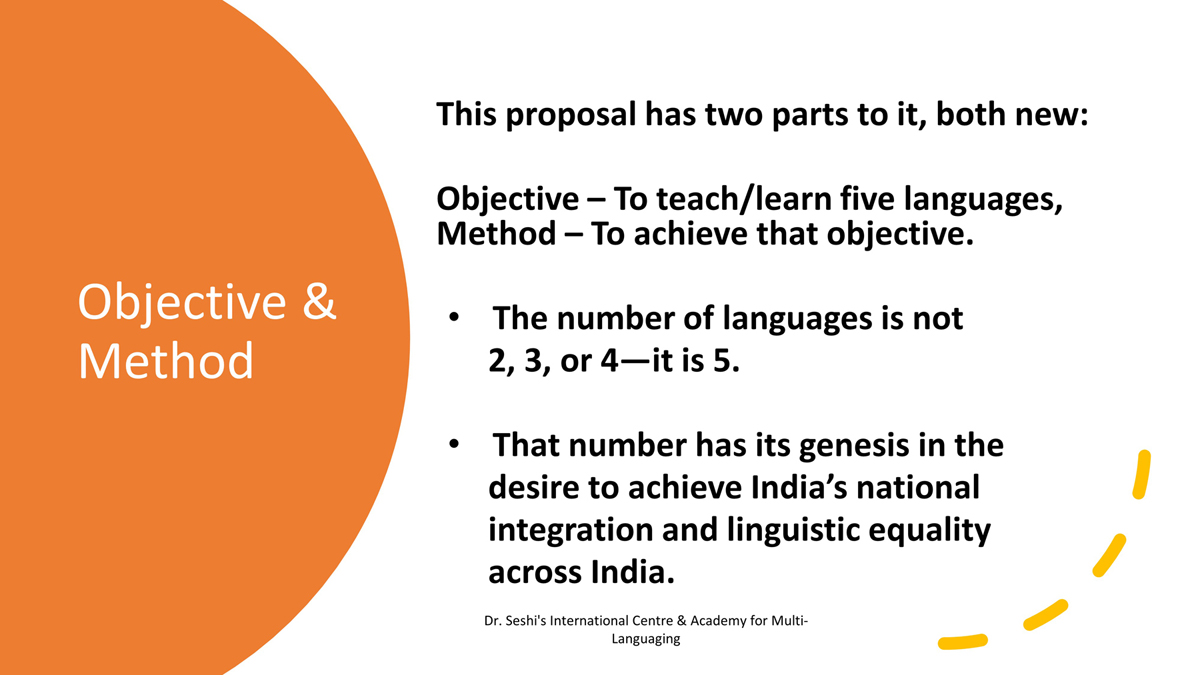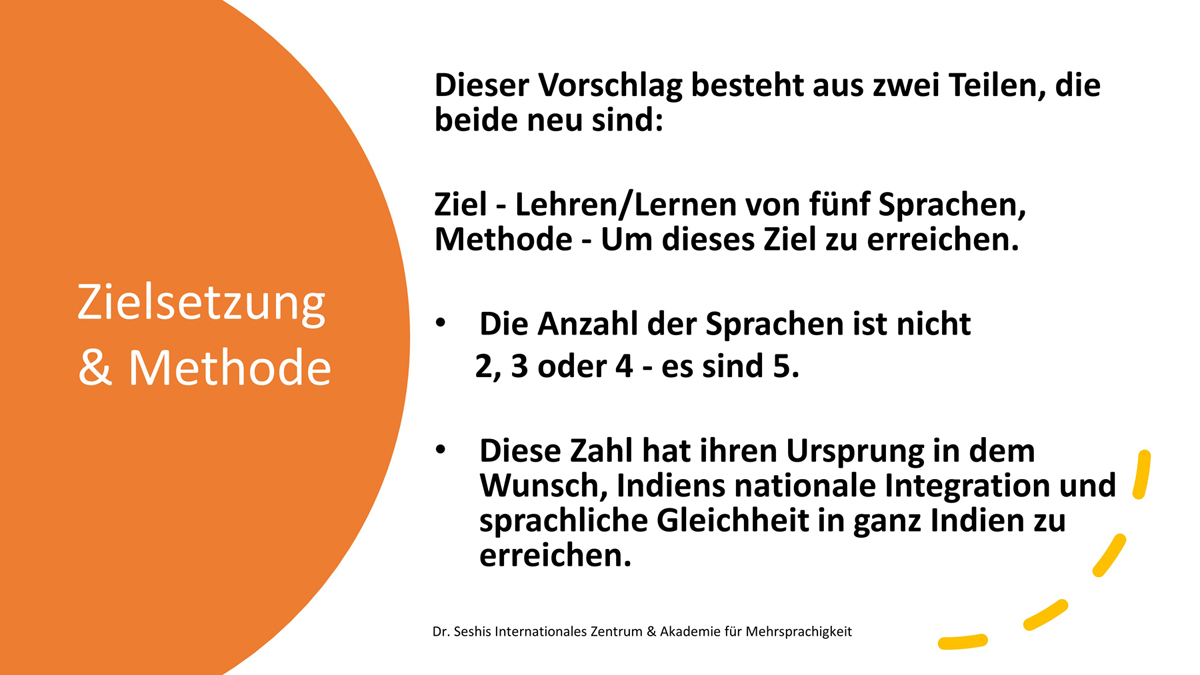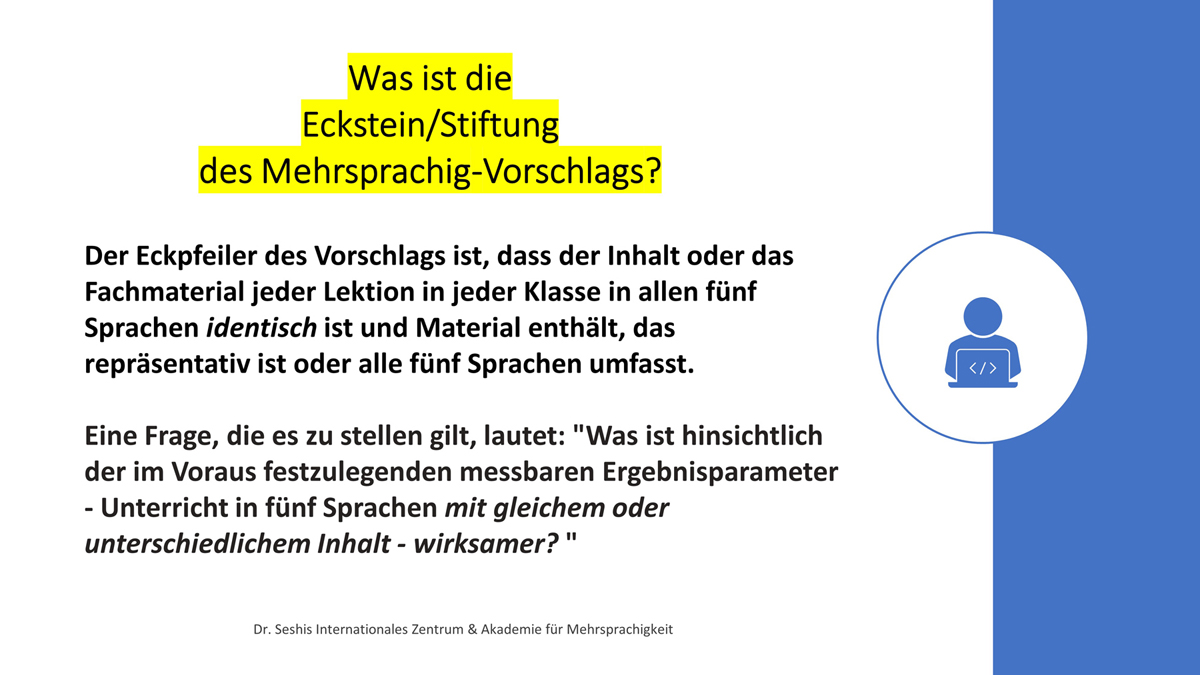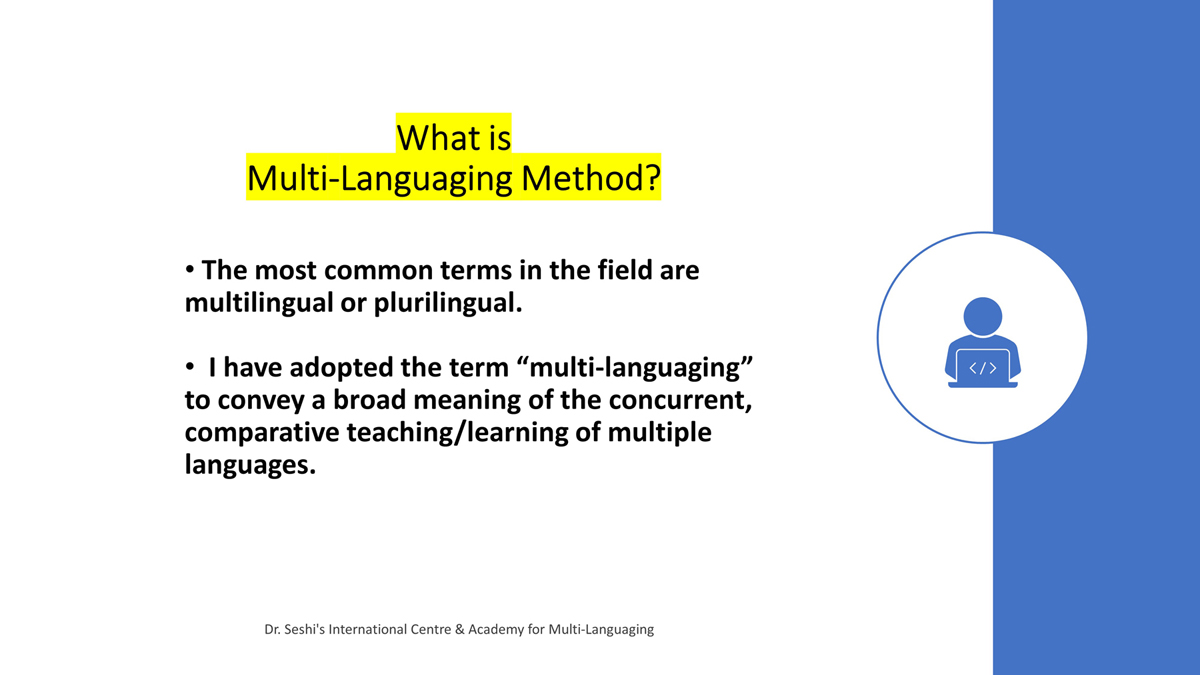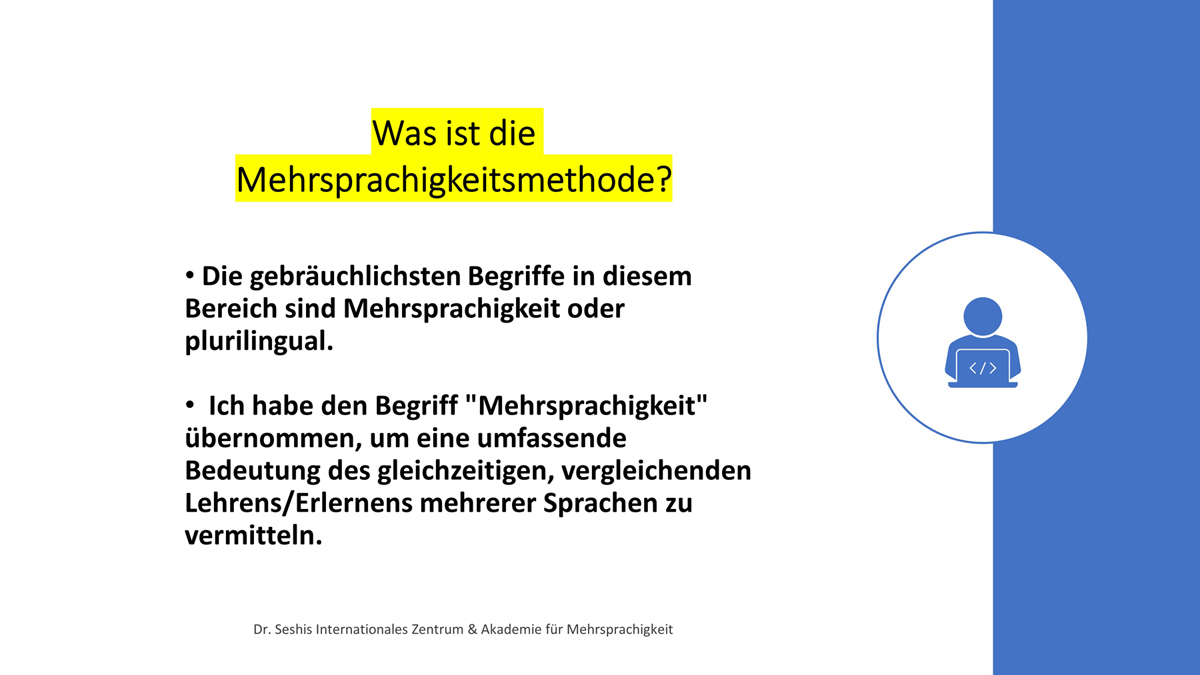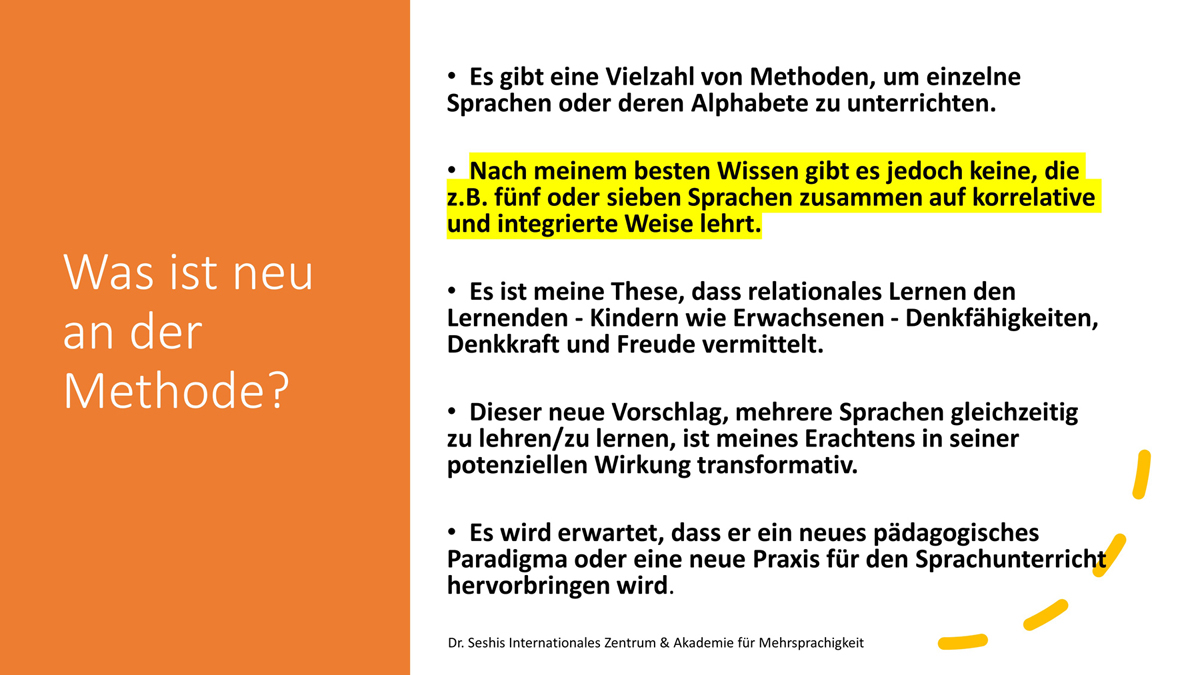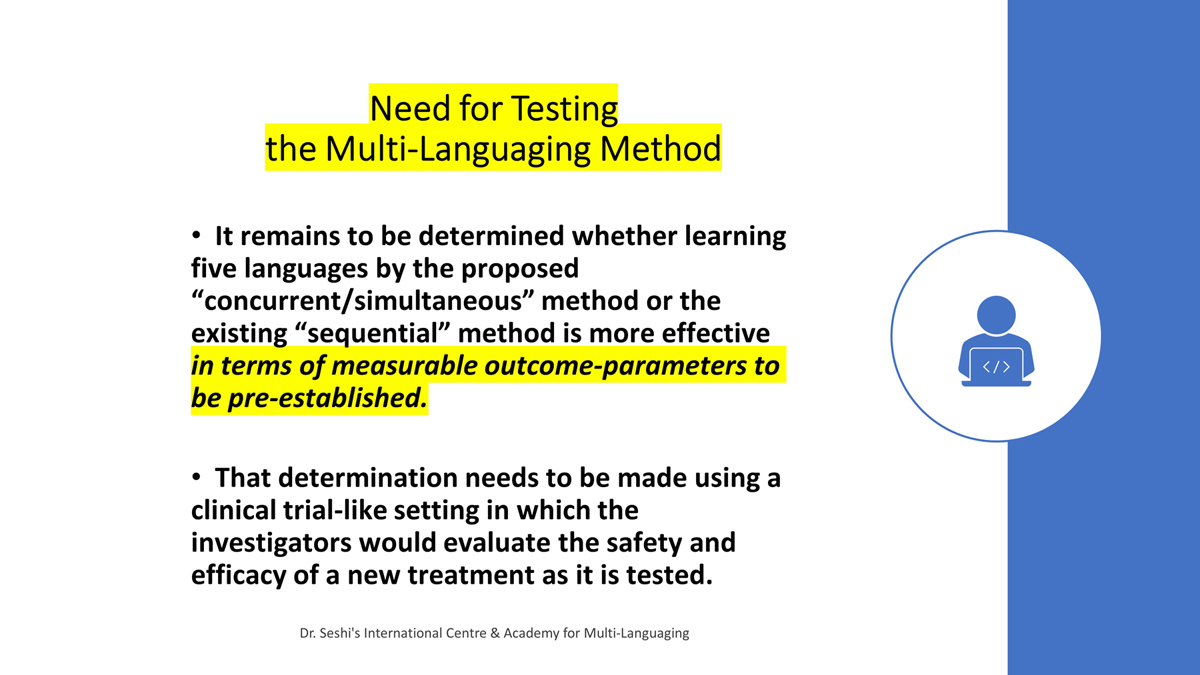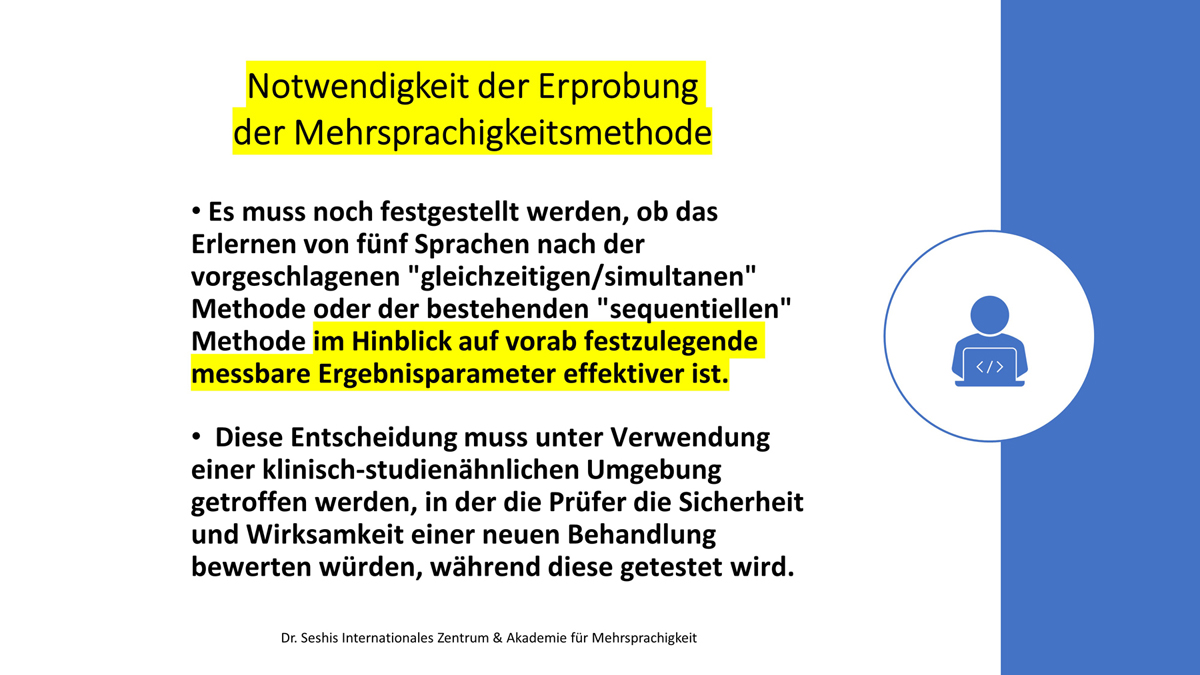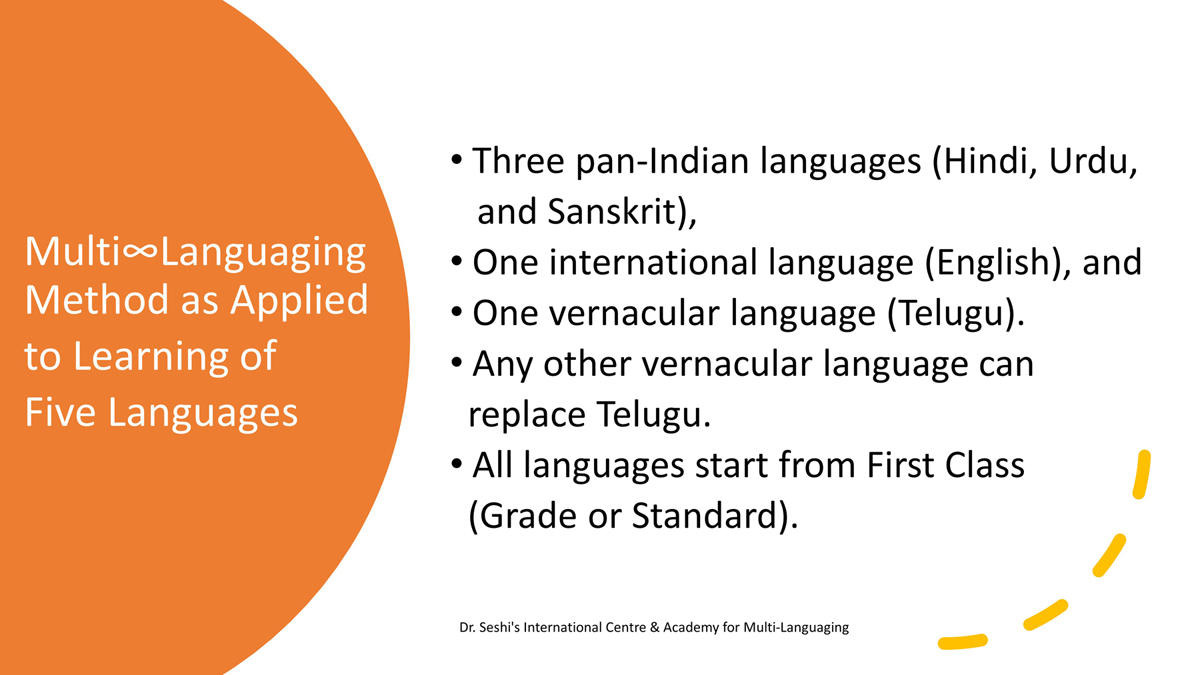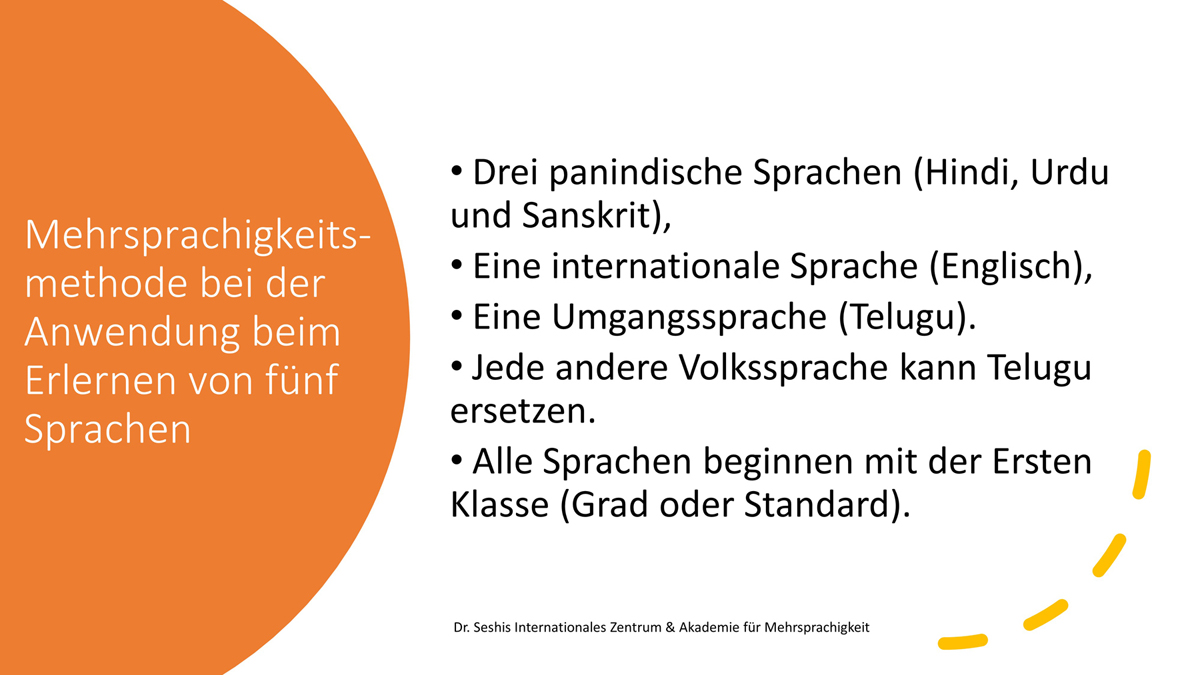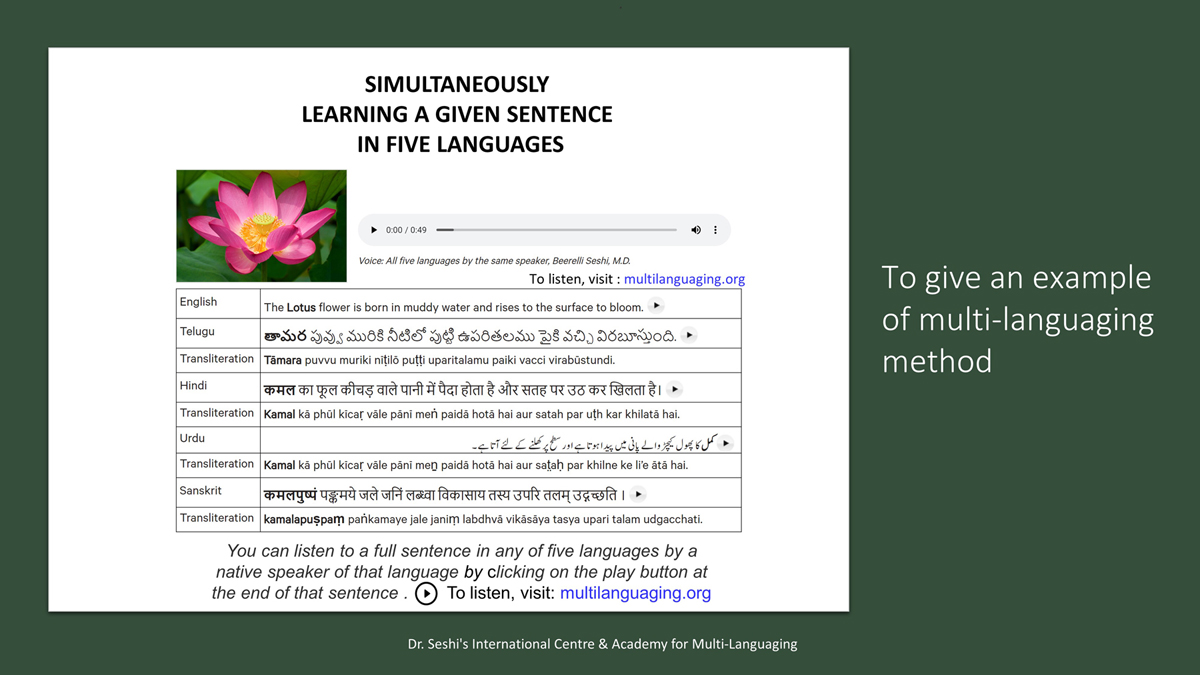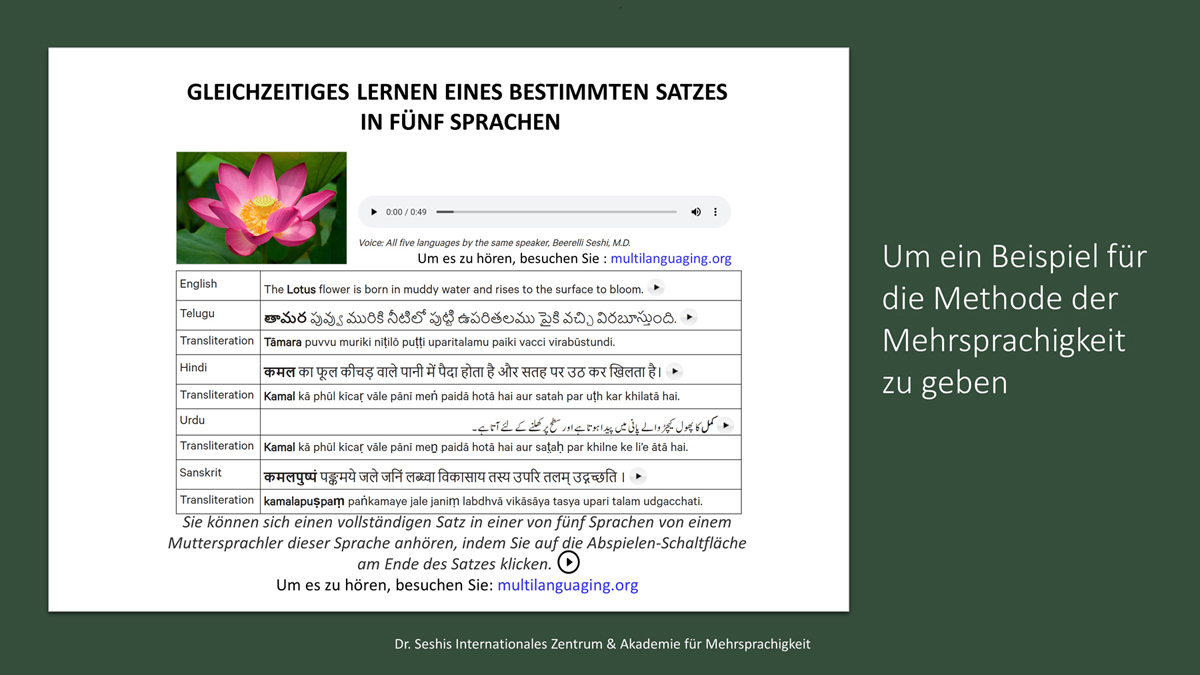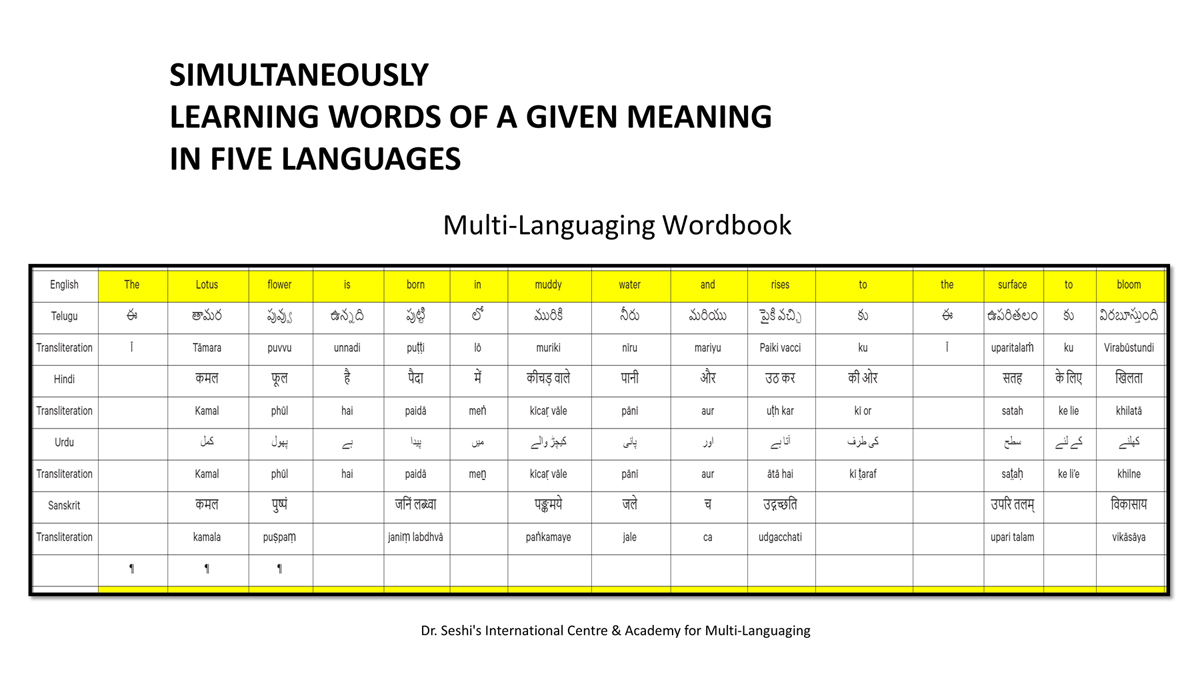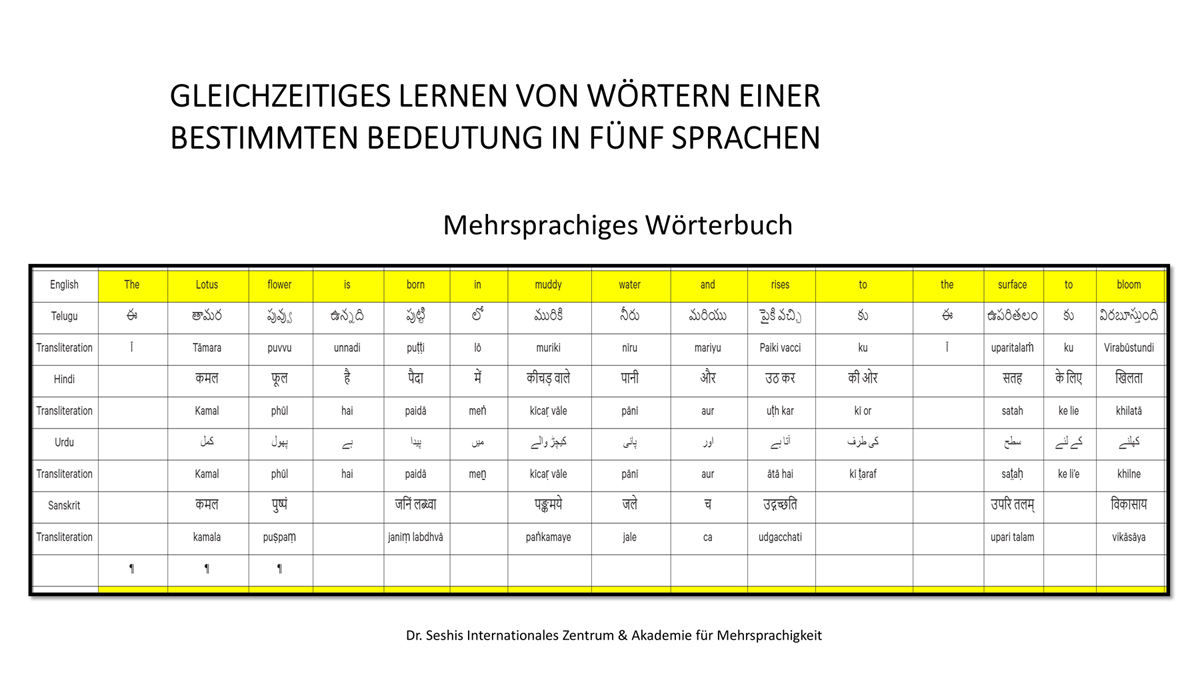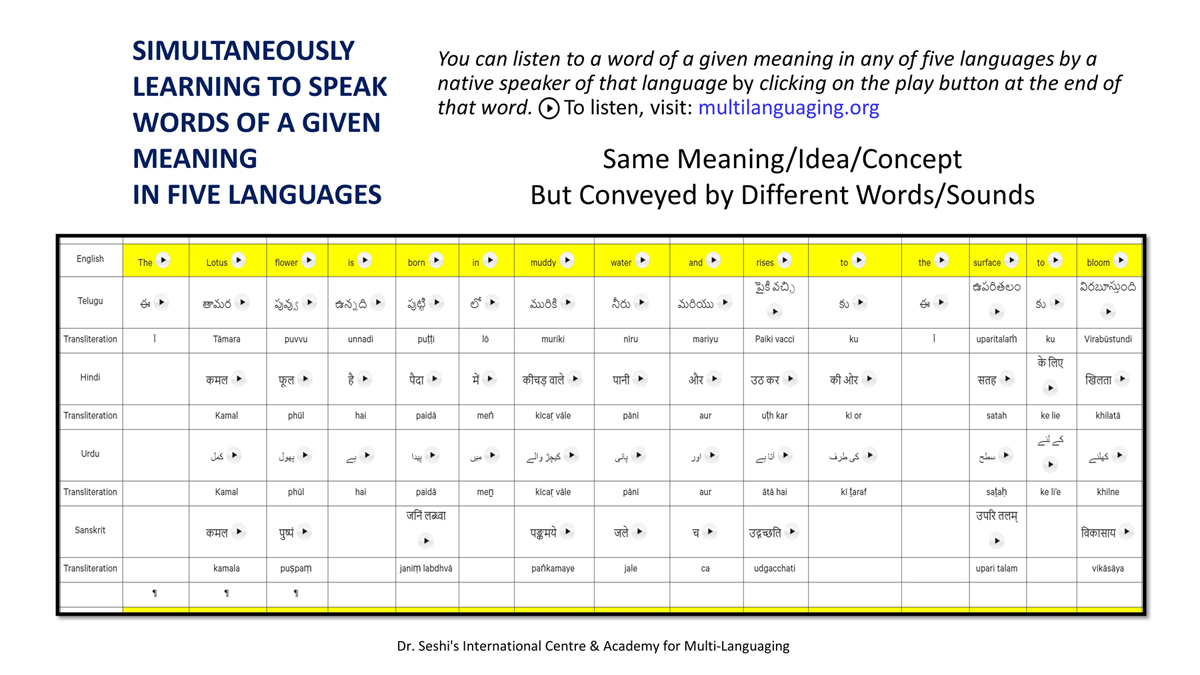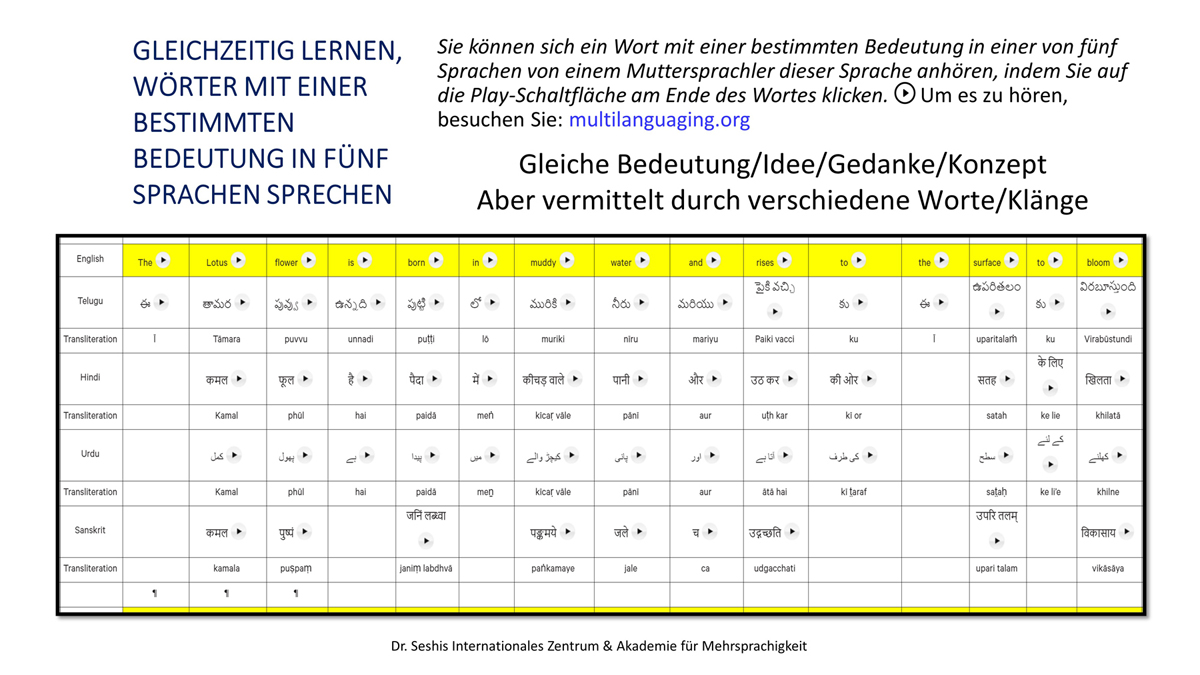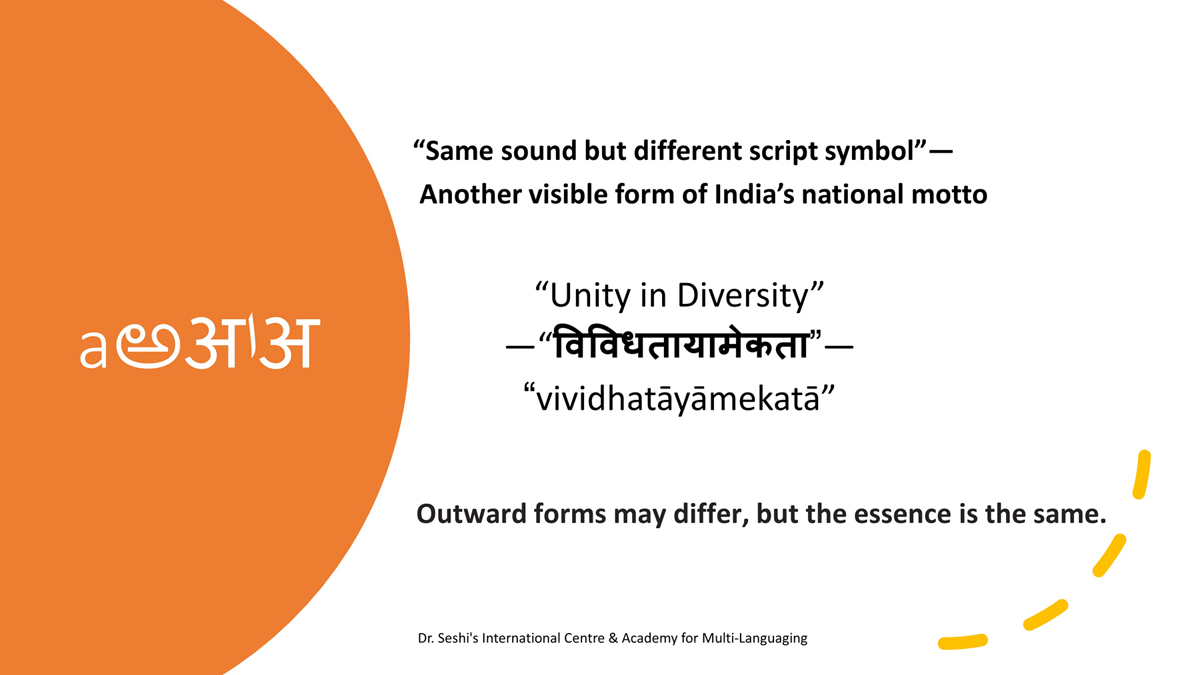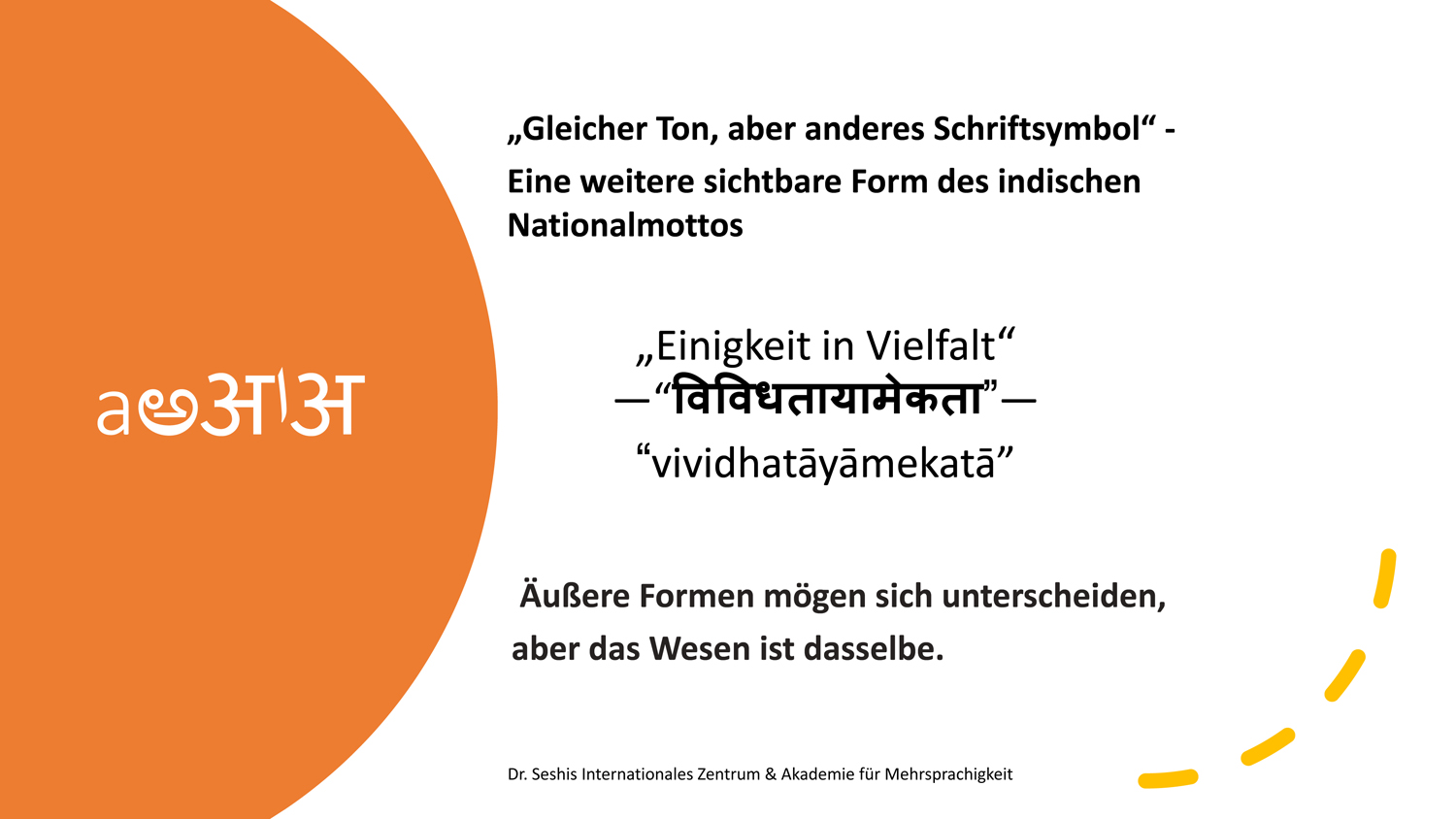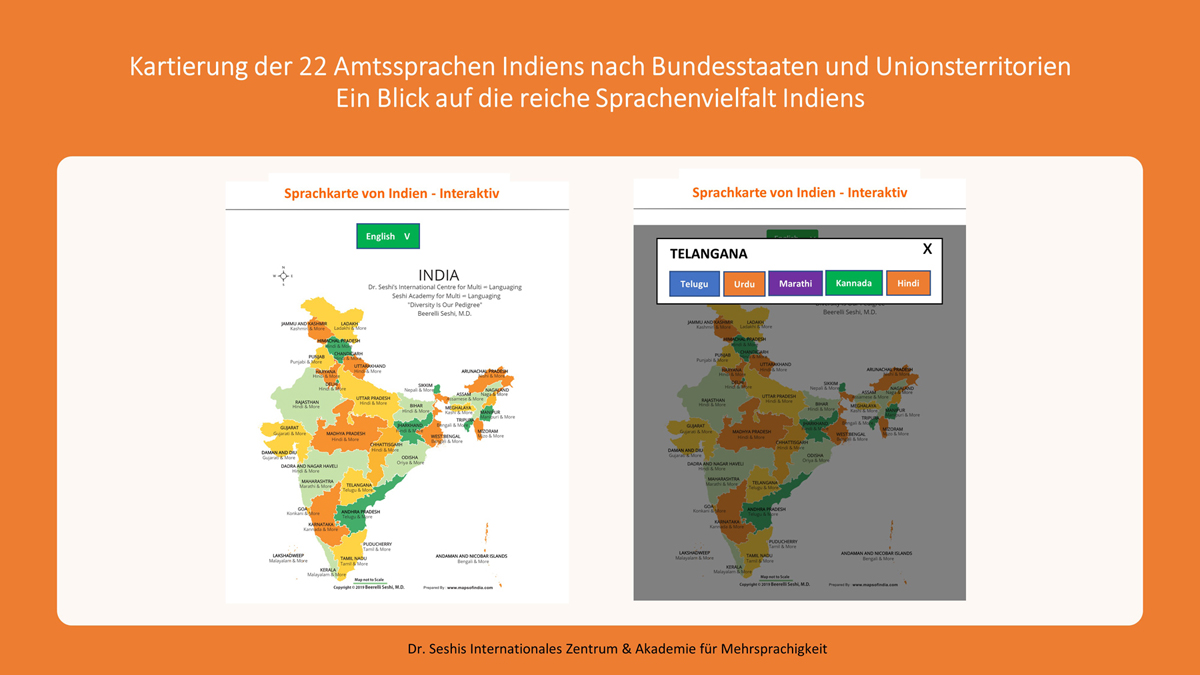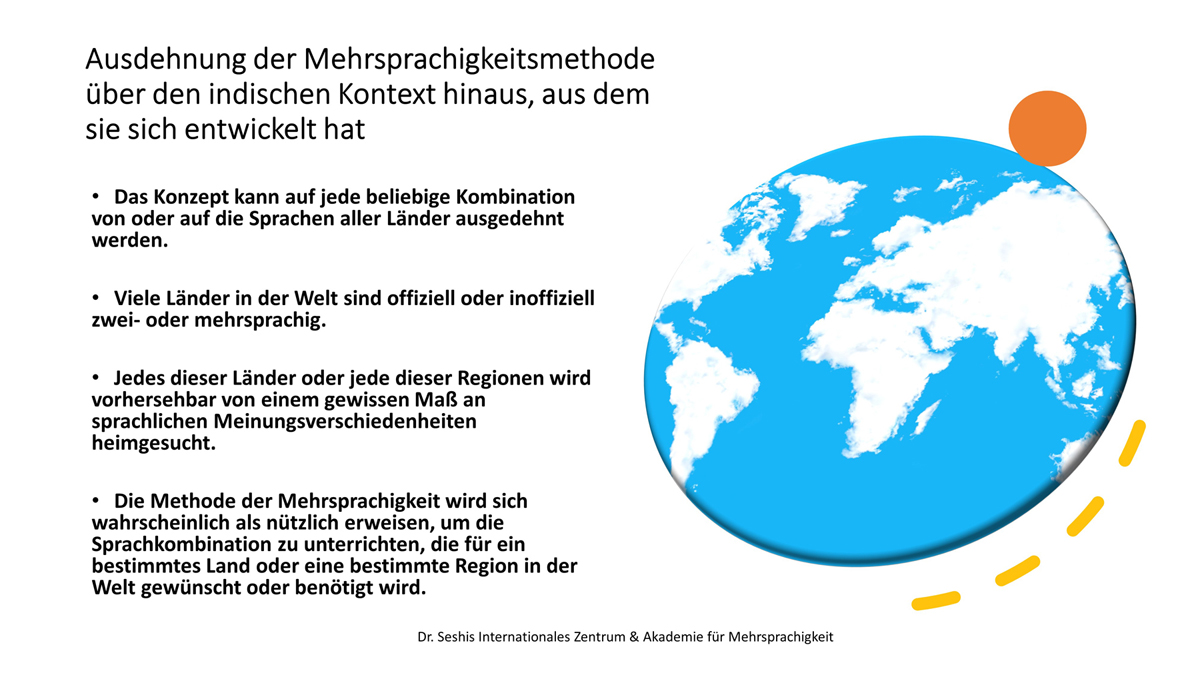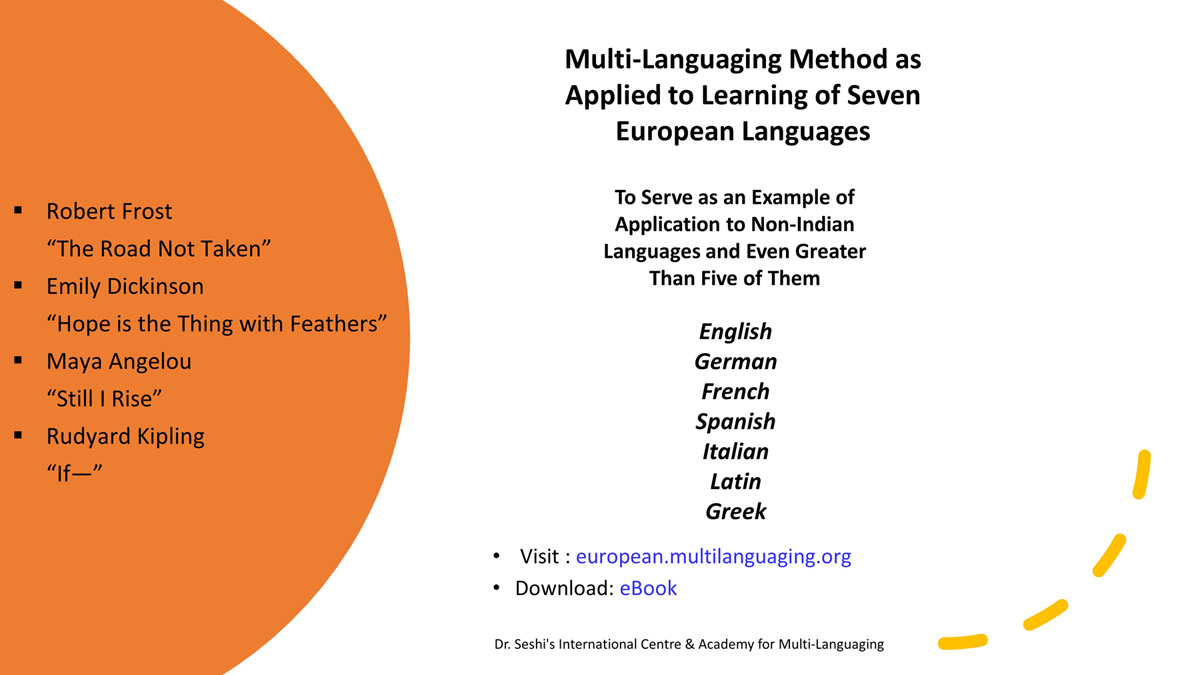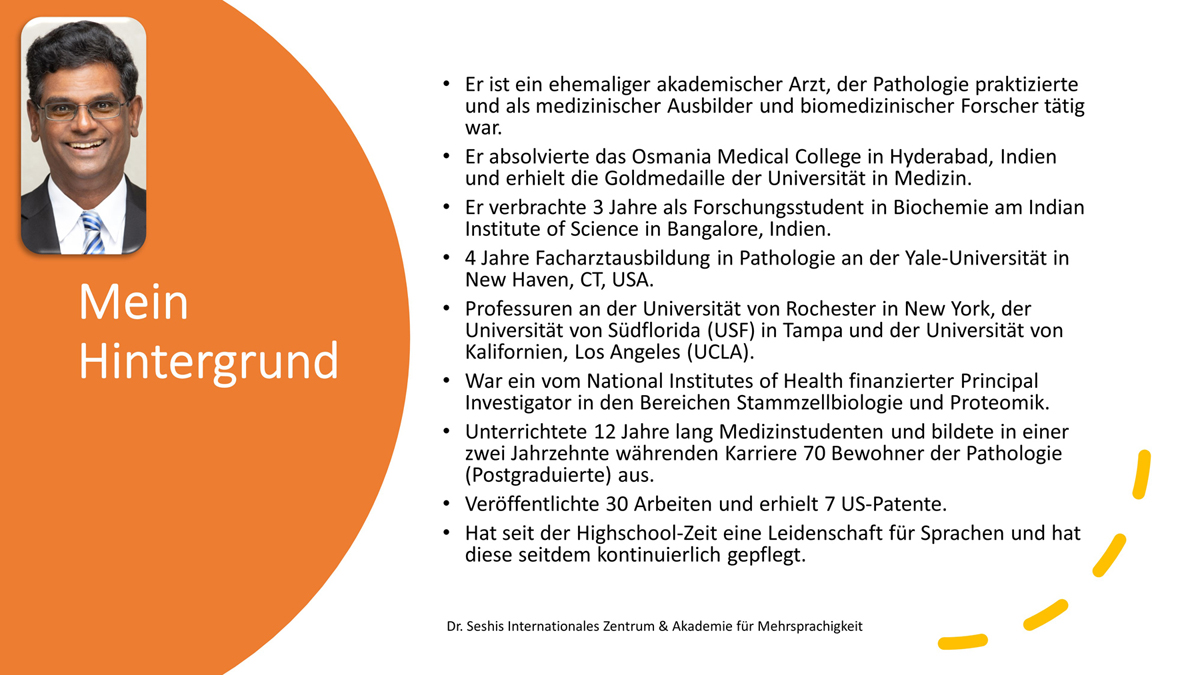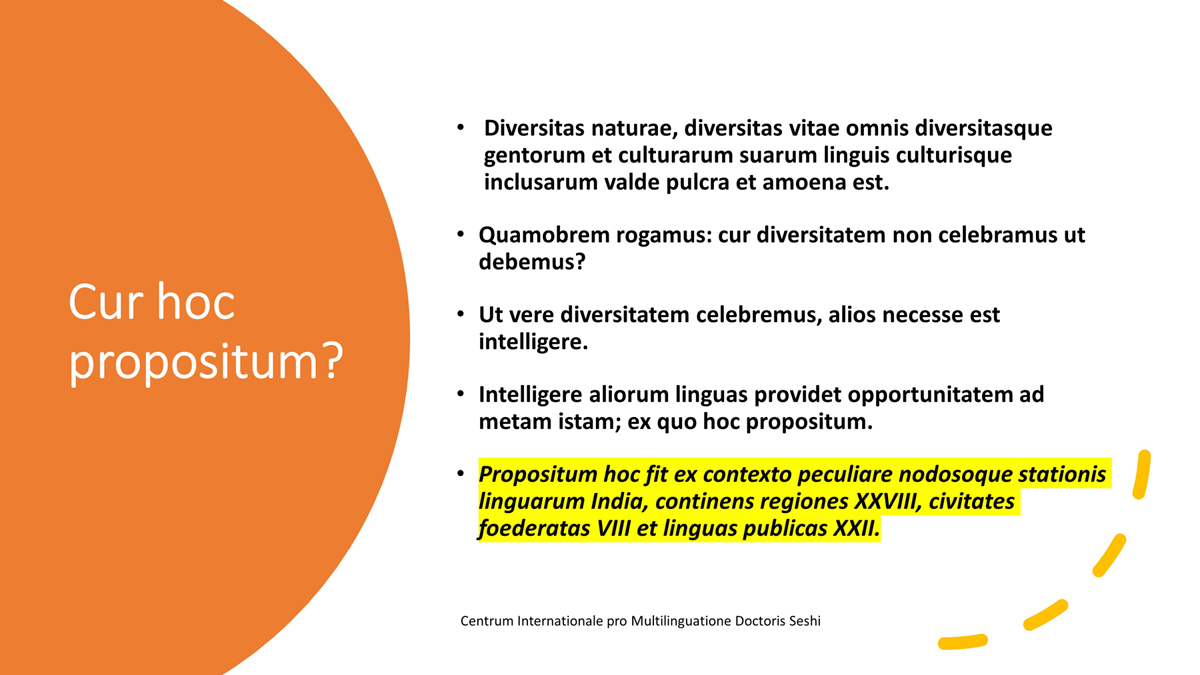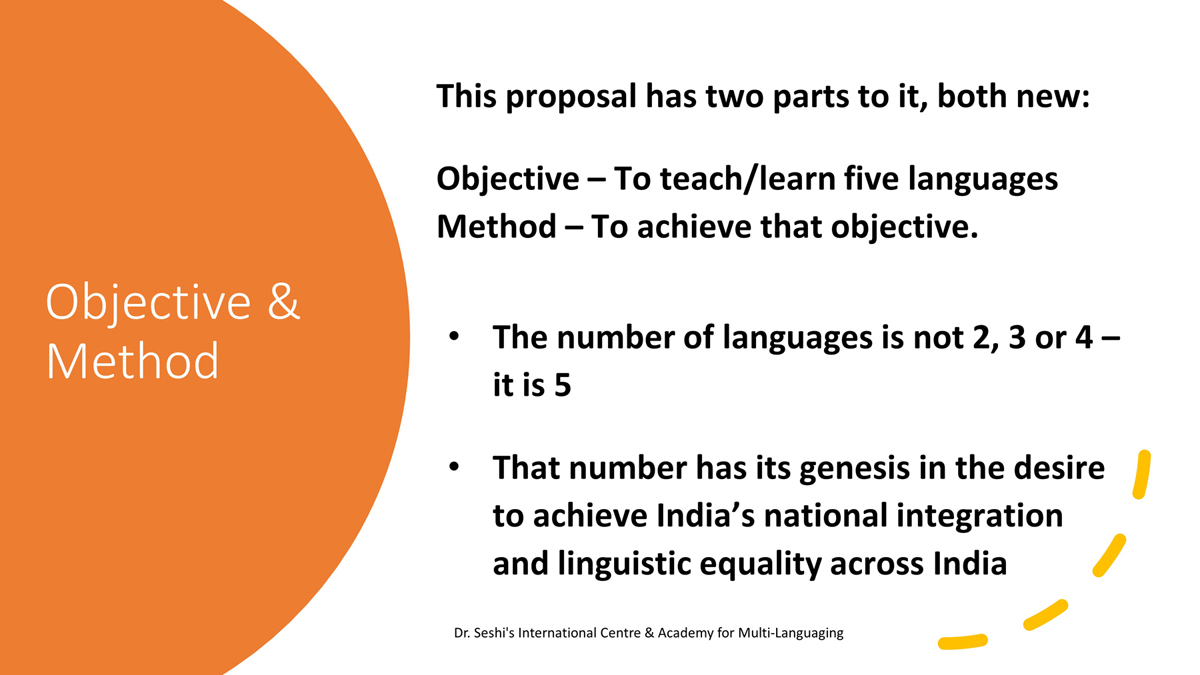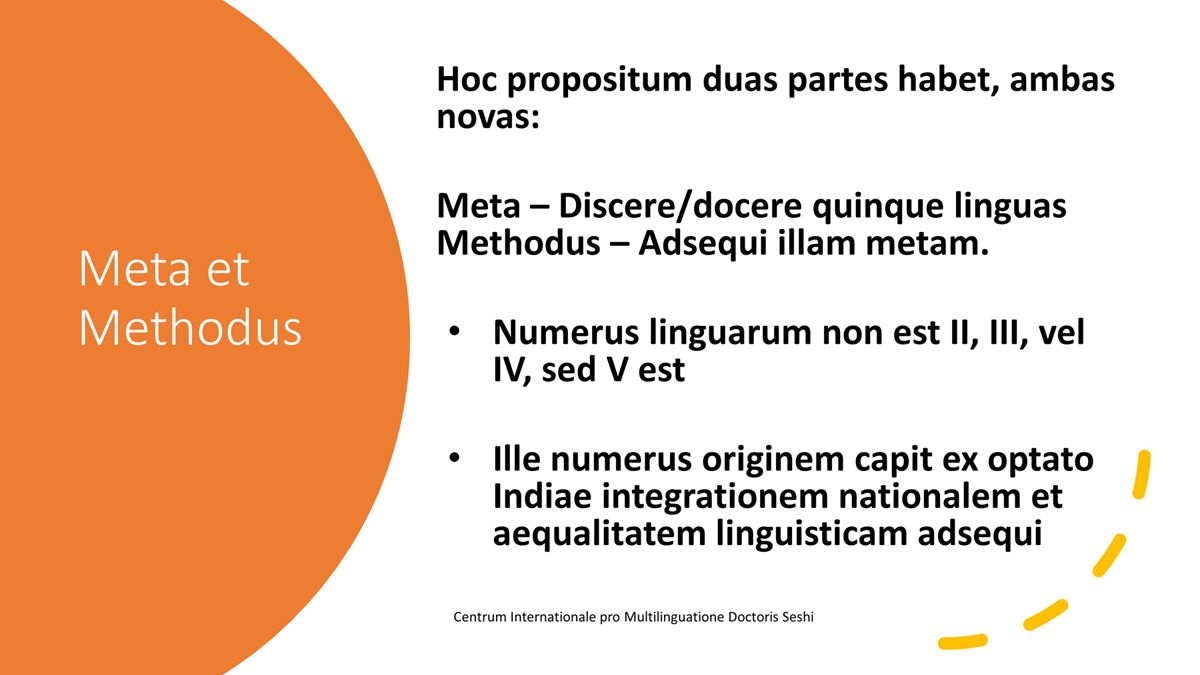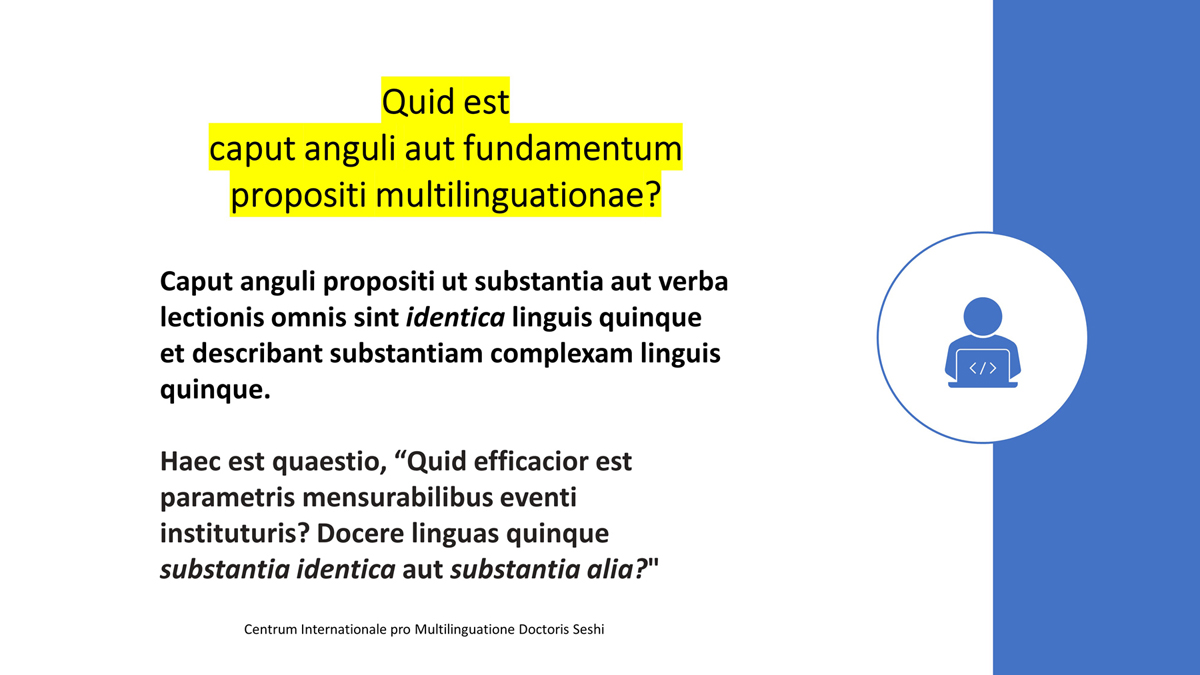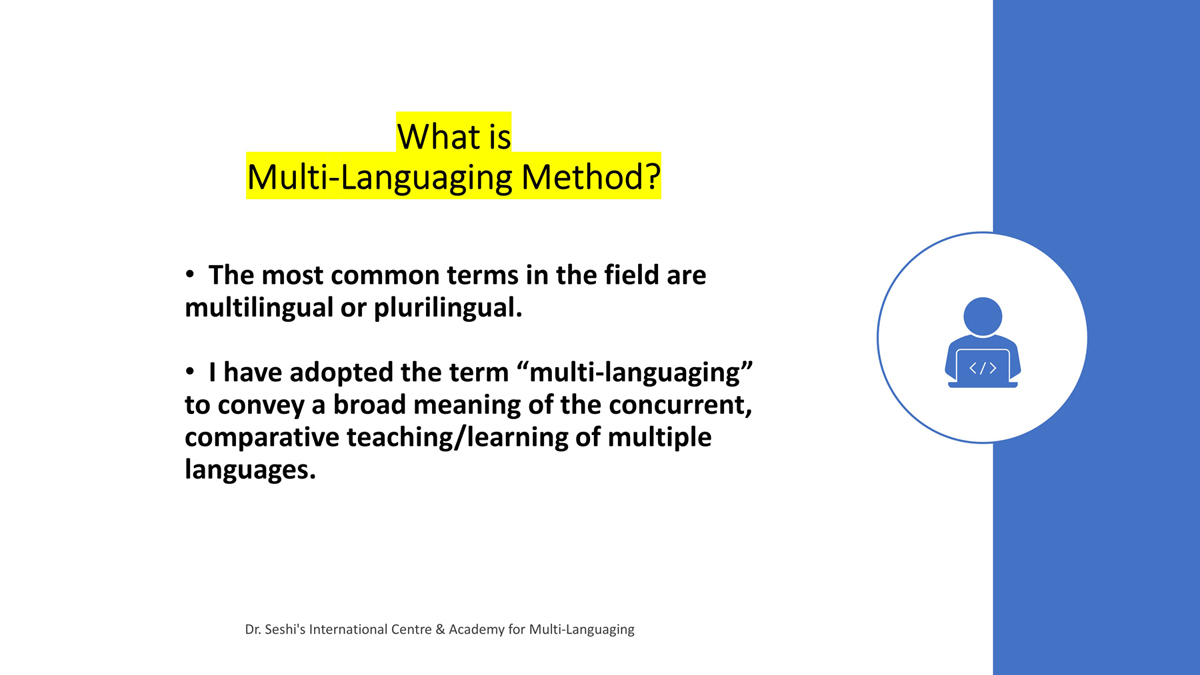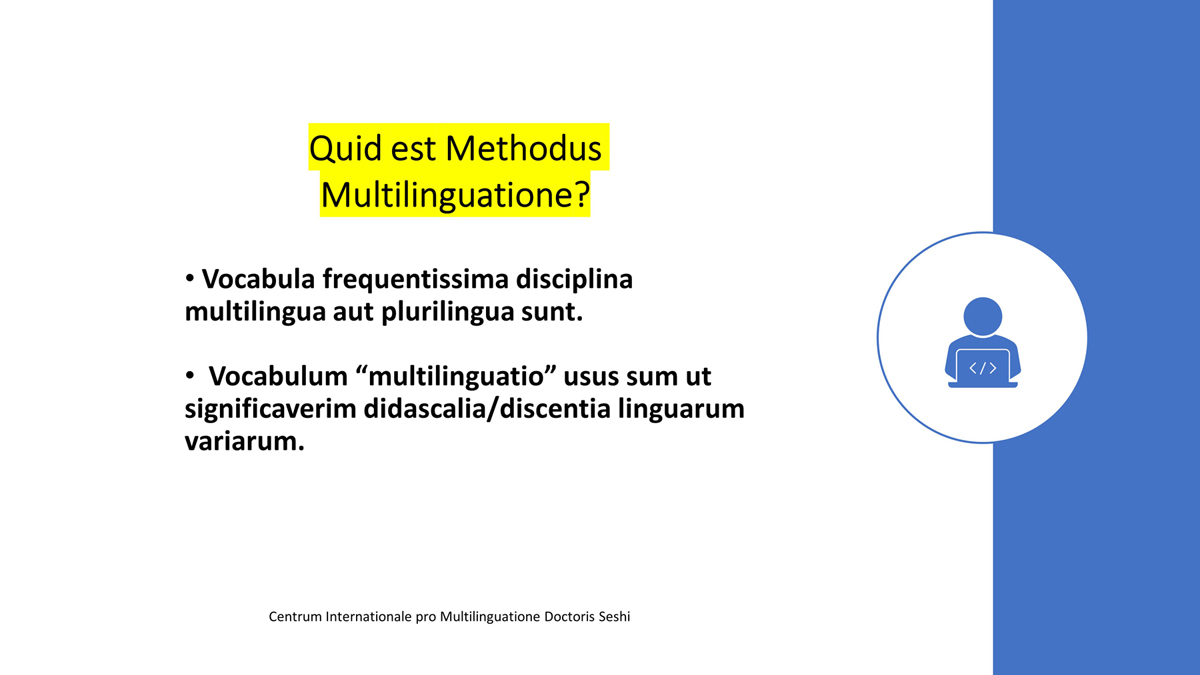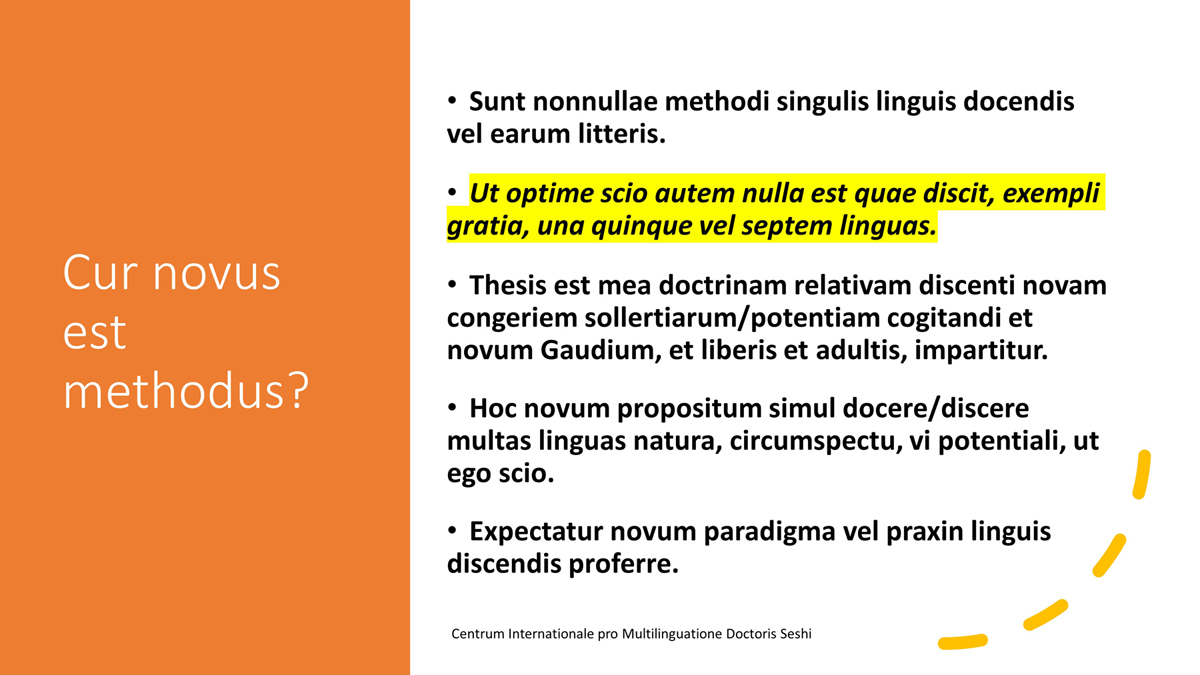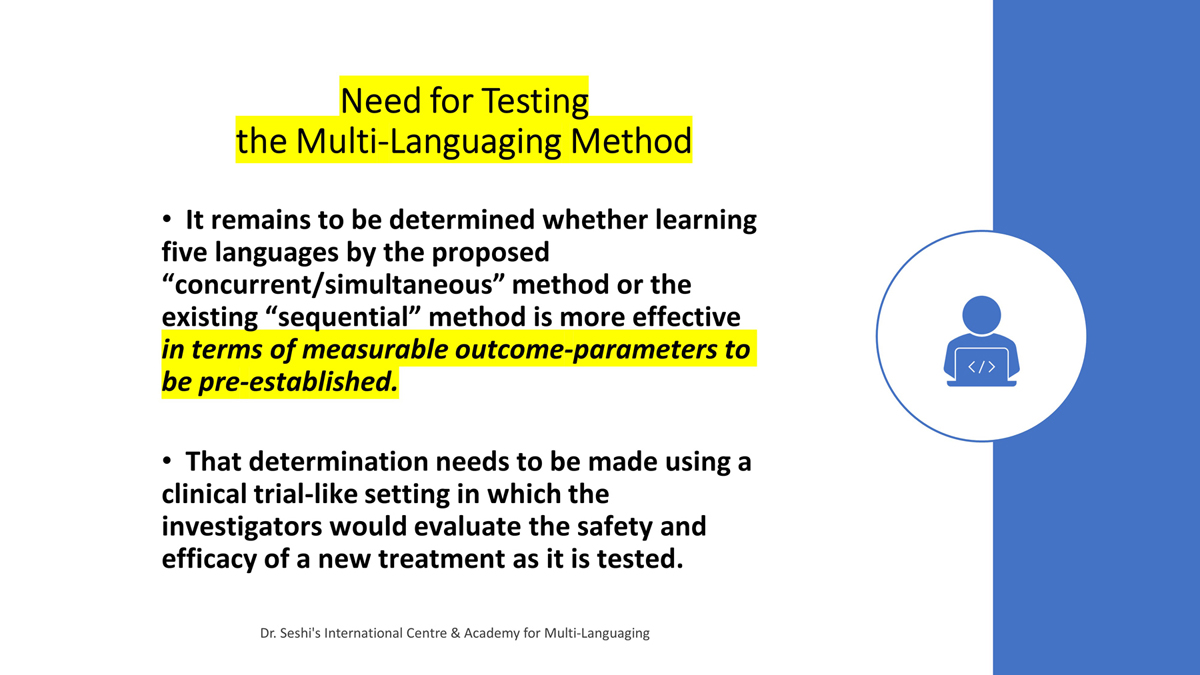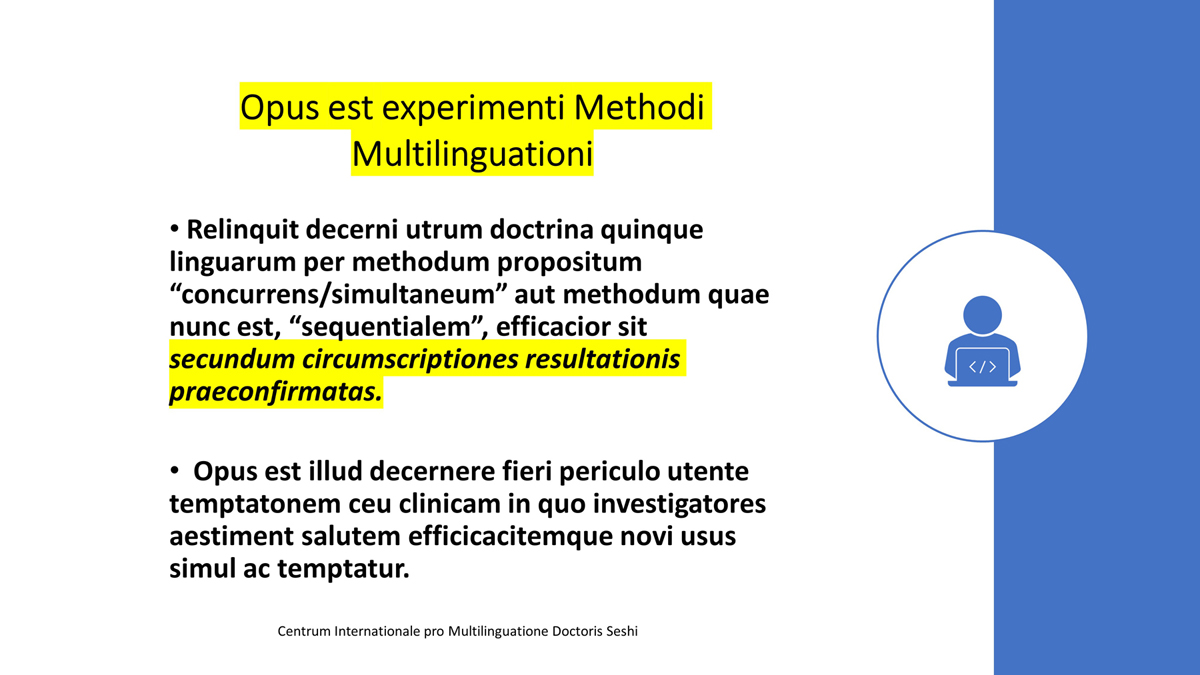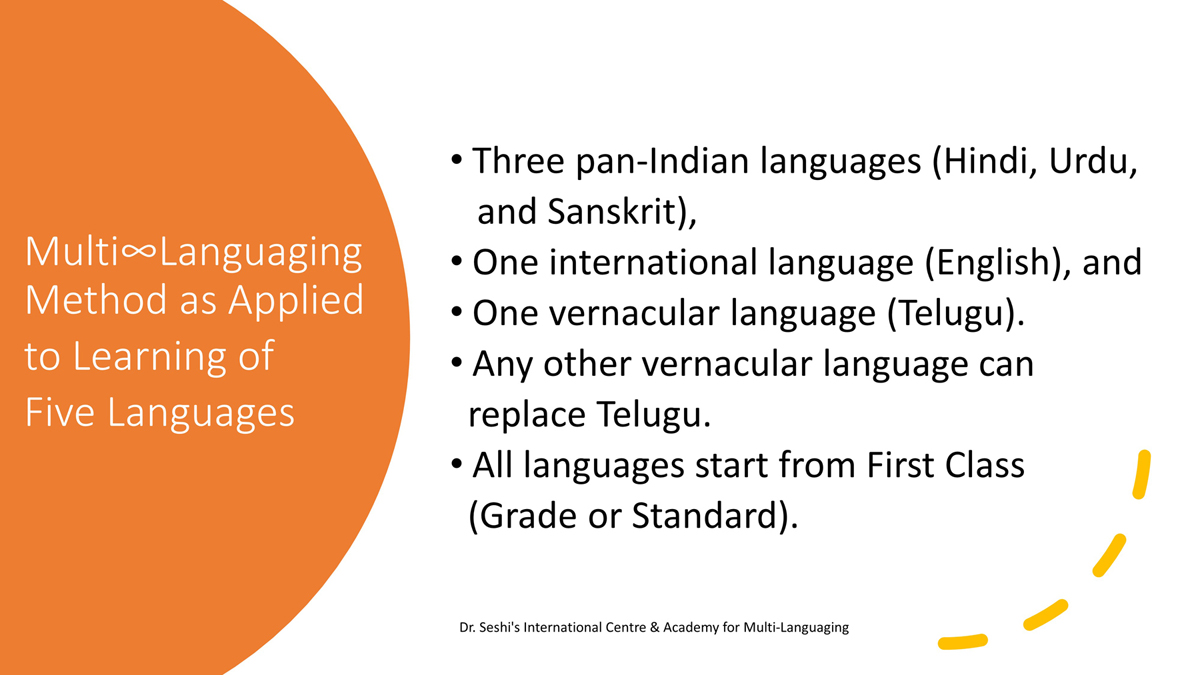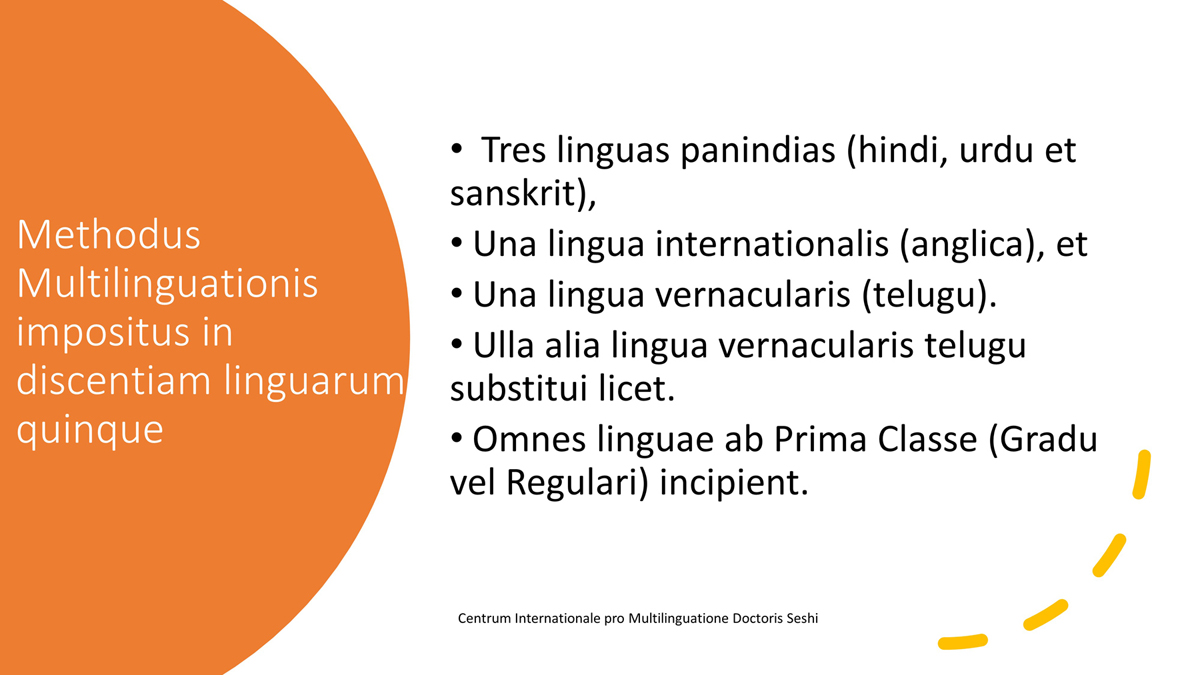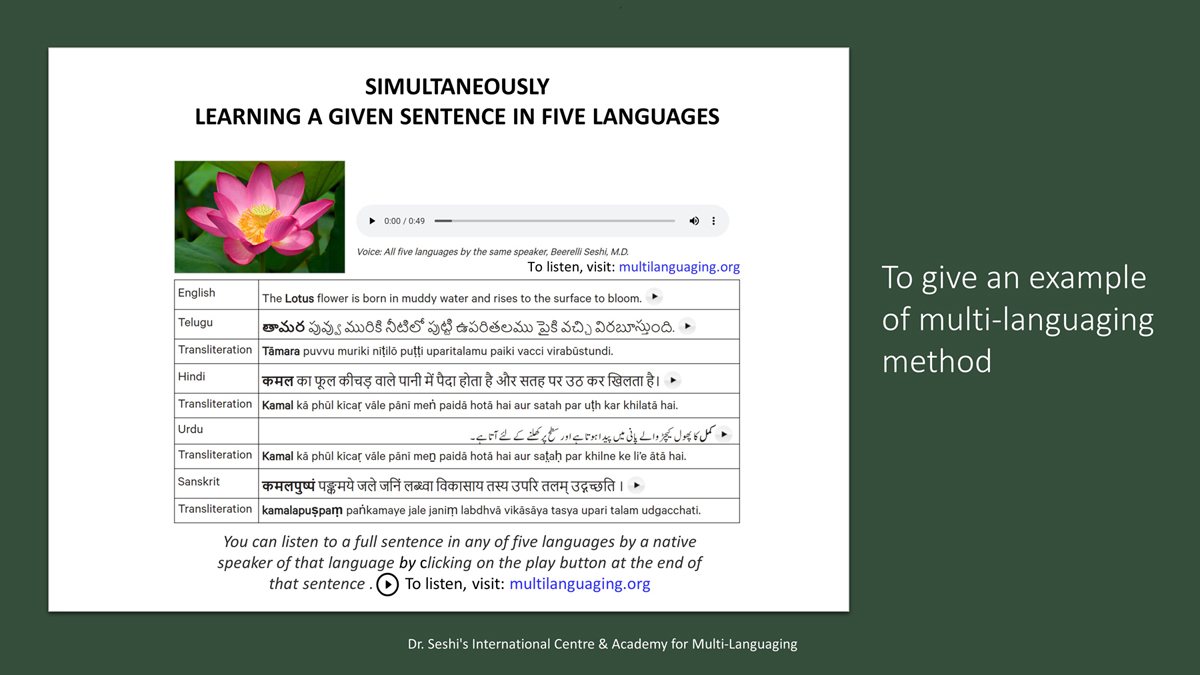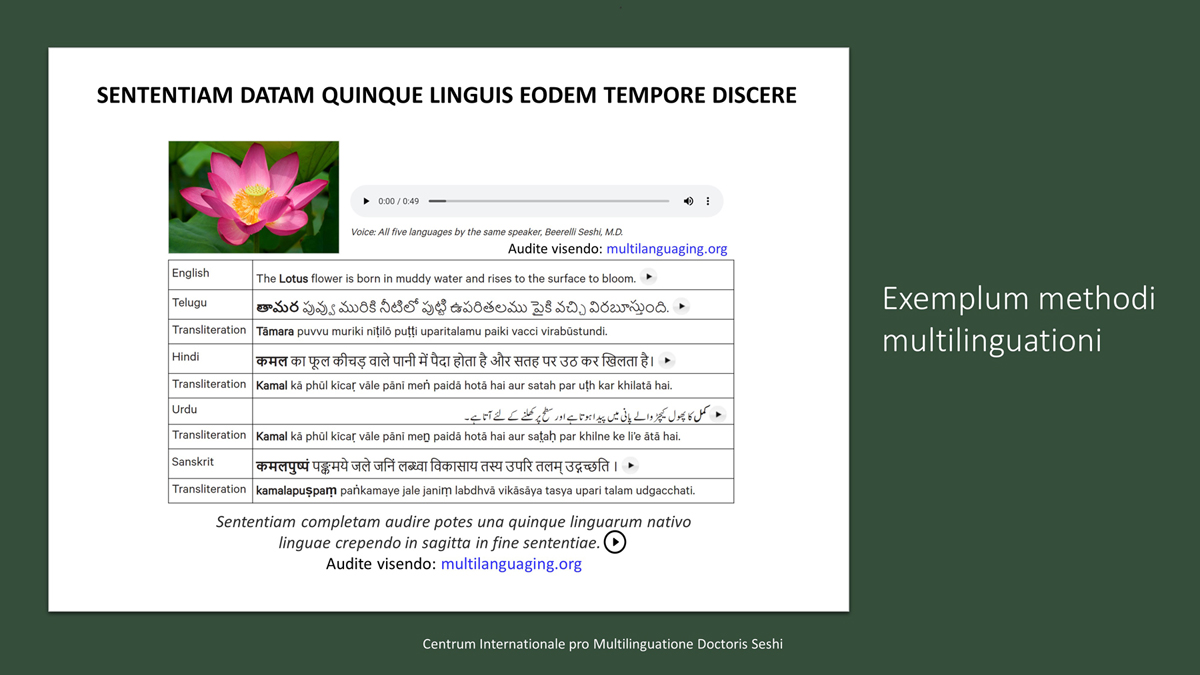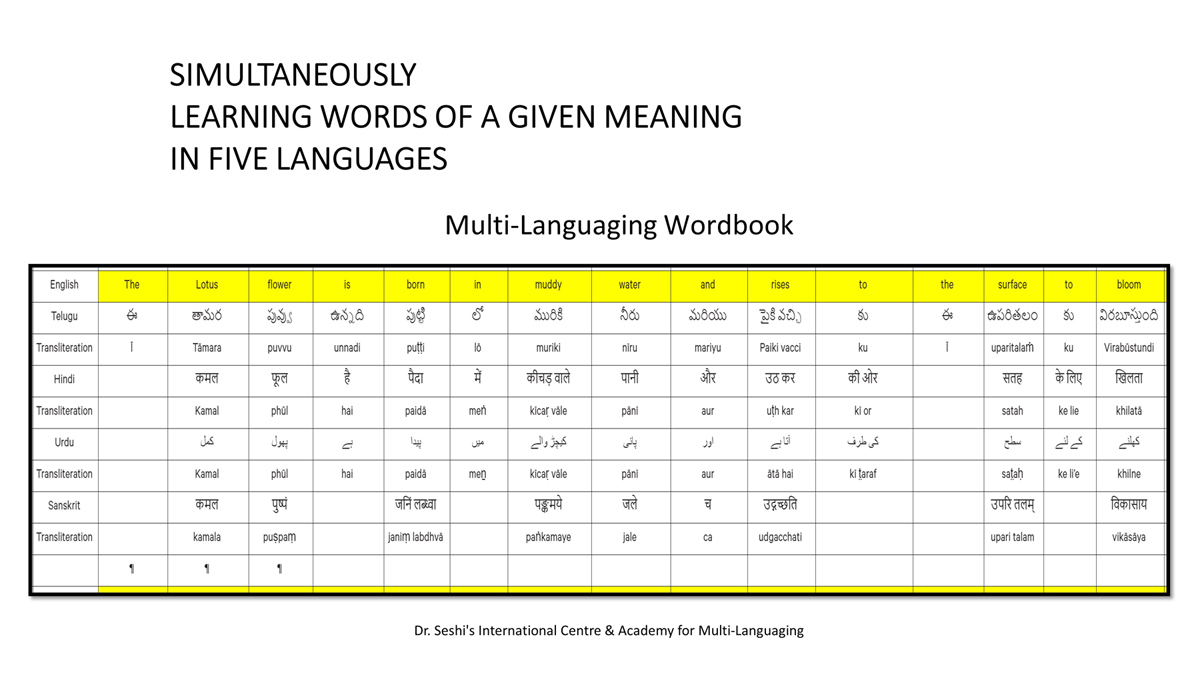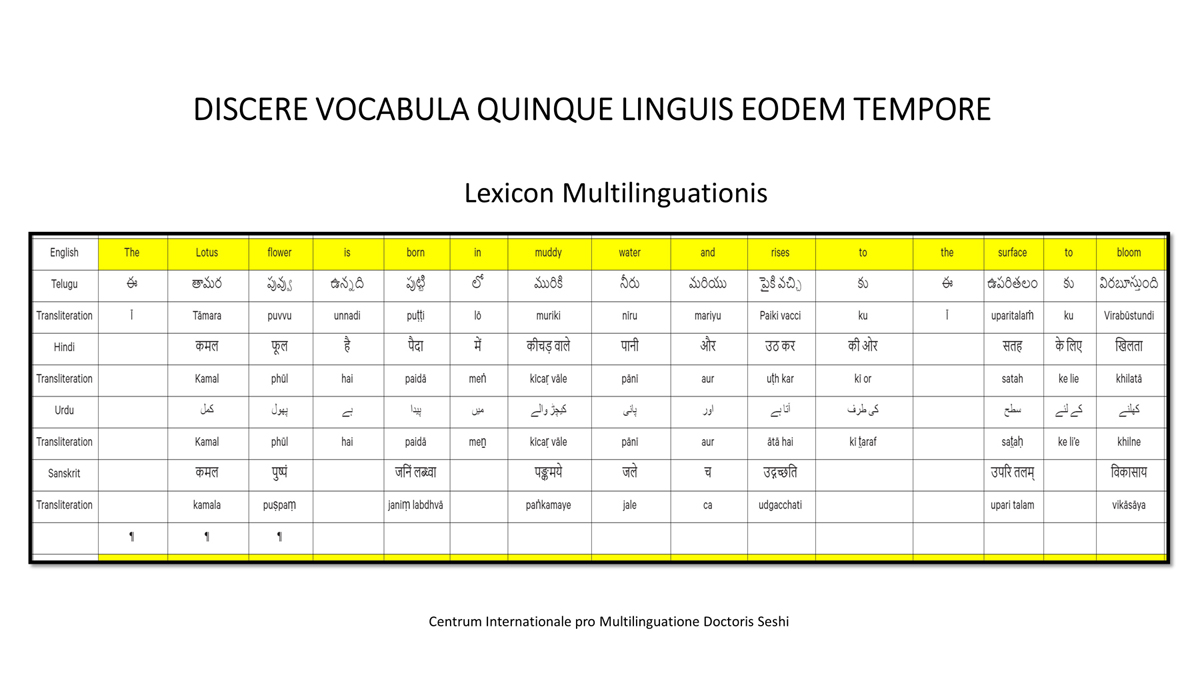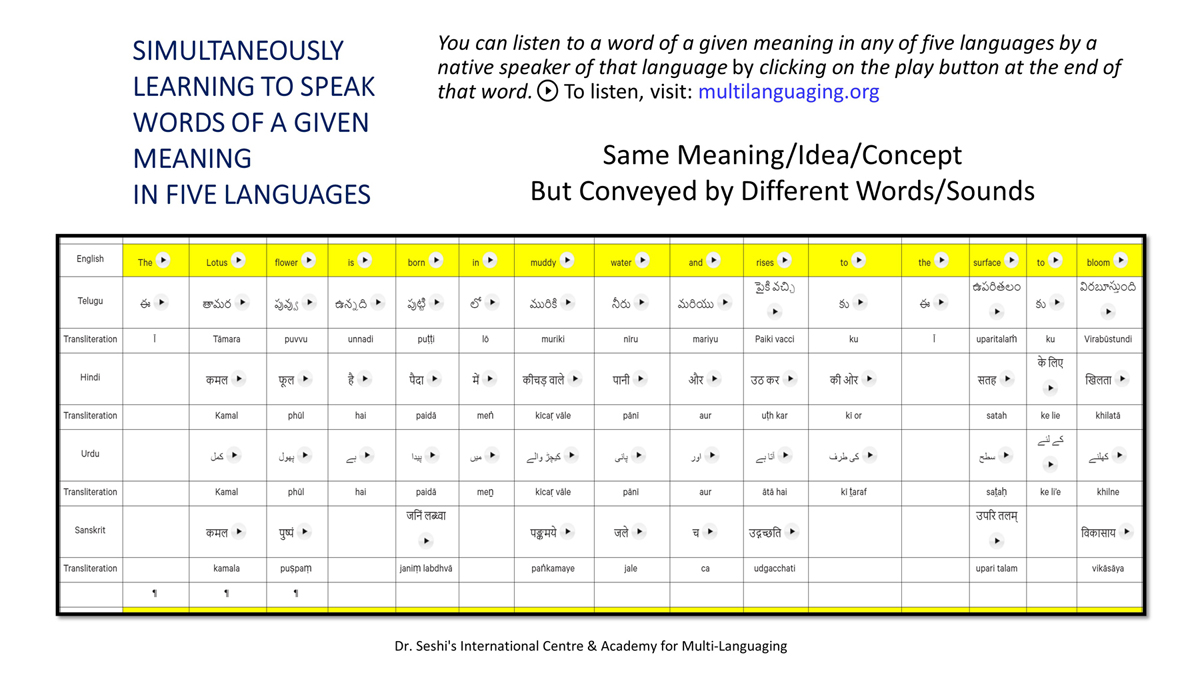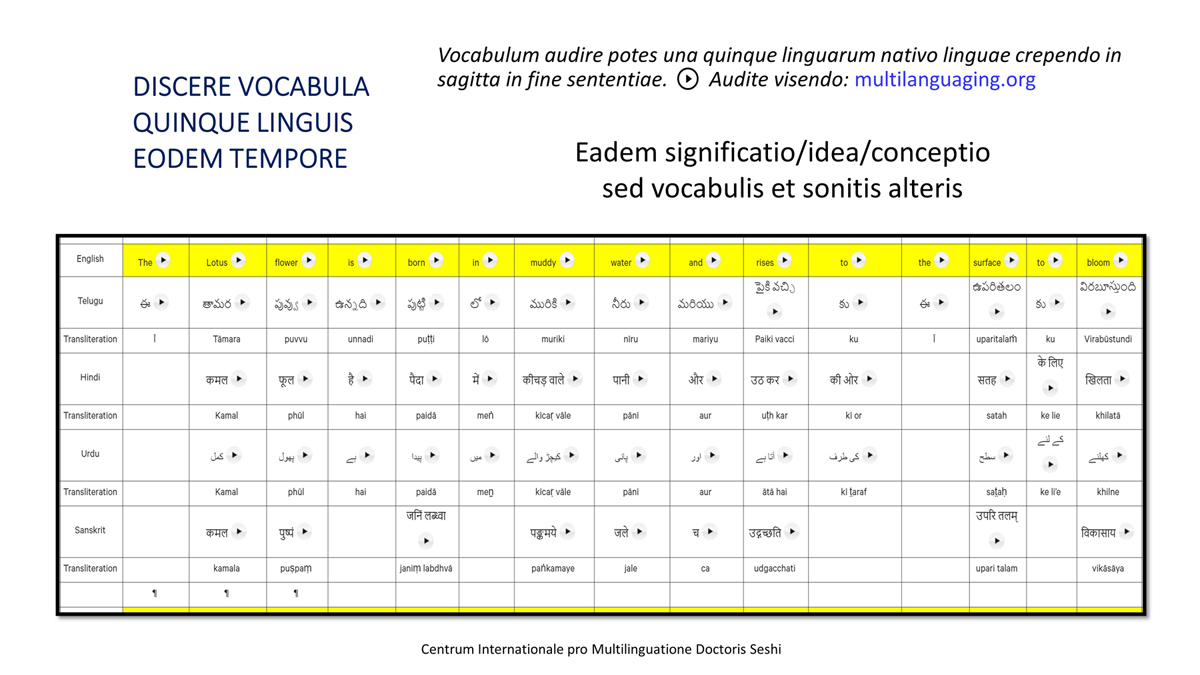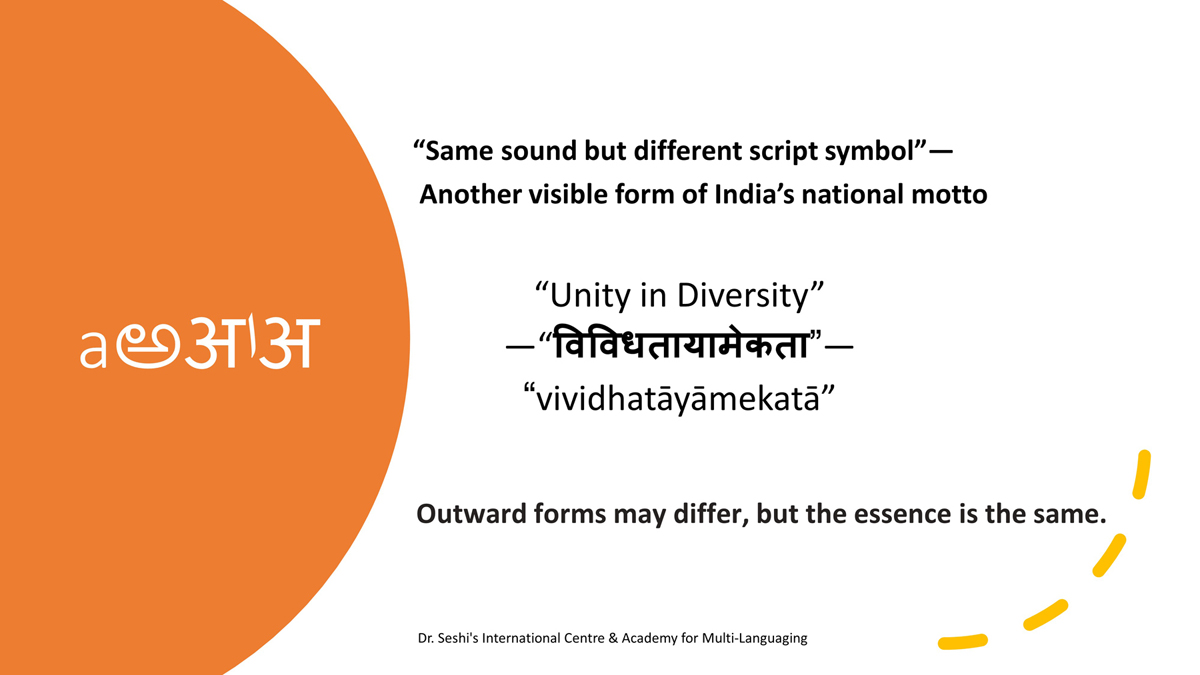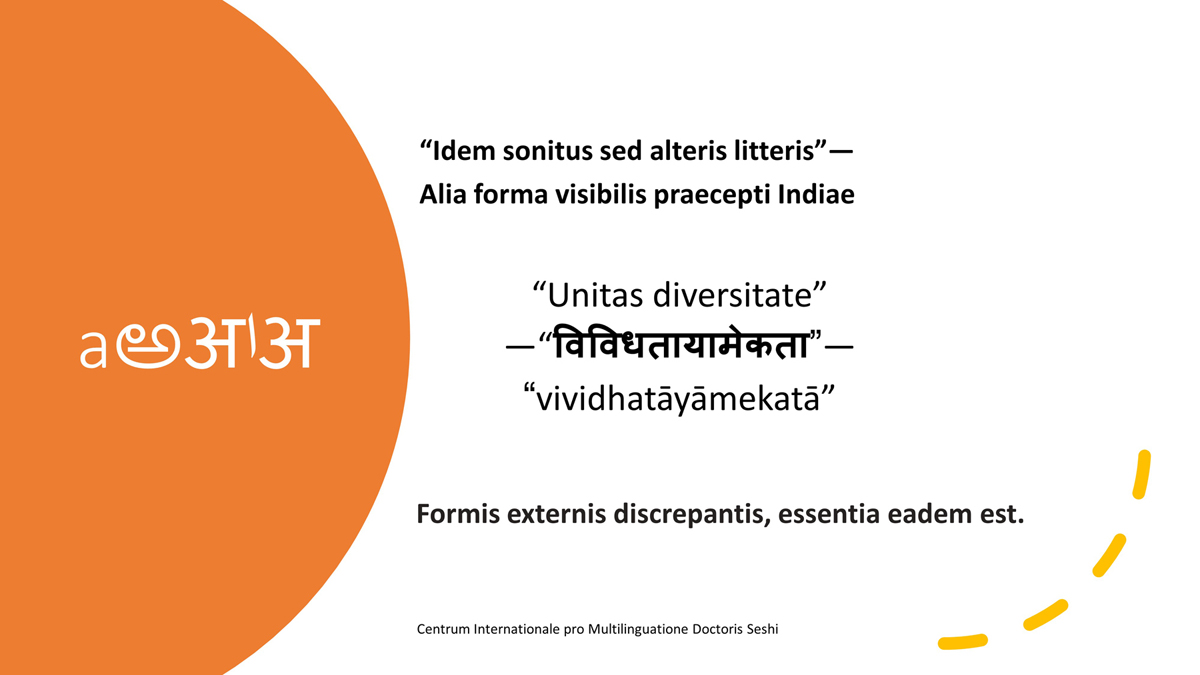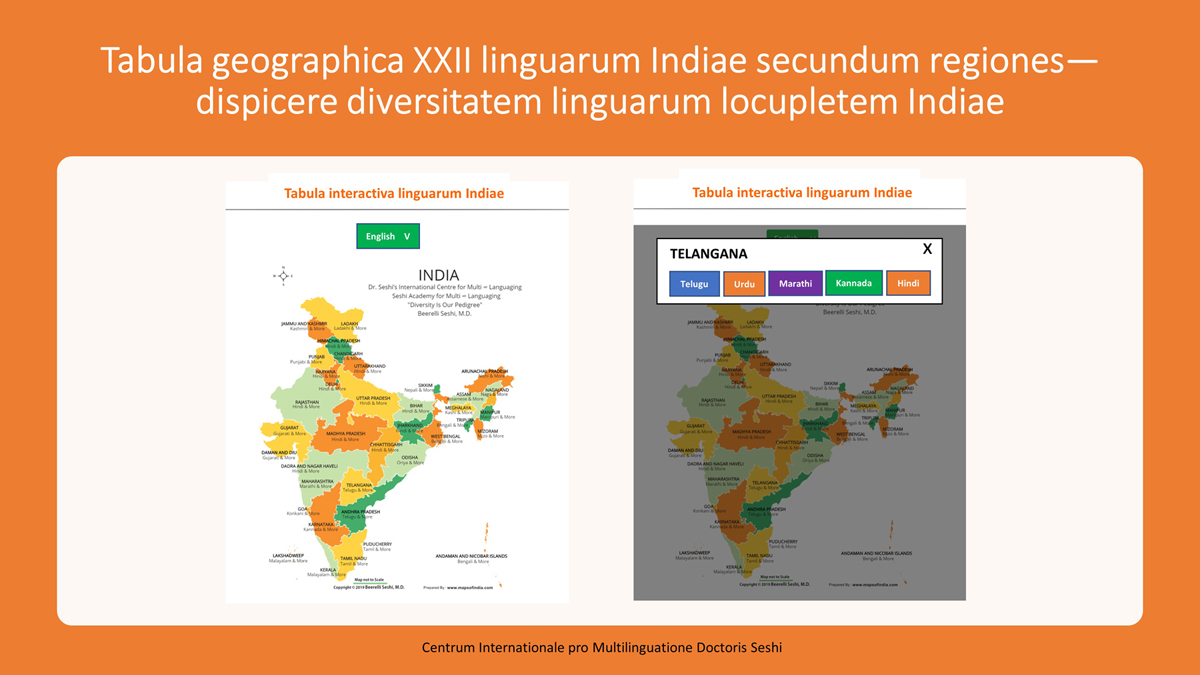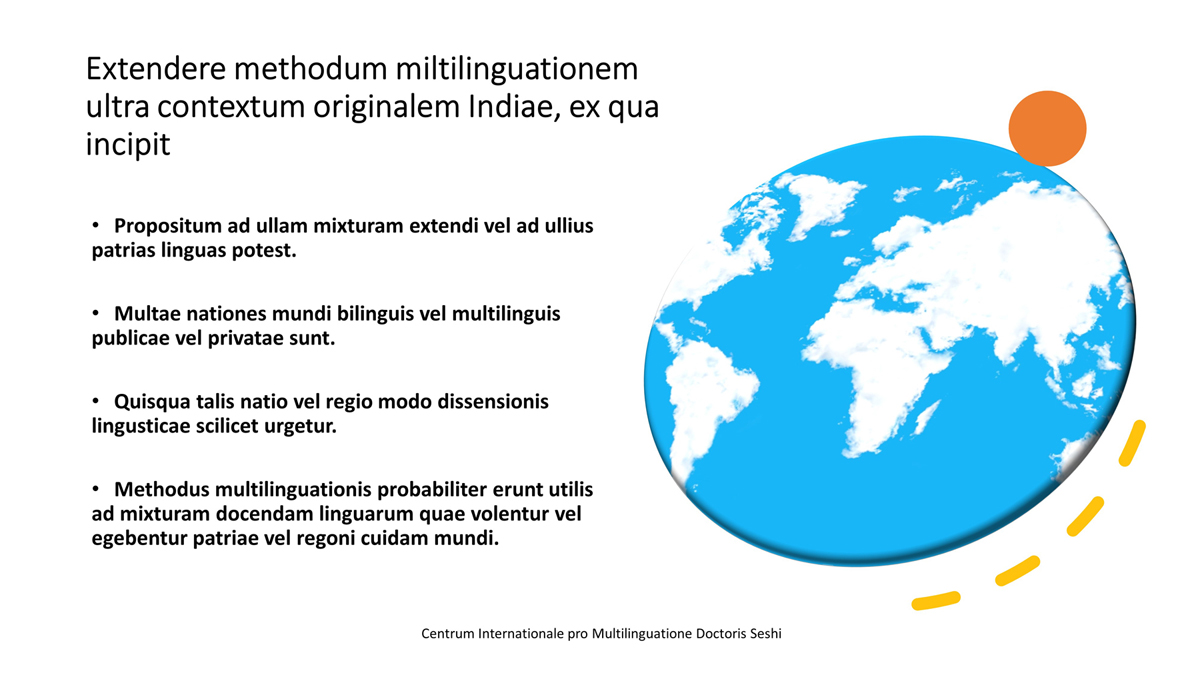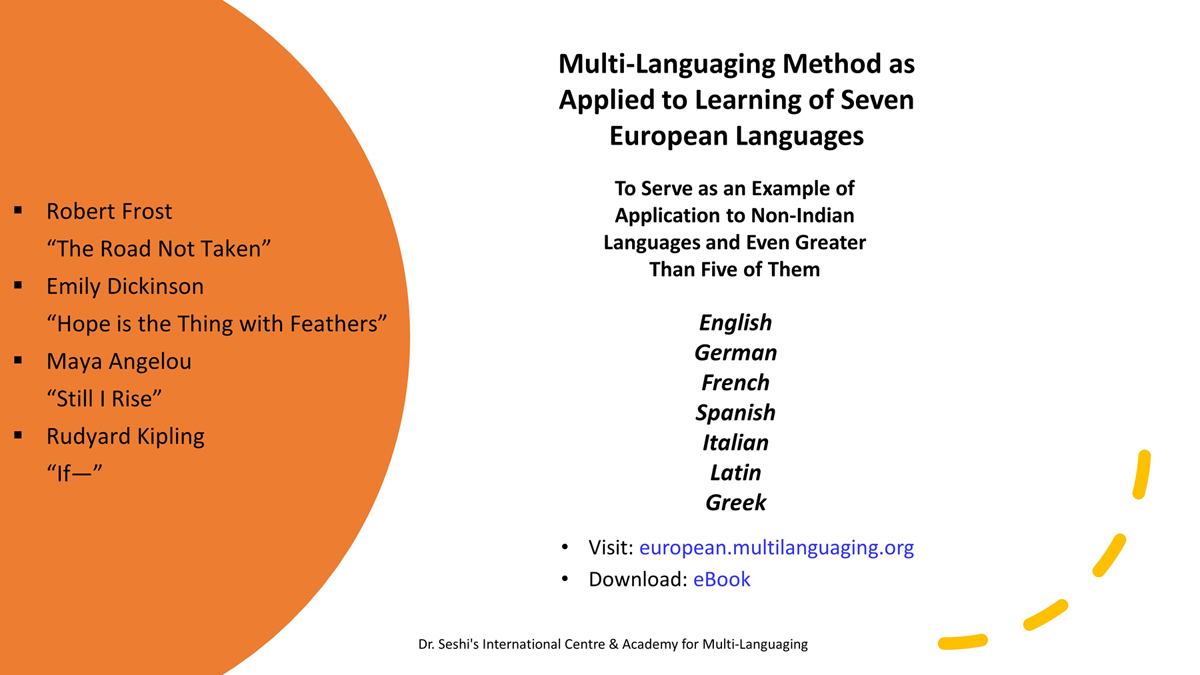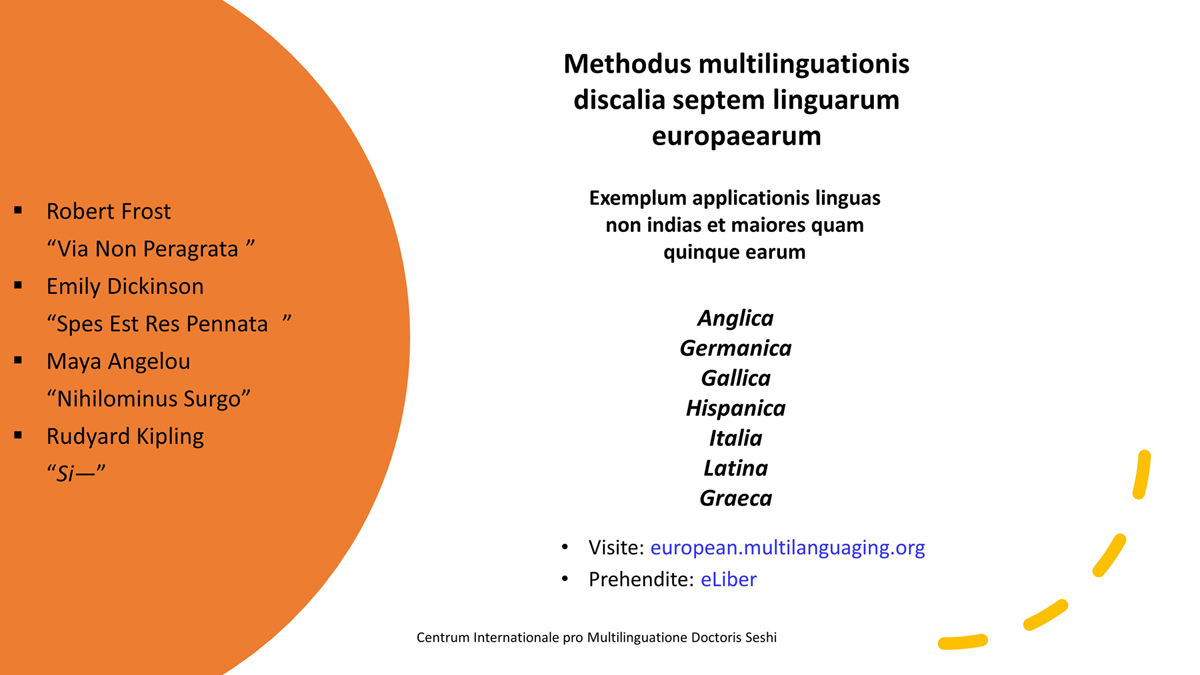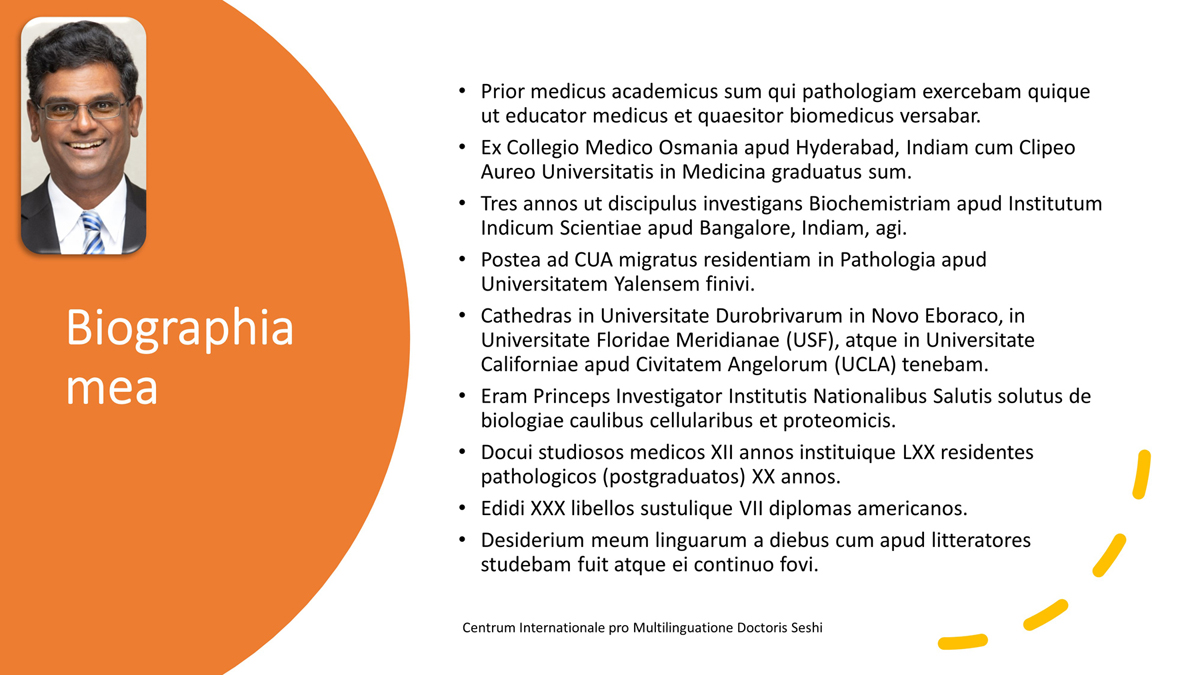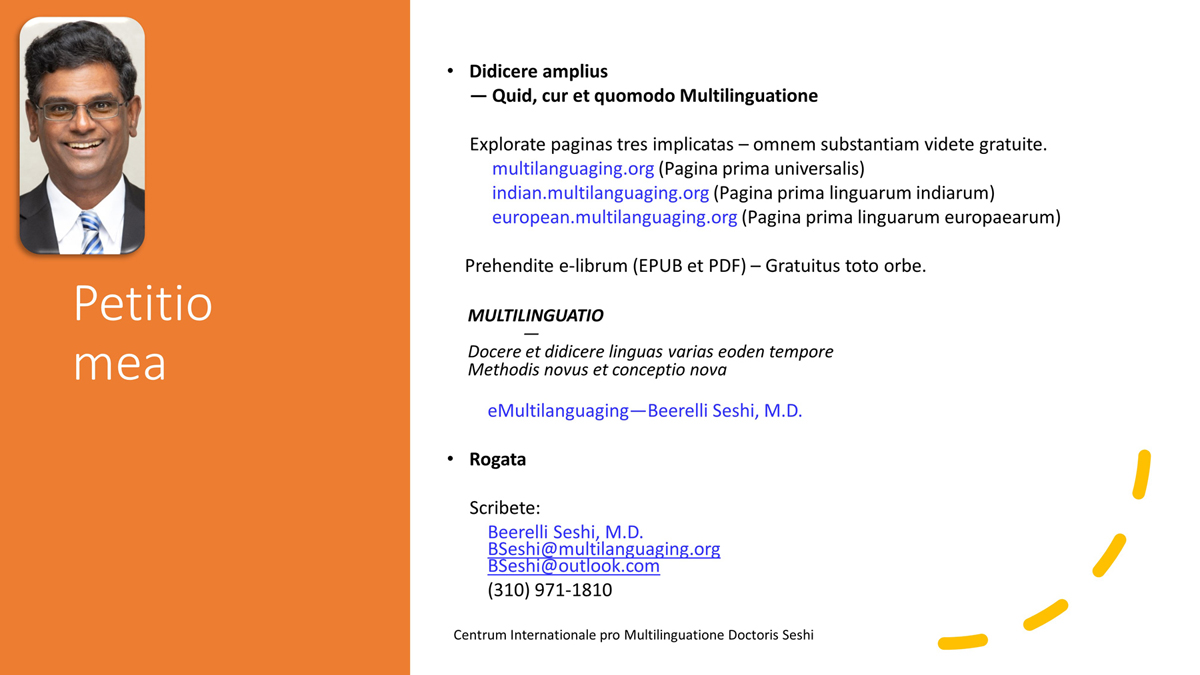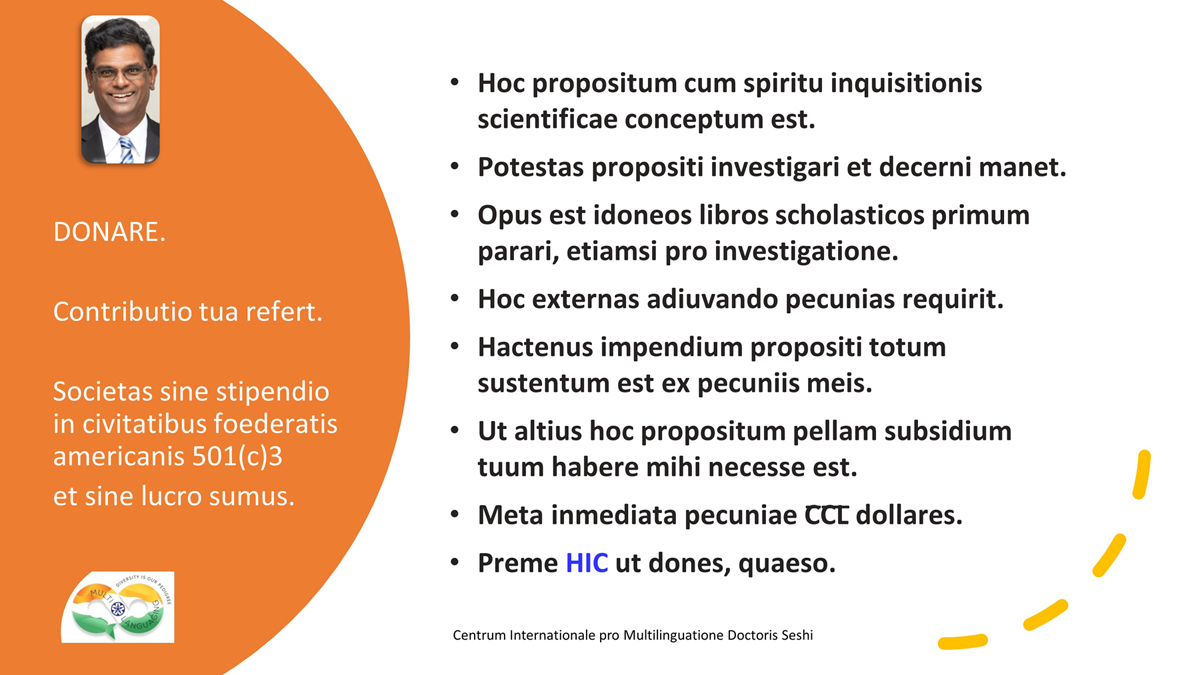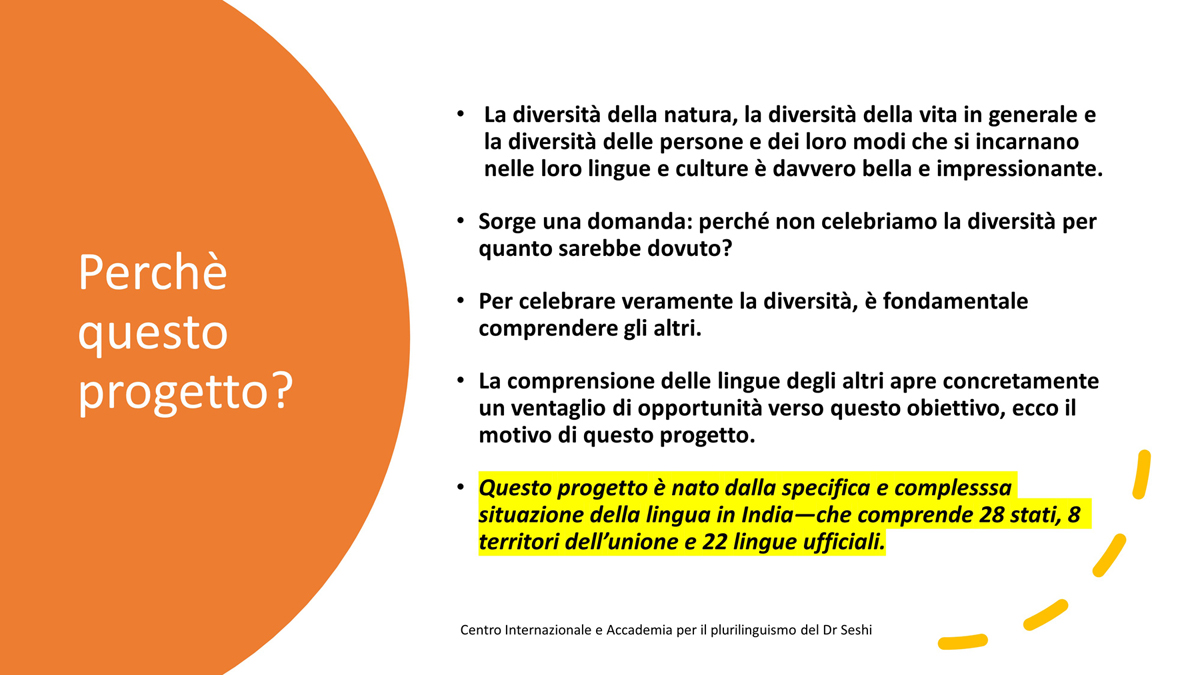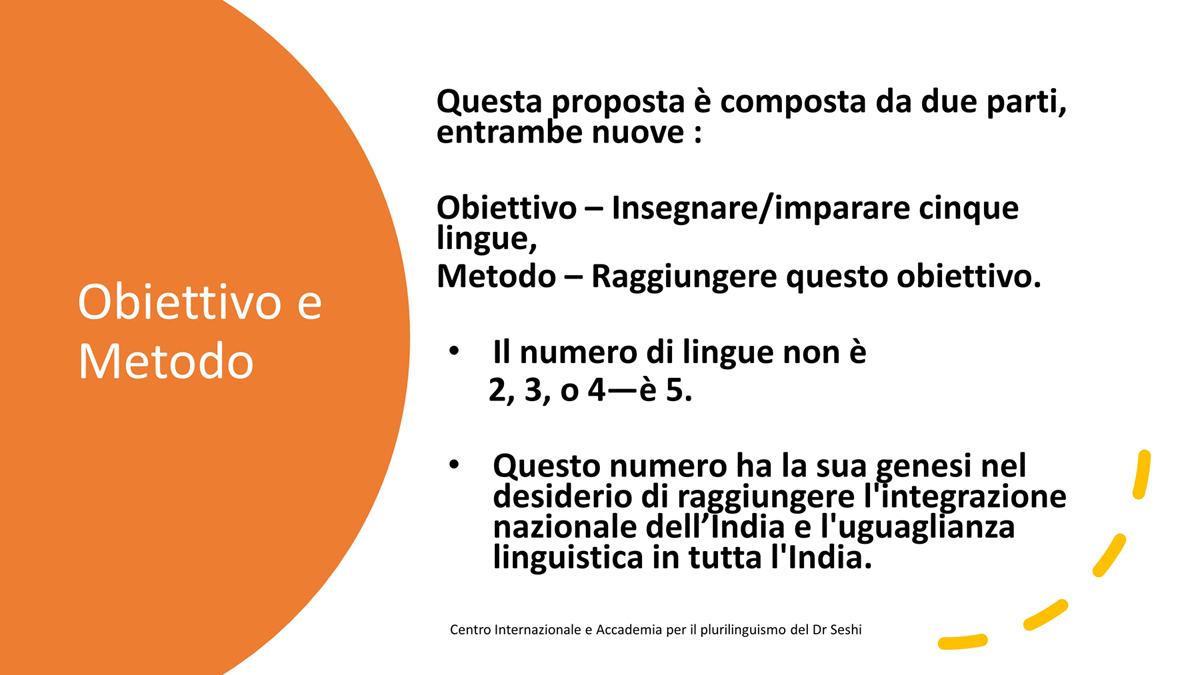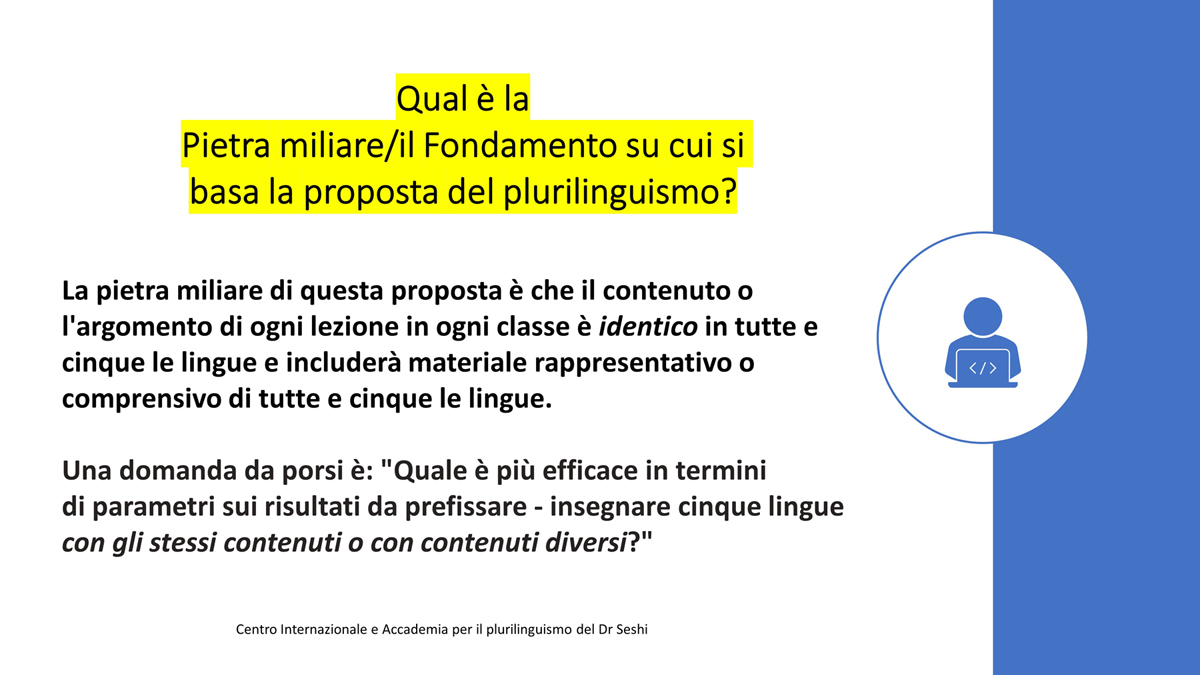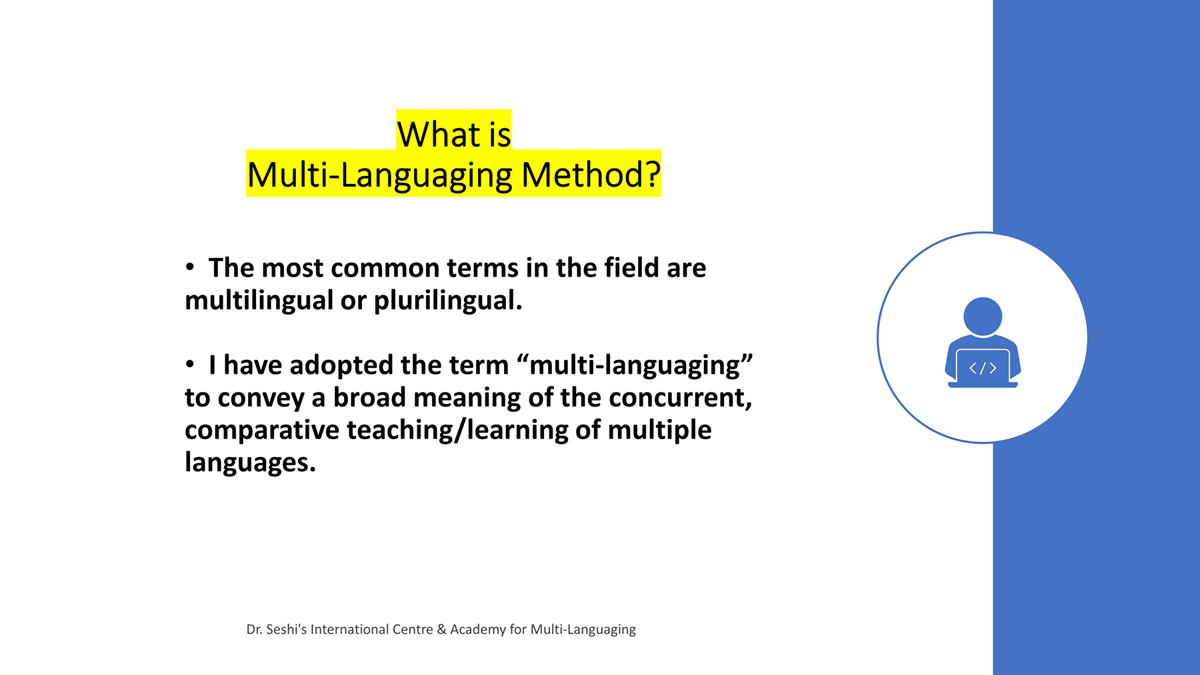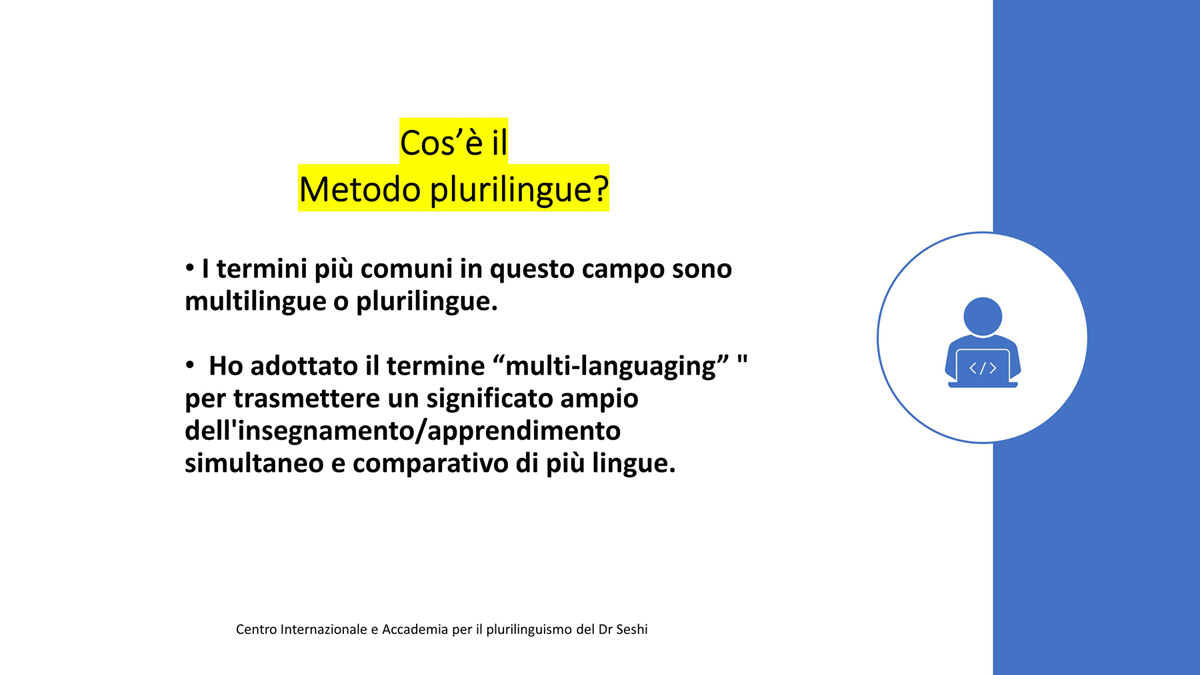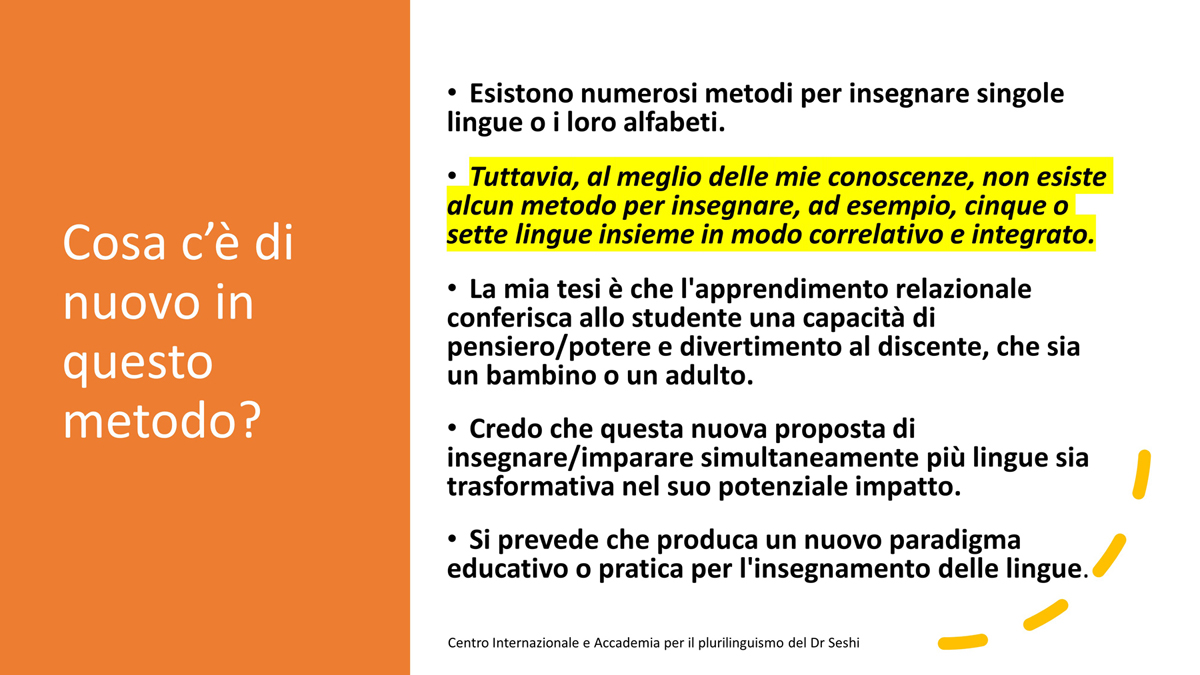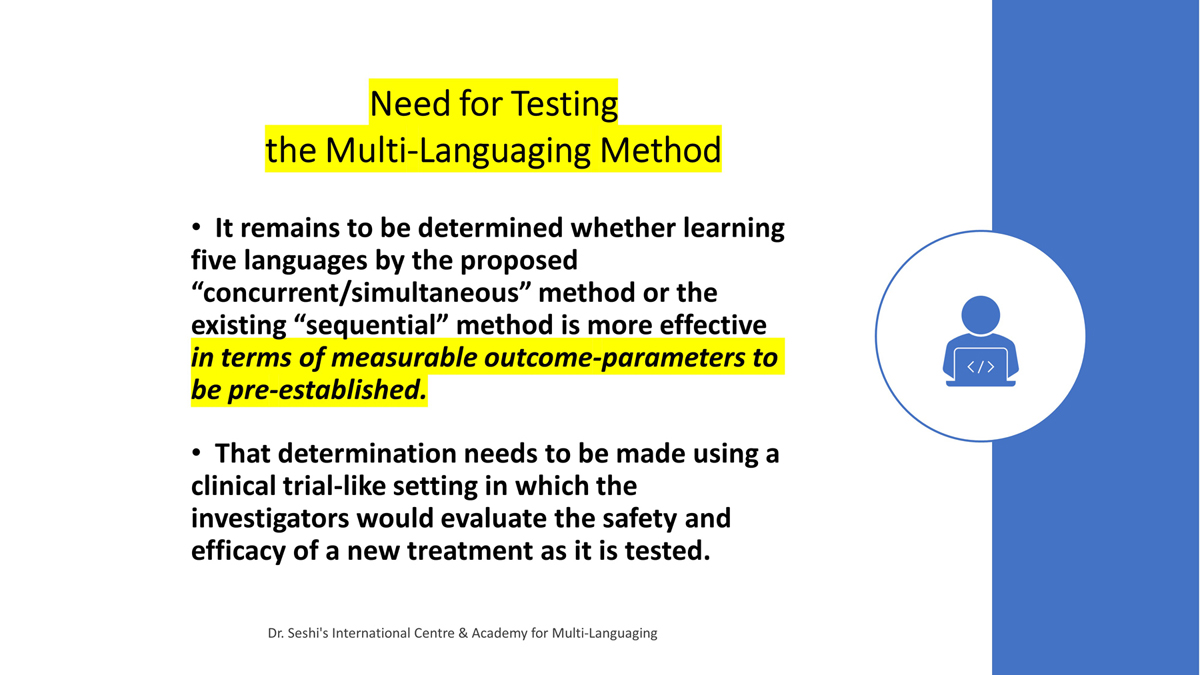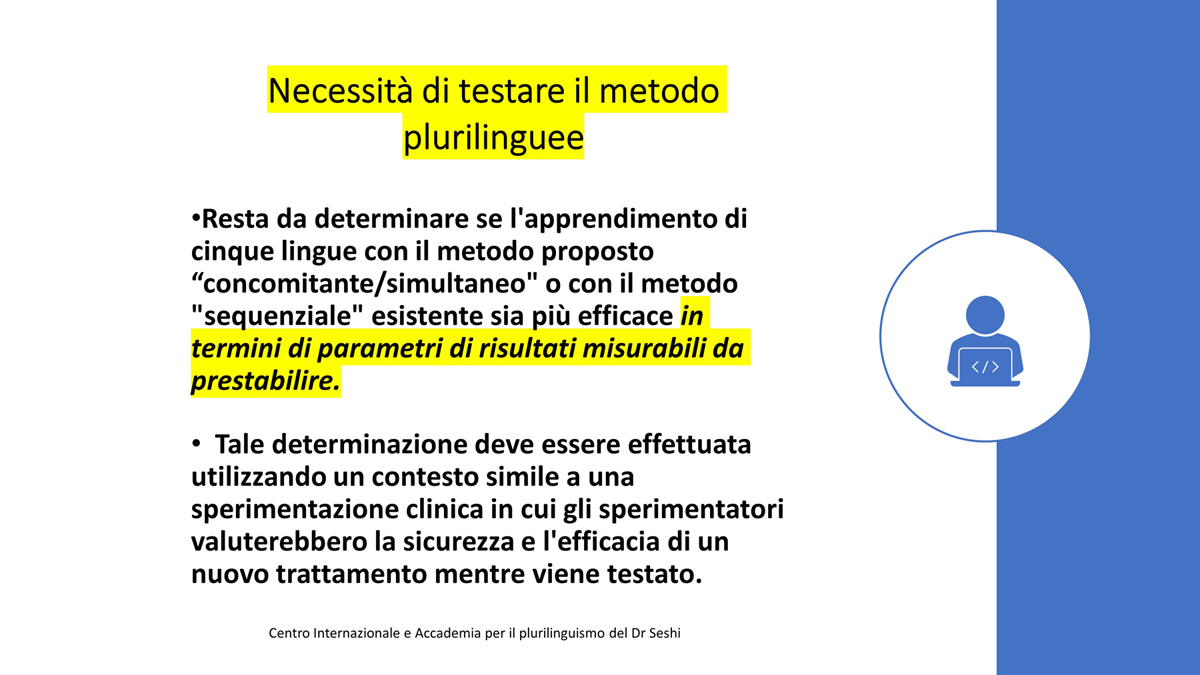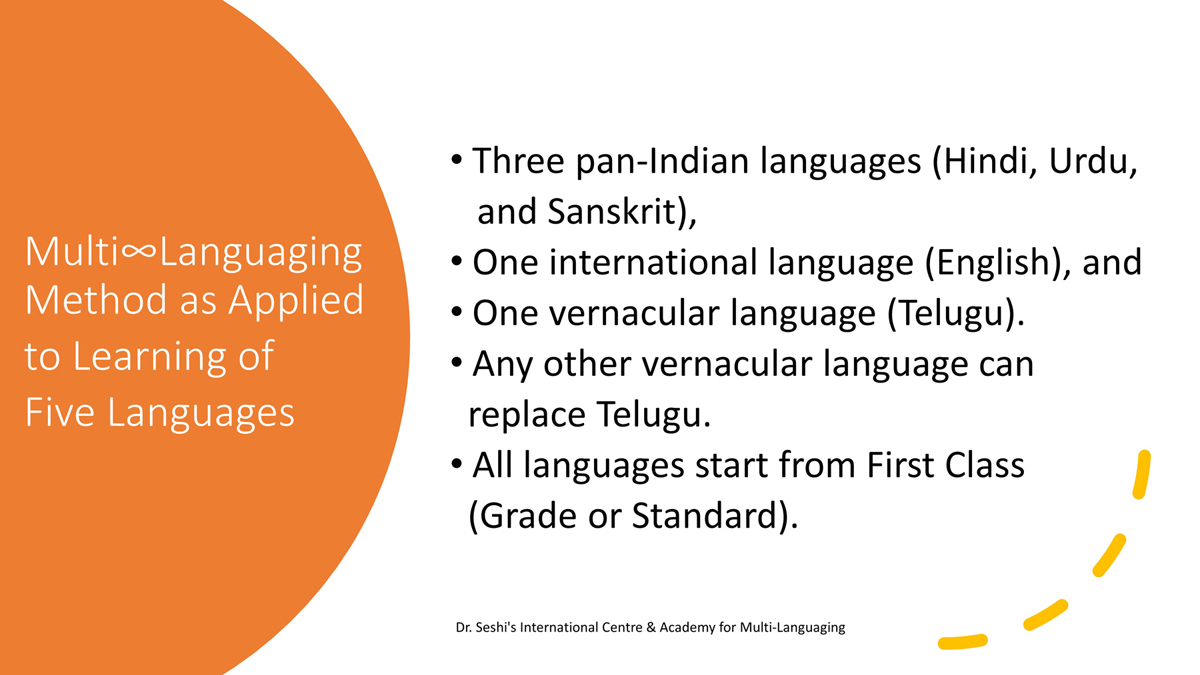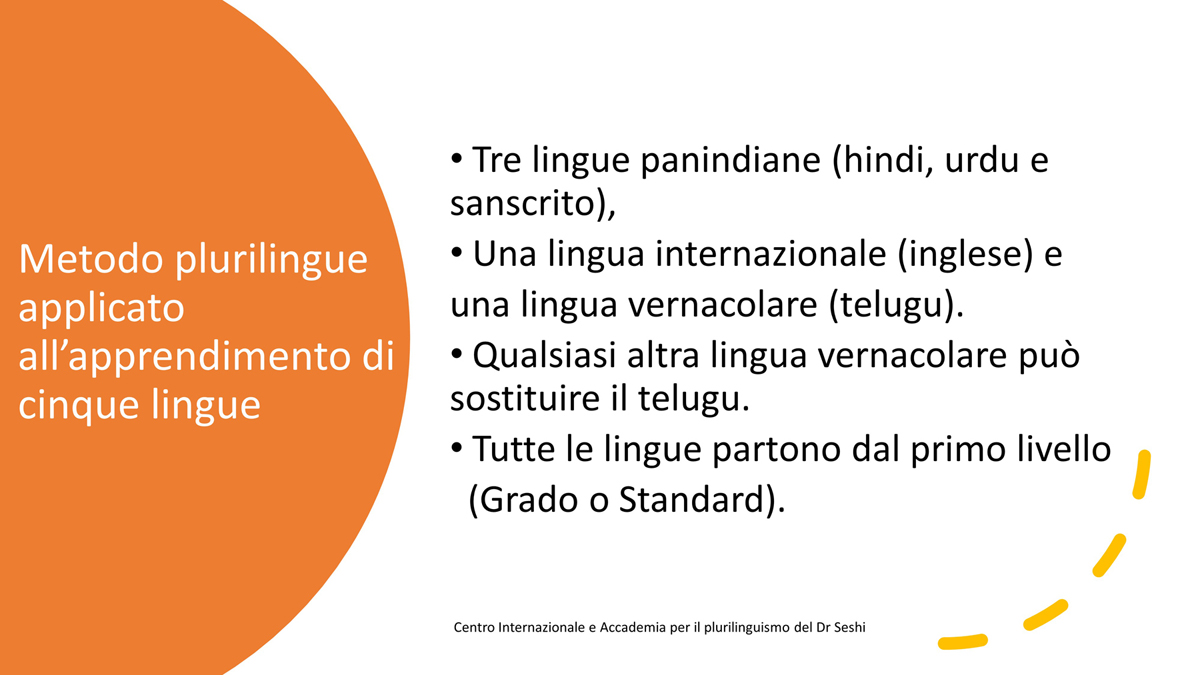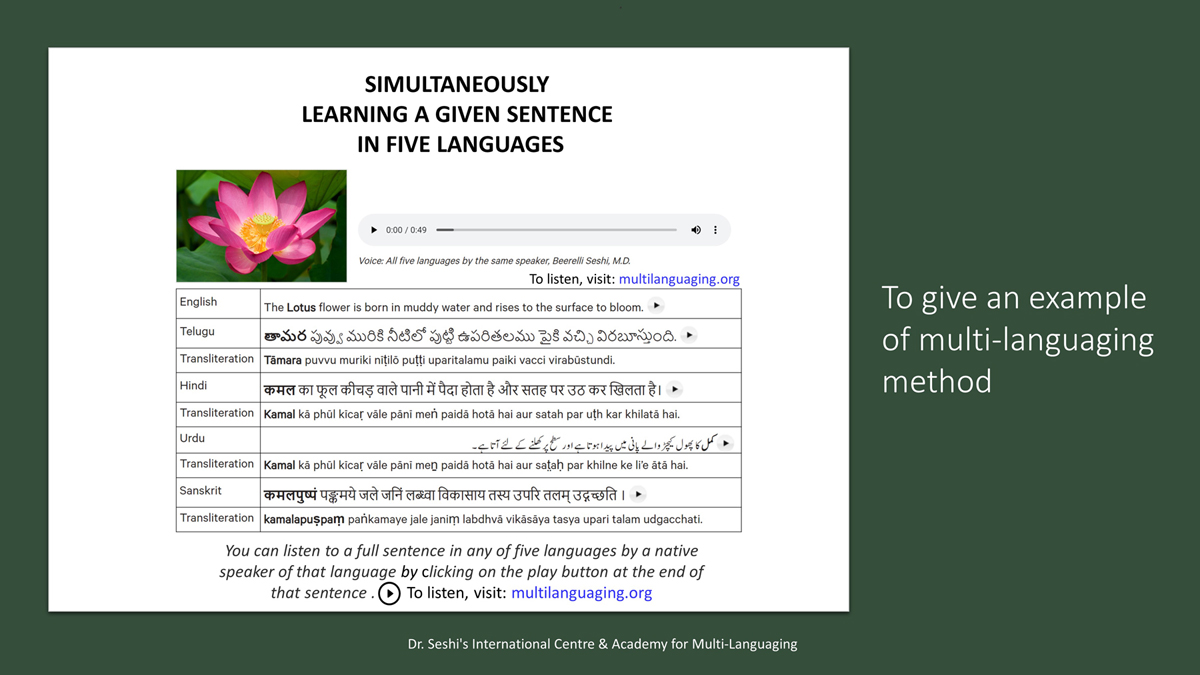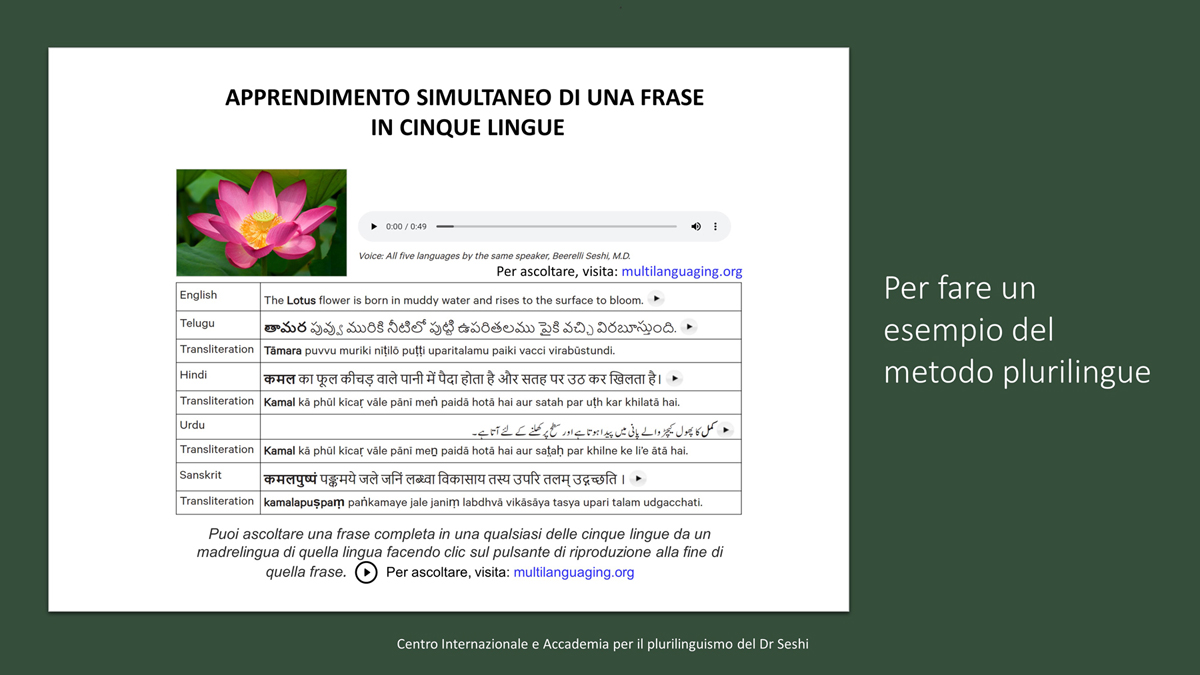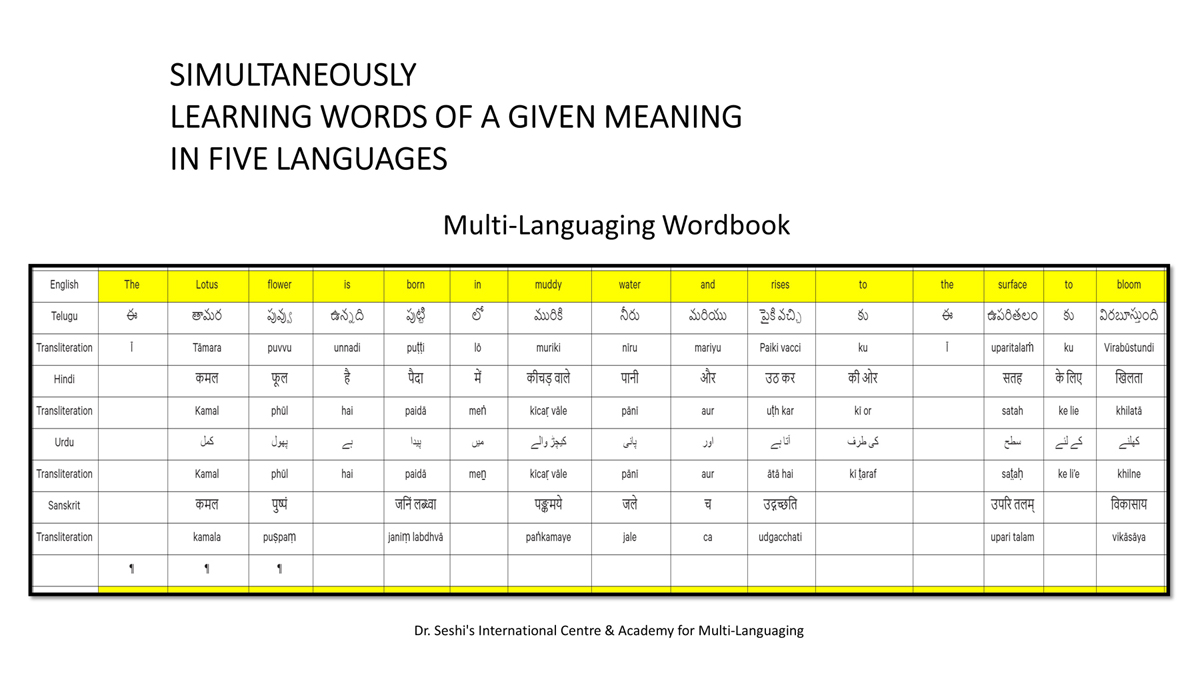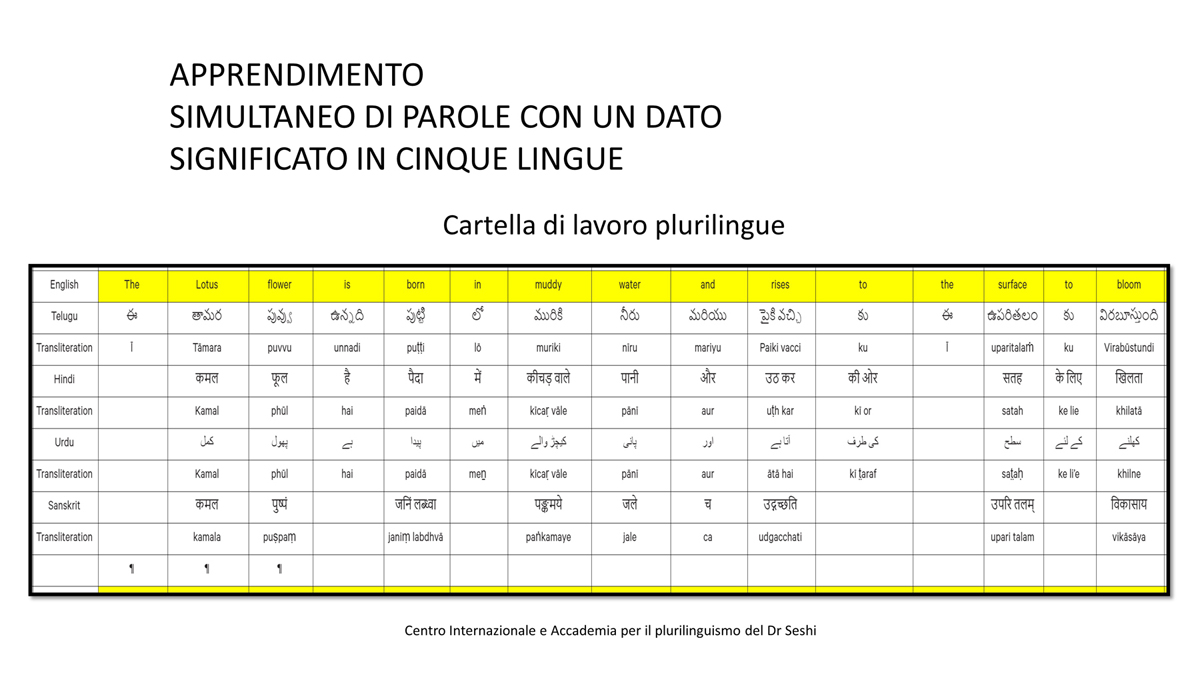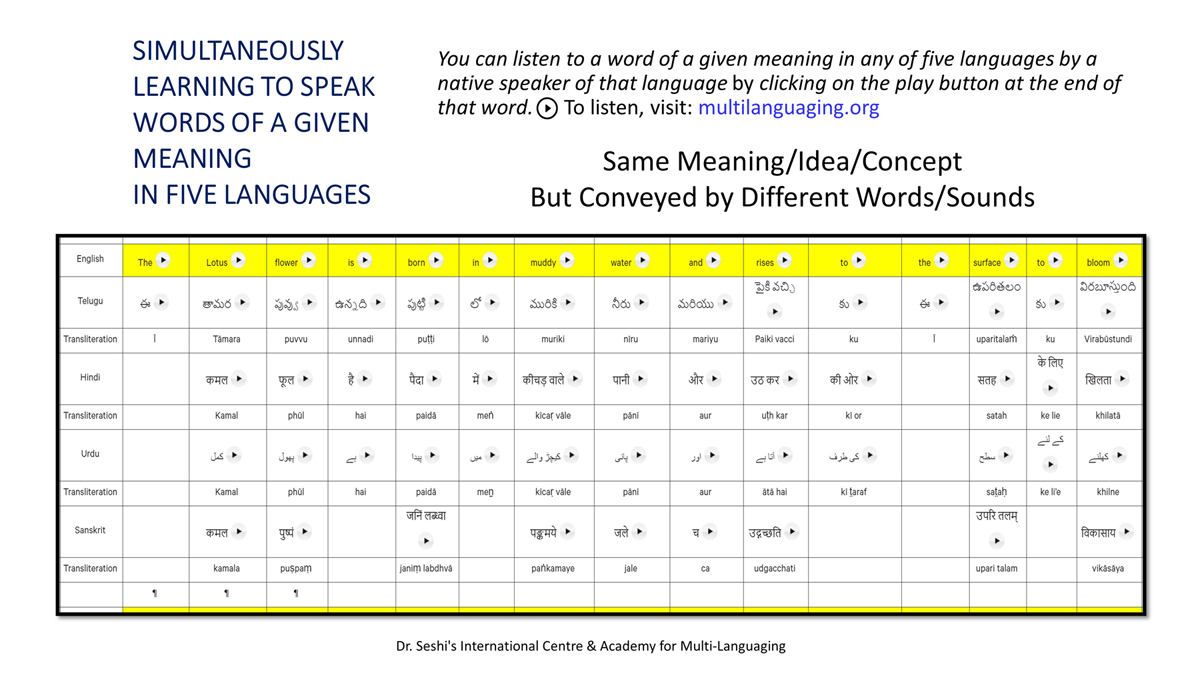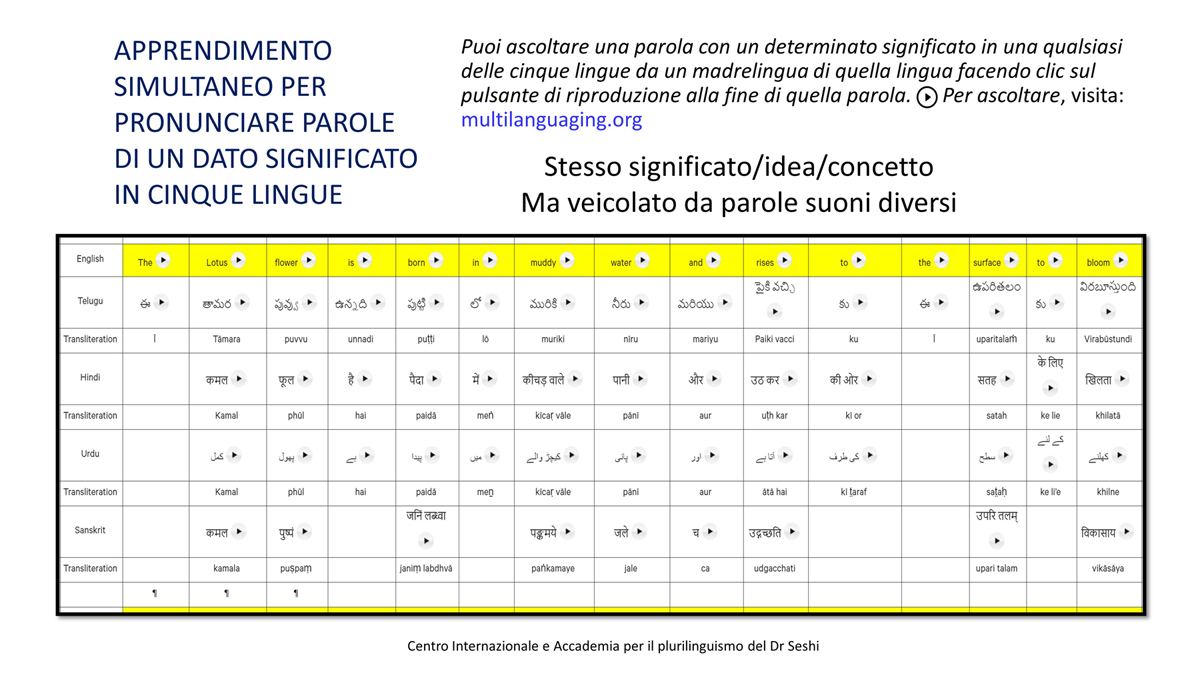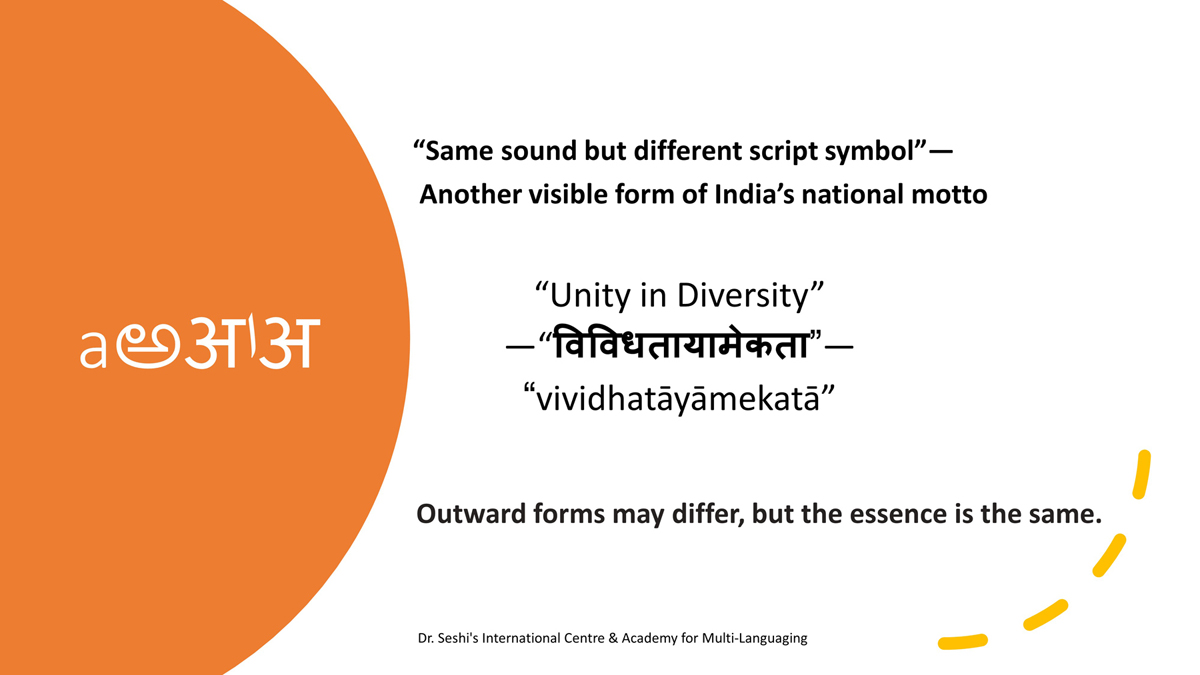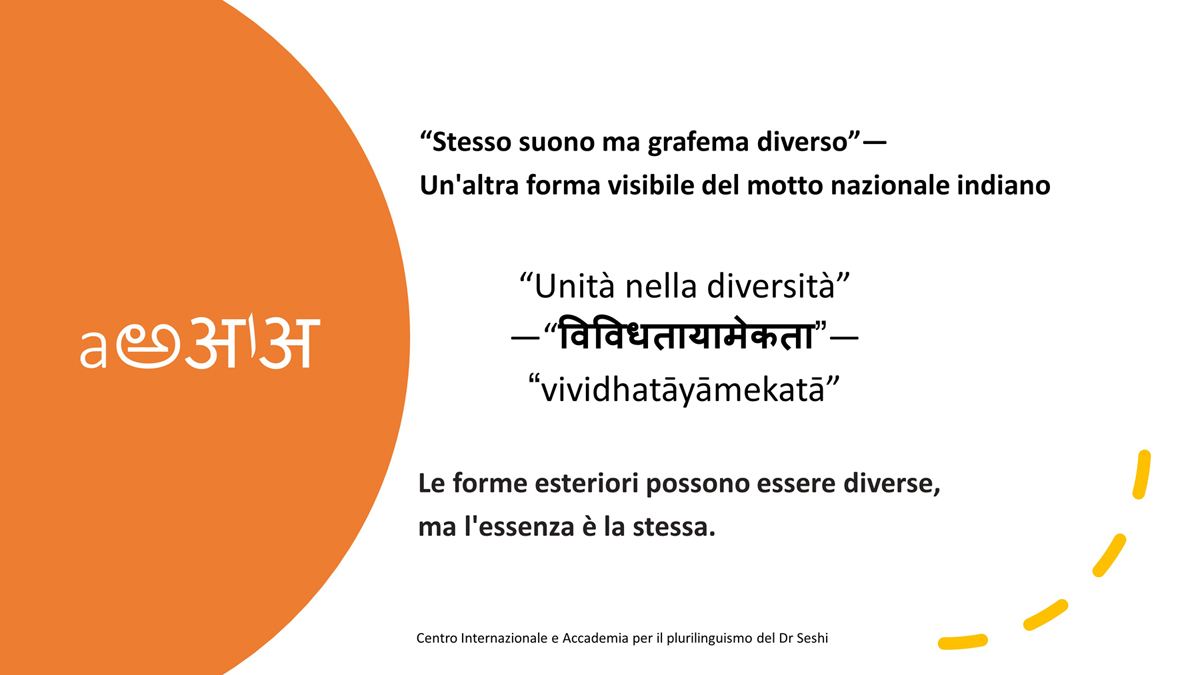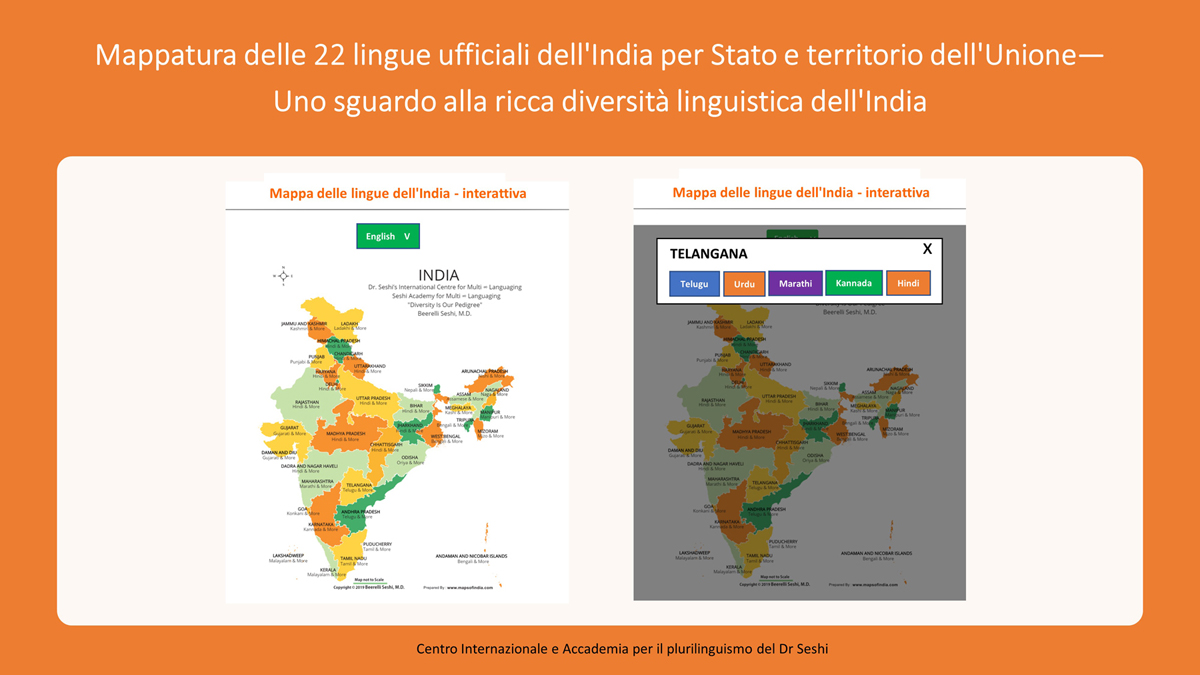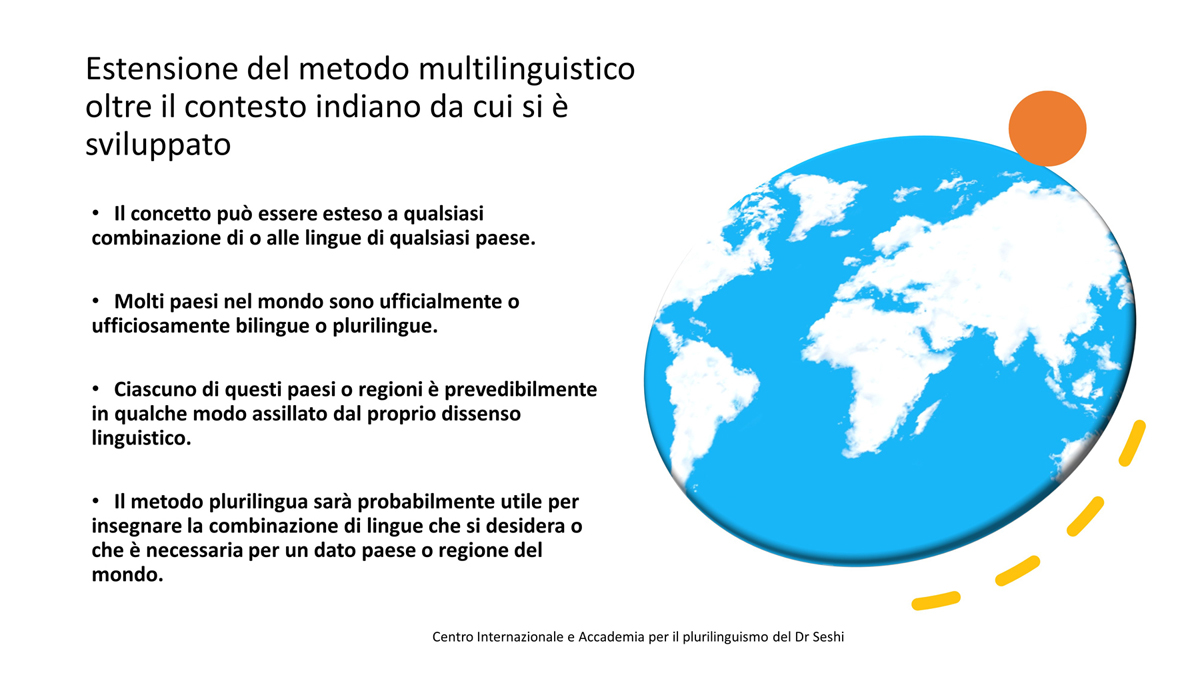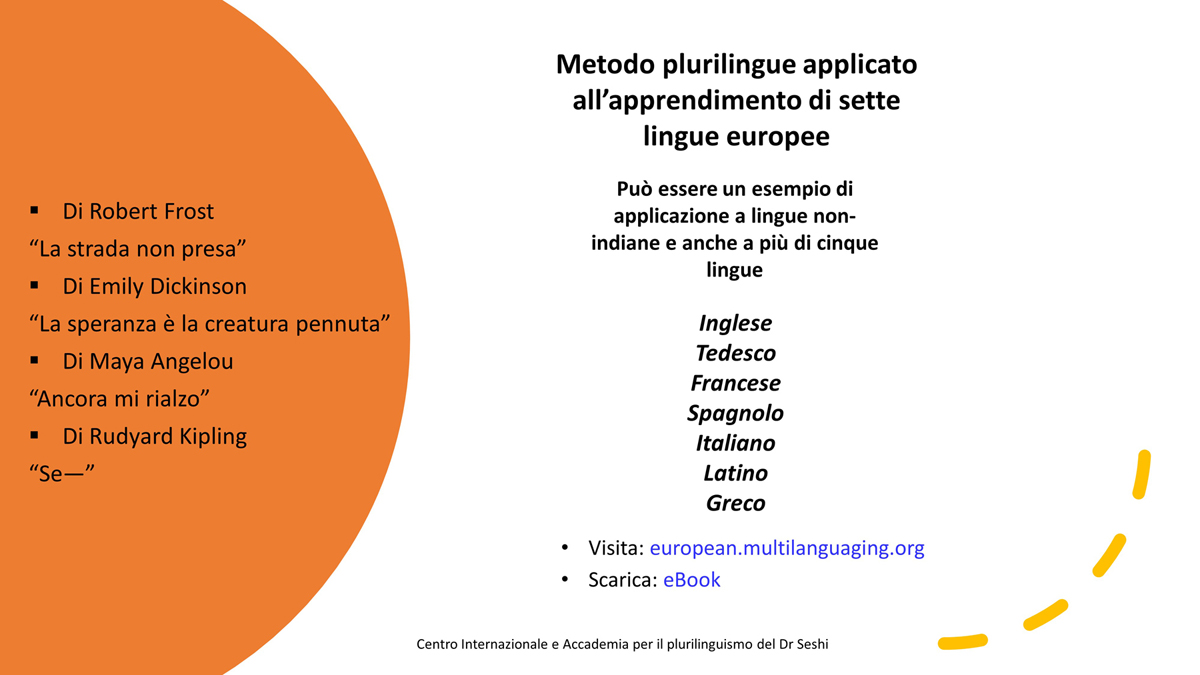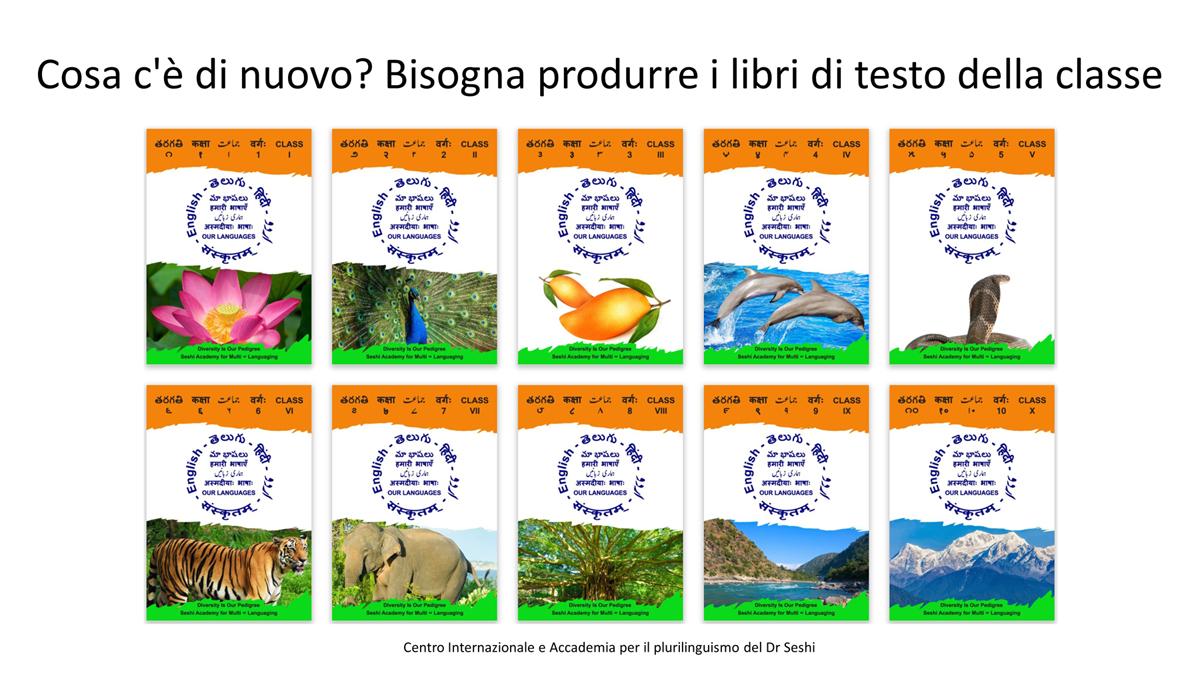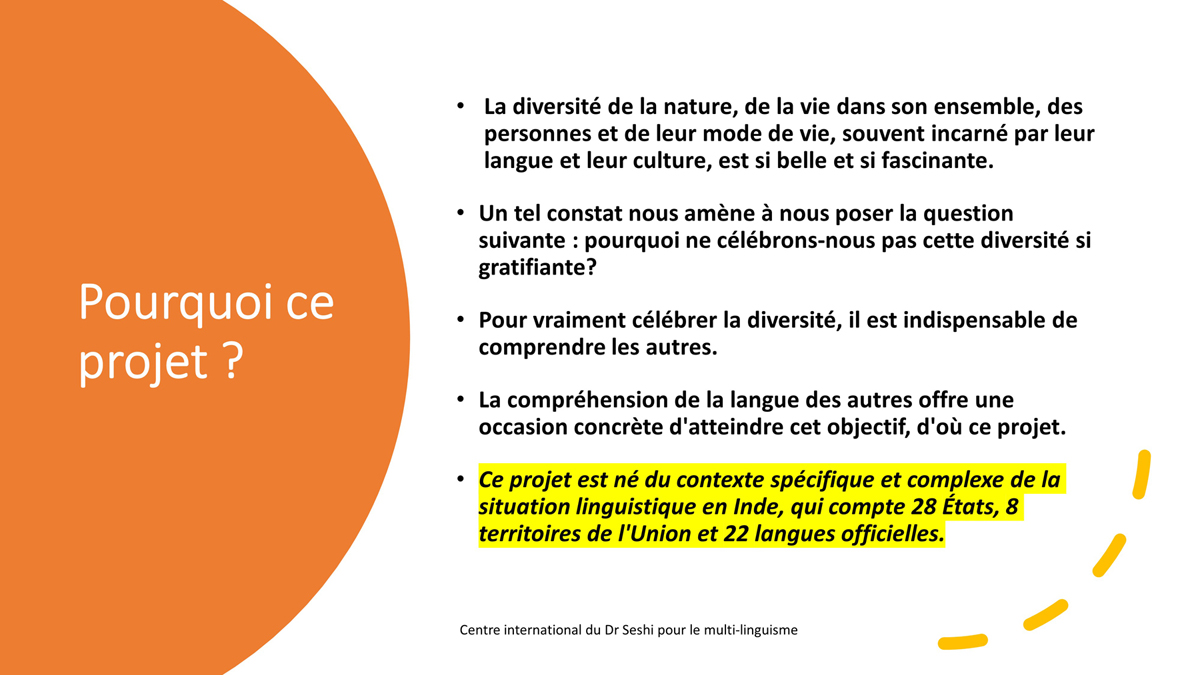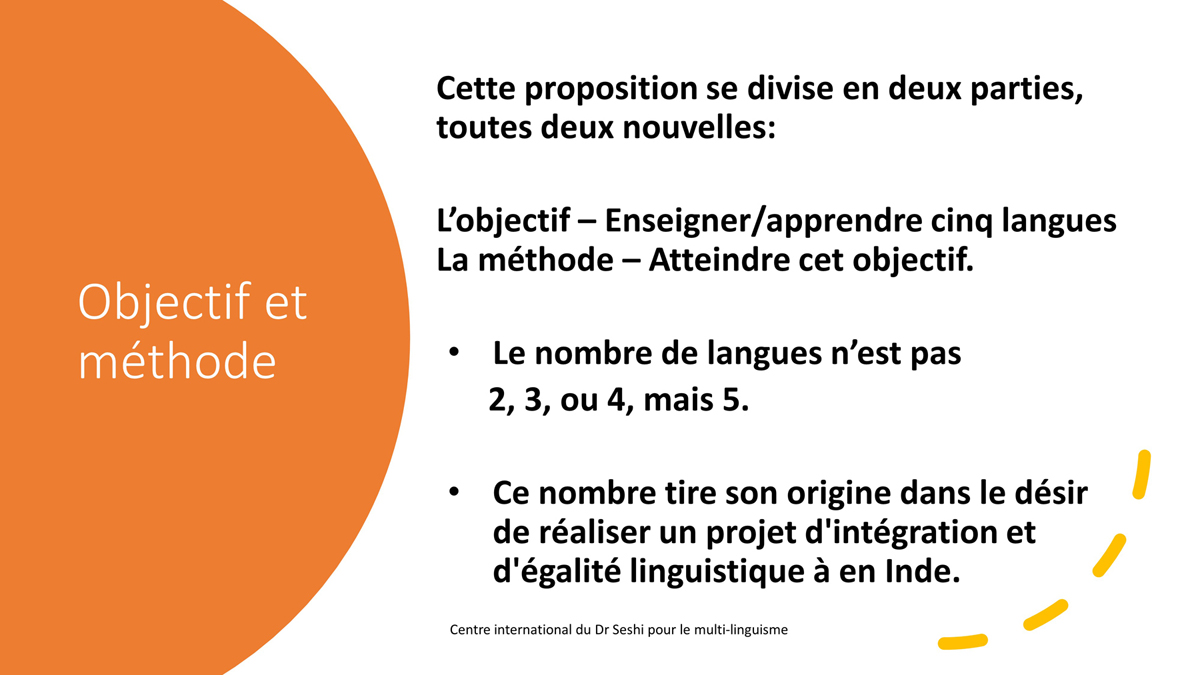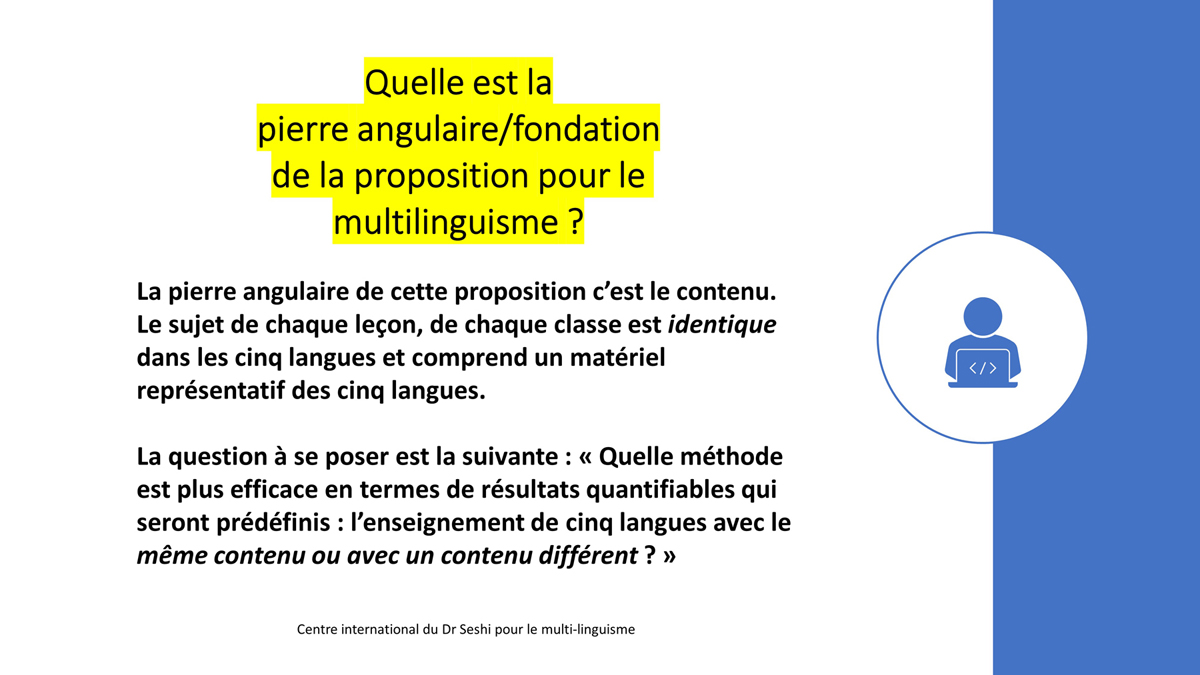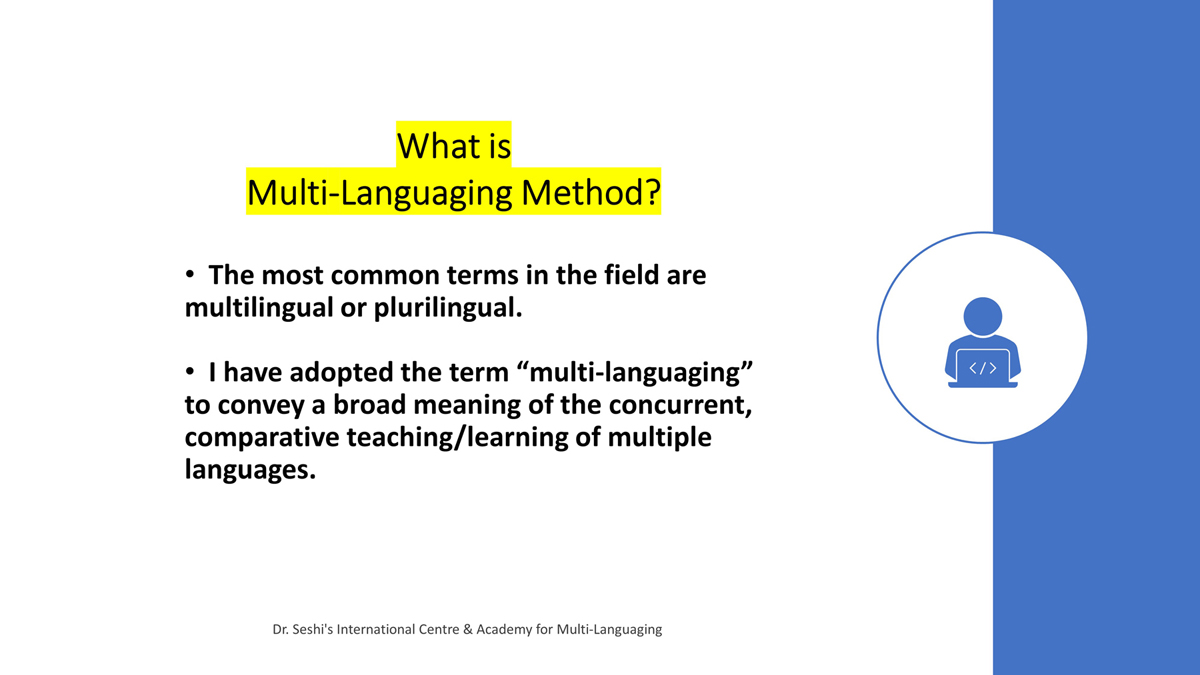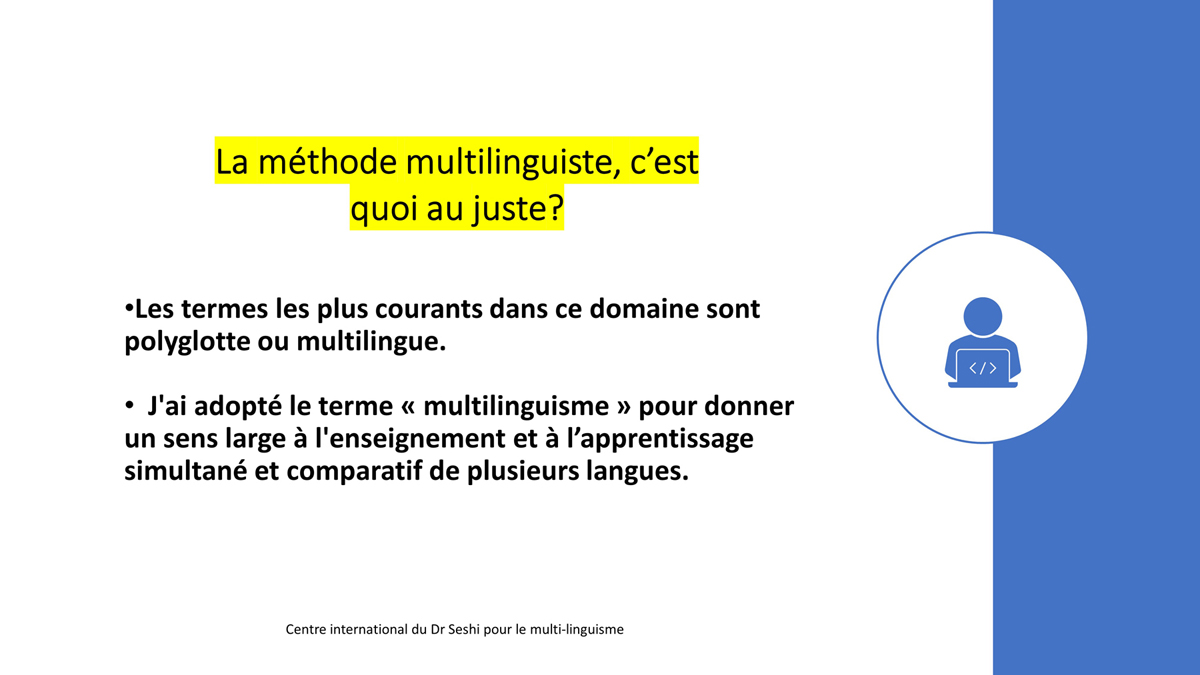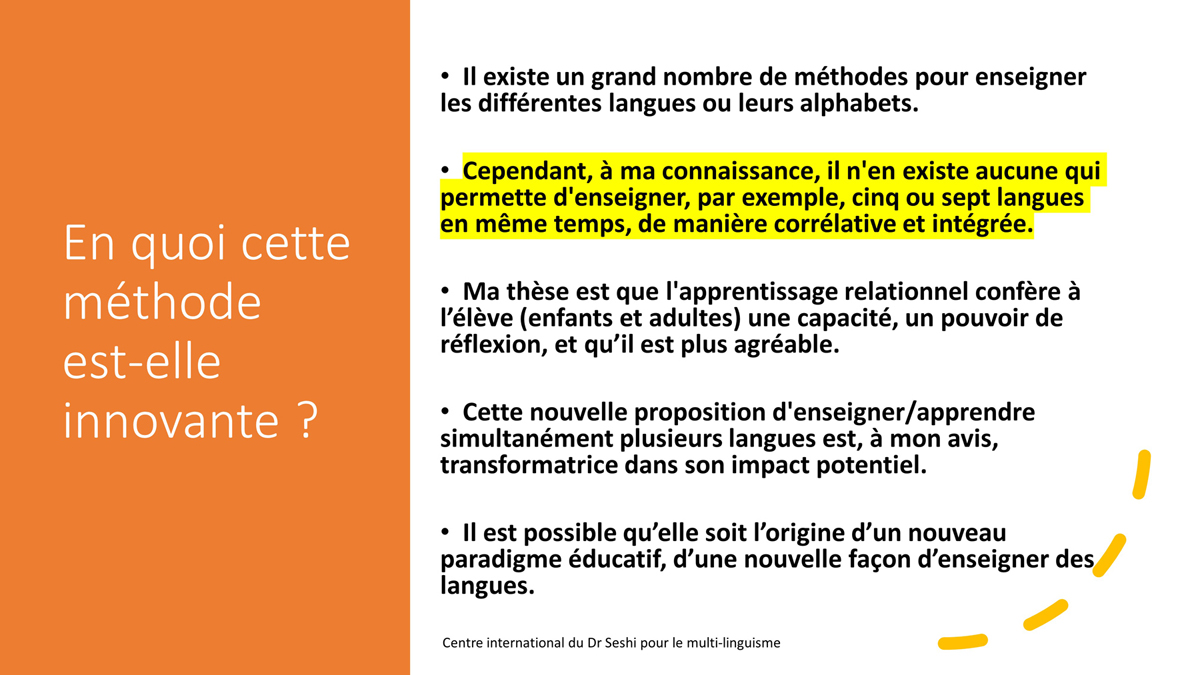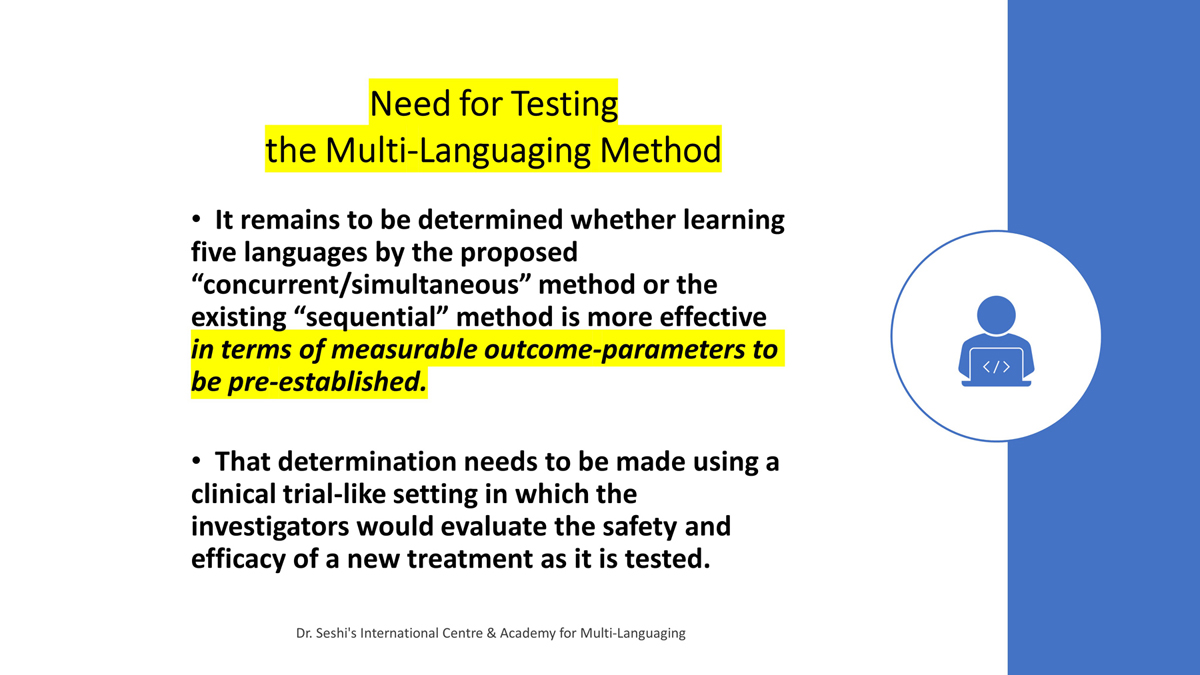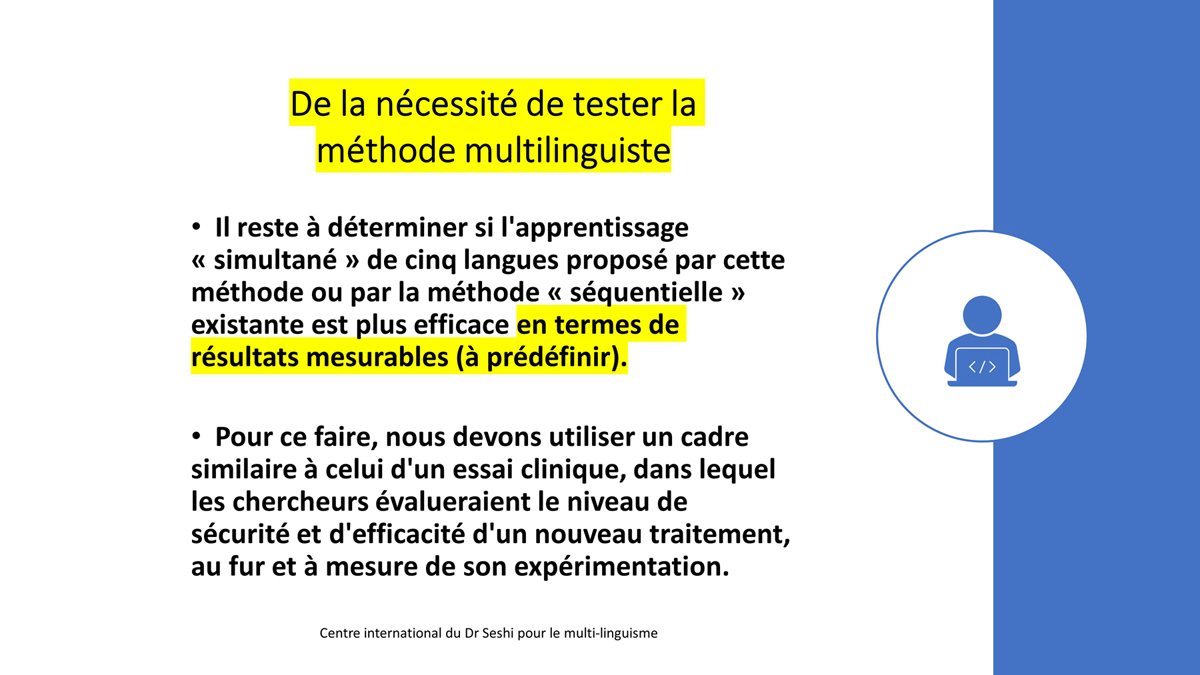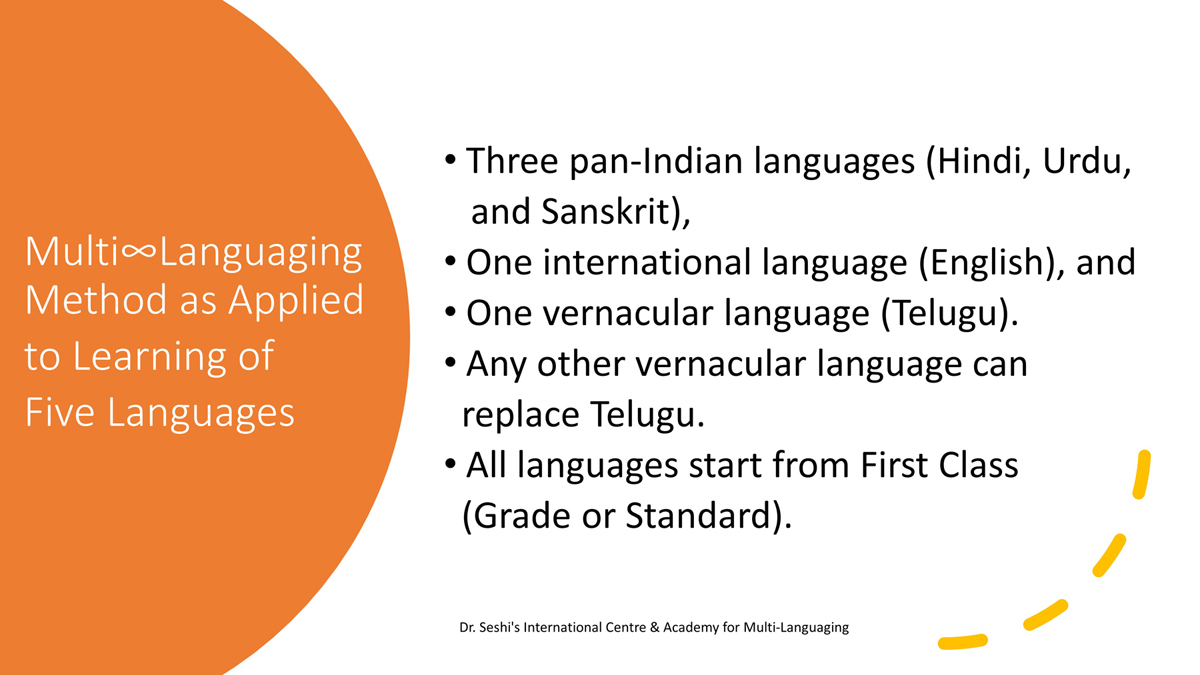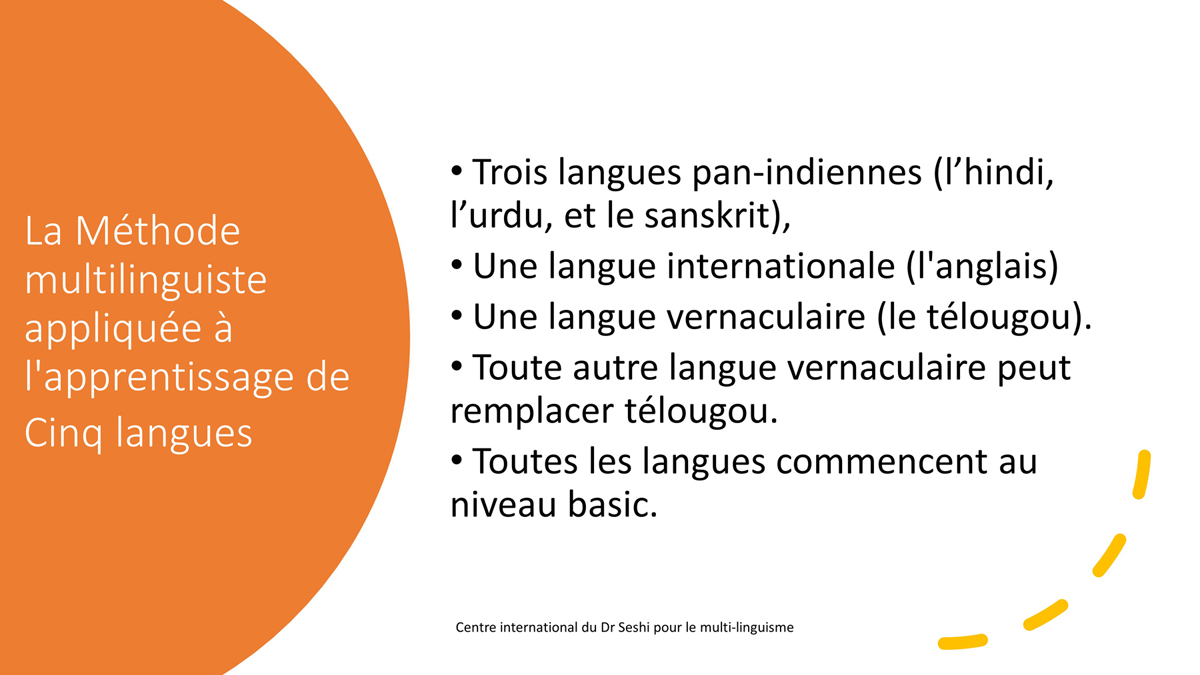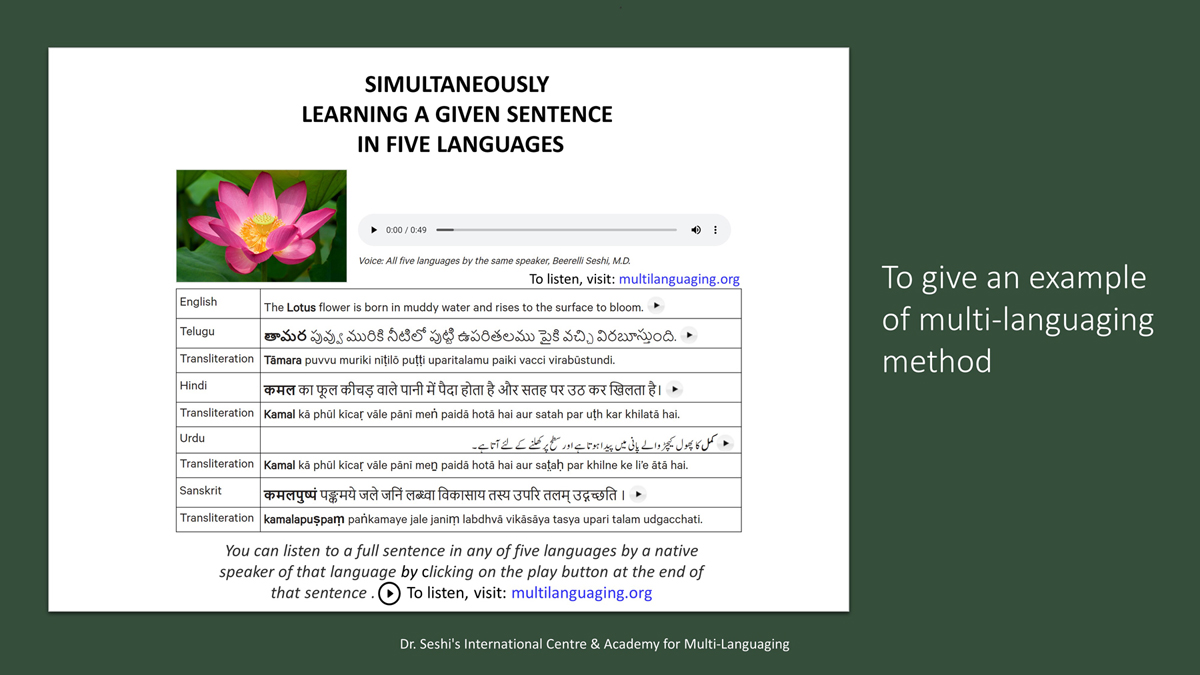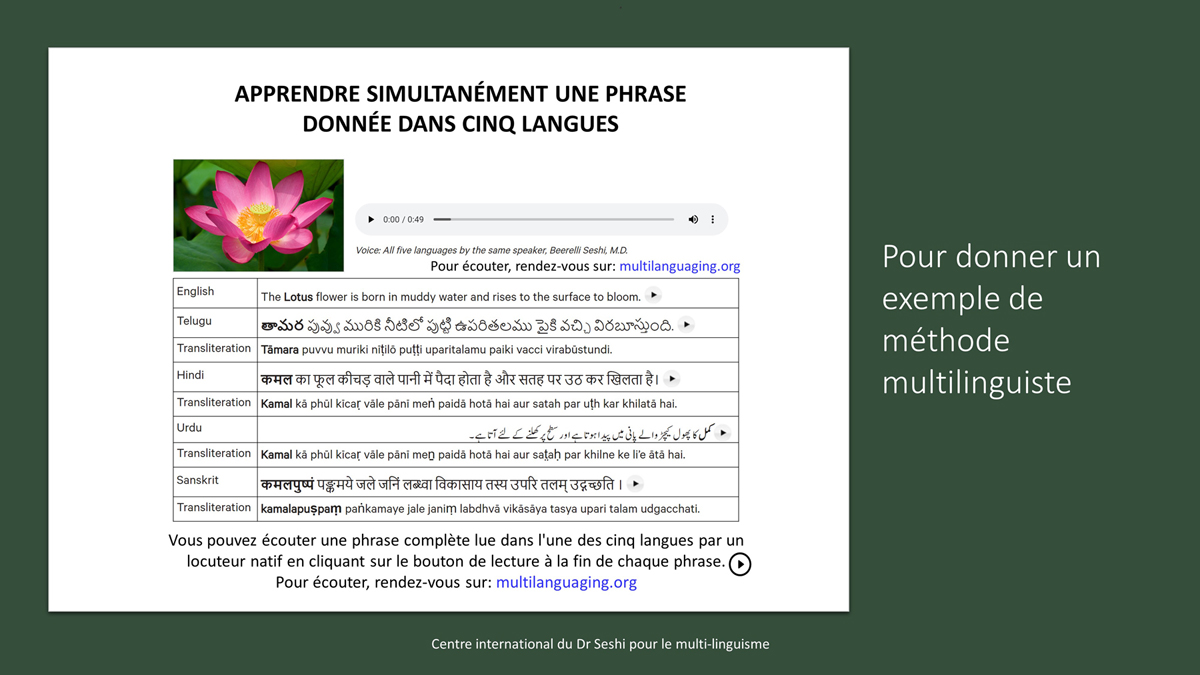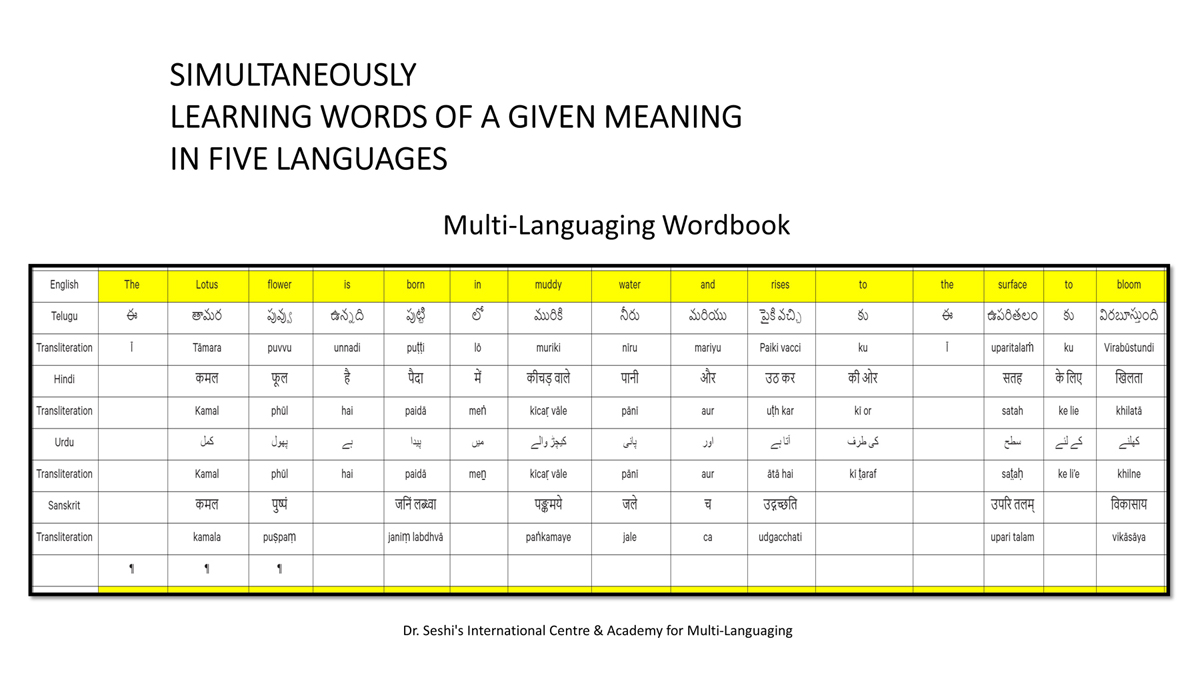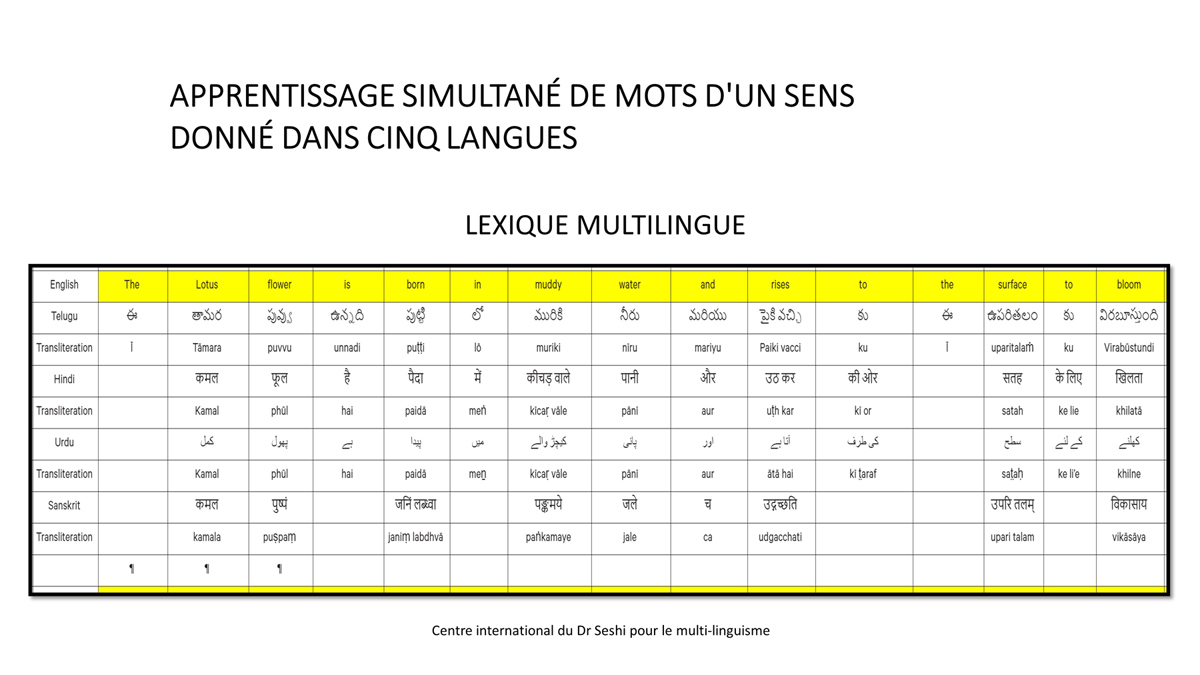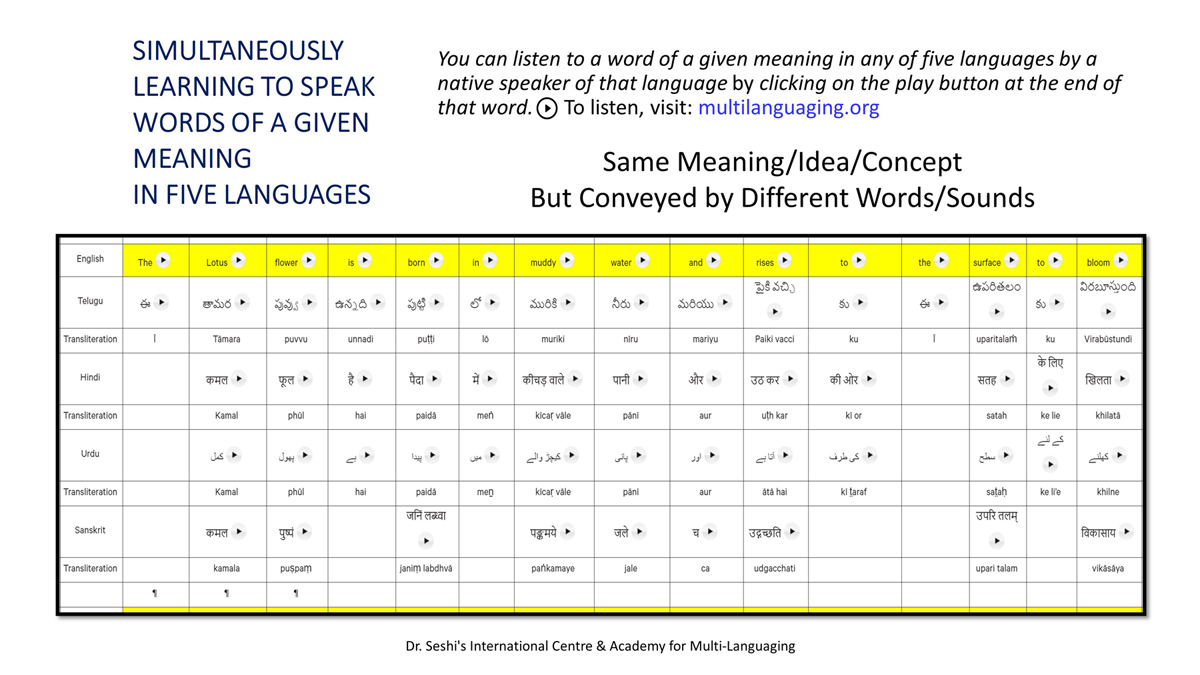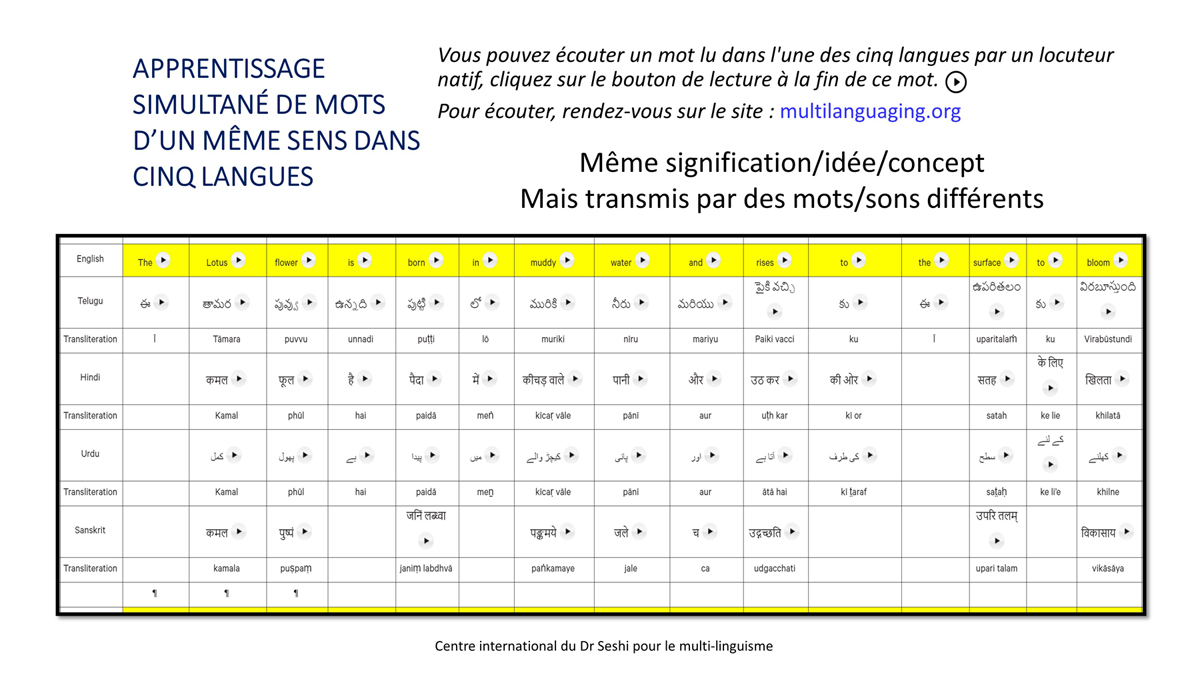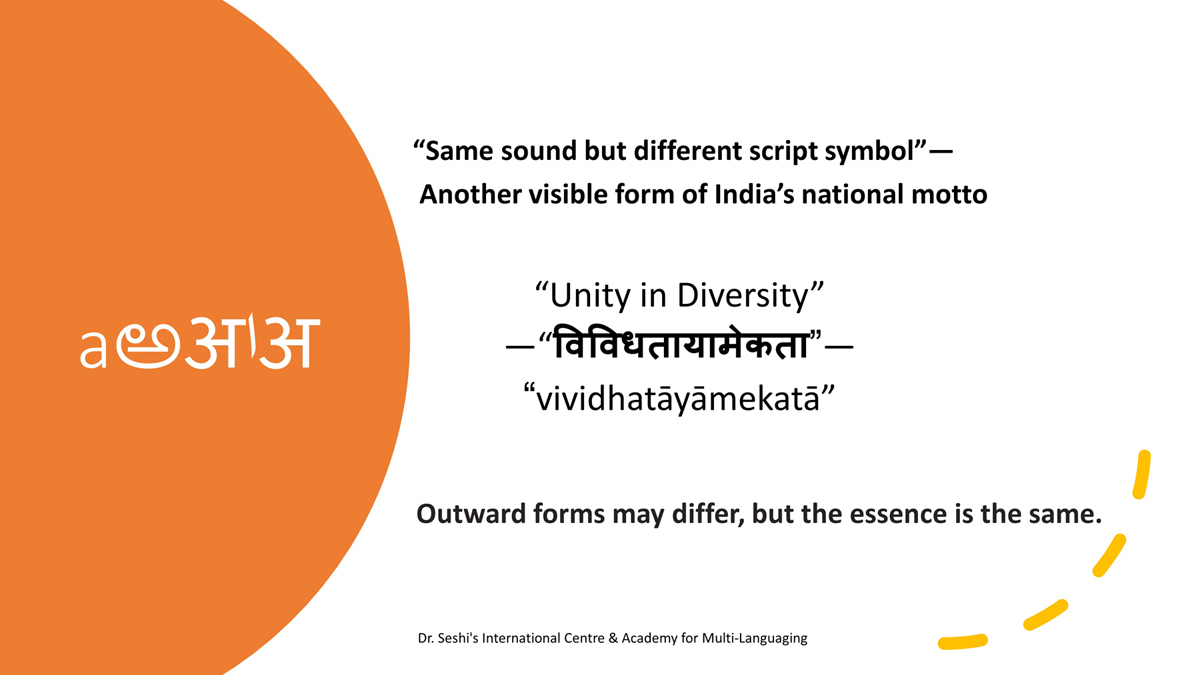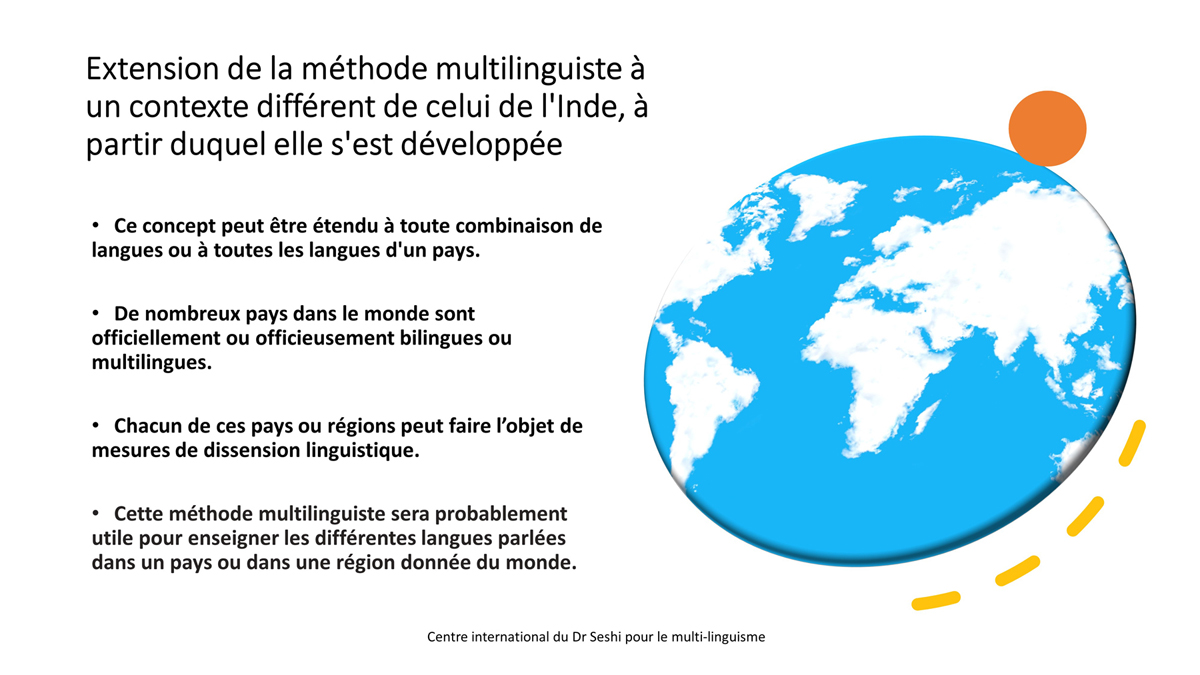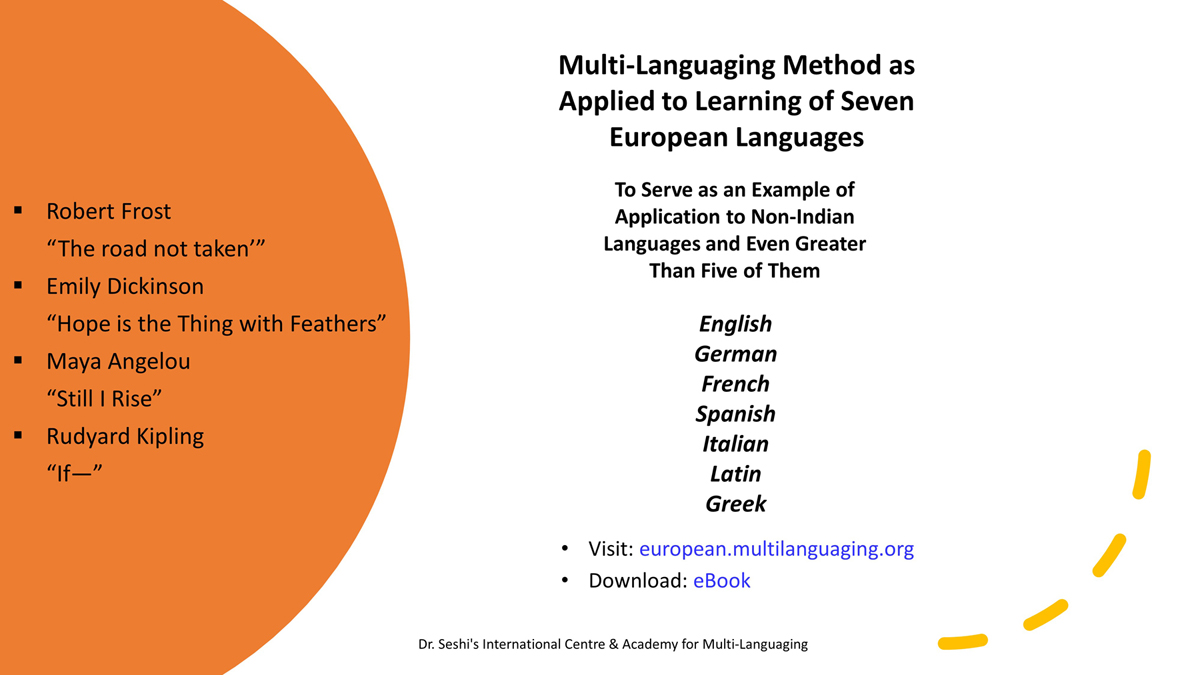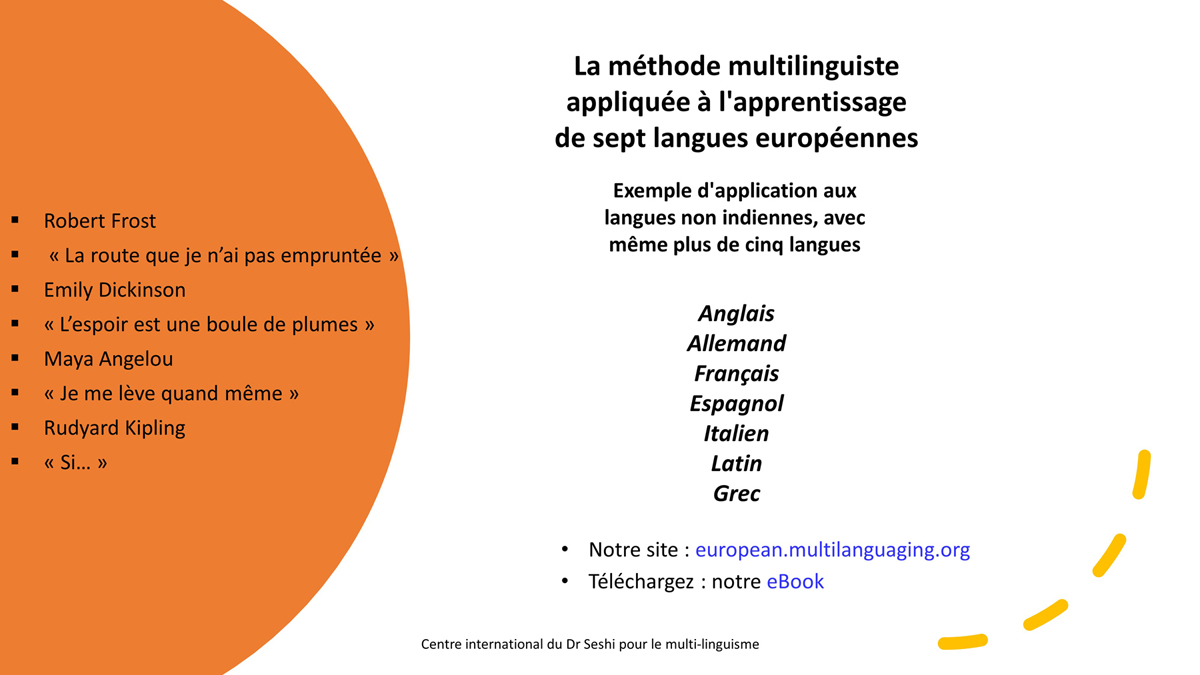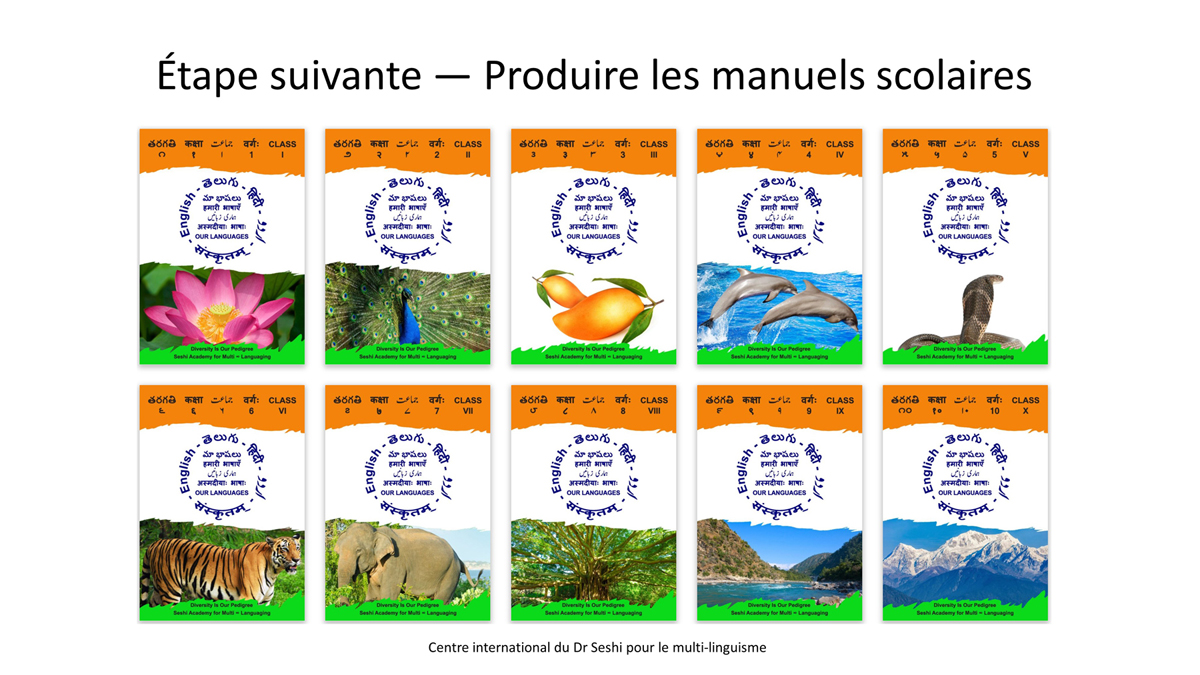Immer noch erhebe ich mich
Mehrsprachiges Arbeitsbuch
 Von Maya Angelou (1978)
Von Maya Angelou (1978)
| A | B | C | D | E | F | G | H | I | J | K | L | M | N | O | P | Q | R | ||||
| 1 | Column1 | Column2 | Column3 | Column4 | Column5 | Column6 | Column7 | Column8 | Column9 | Column10 | Column11 | Column12 | Column13 | Column14 | Column15 | Column16 | Column17 | Column18 | |||
| 2 | English | Still | I | Rise | |||||||||||||||||
| 3 | German | immer noch | ich mich | erhebe | |||||||||||||||||
| 4 | French | pourtant, | je | m’élève | |||||||||||||||||
| 5 | Spanish | aun así, | me | levanto | |||||||||||||||||
| 6 | Italian | Ancora | mi | rialzo | |||||||||||||||||
| 7 | Latin | Nihilominus | (9) | Surgo | |||||||||||||||||
| 8 | Greek | Μολαταύτα | Ανασηκώνομαι | ||||||||||||||||||
| 9 | Transliteration | Molatáfta | anasikonomai | ||||||||||||||||||
| 10 | |||||||||||||||||||||
| 11 | English | By | Maya | Angelou | (1978) | ||||||||||||||||
| 12 | German | von | Maya | Angelou | (1978) | ||||||||||||||||
| 13 | French | De | Maya | Angelou | (1978) | ||||||||||||||||
| 14 | Spanish | Por | Maya | Angelou | (1978) | ||||||||||||||||
| 15 | Italian | Di | Maya | Angelou | (1978) | ||||||||||||||||
| 16 | Latin | scripsit | Maya | Angelou | (1978) | ||||||||||||||||
| 17 | Greek | Της | Μάγιας | Αγγέλου | (1978) | ||||||||||||||||
| 18 | Transliteration | Tis | Mágias | Angélou | (1978) | ||||||||||||||||
| 19 | ¶ | ¶ | ¶ | ||||||||||||||||||
| 20 | English | You | may | write | me | down | in | history | |||||||||||||
| 21 | German | „Du | kannst | schreiben | mich | die | in | Geschichte | |||||||||||||
| 22 | French | « Vous | pouvez | (2) | me | rabaisser | dans | l’Histoire | |||||||||||||
| 23 | Spanish | Puedes | anotarme | en | la historia | ||||||||||||||||
| 24 | Italian | Puoi | svalutarmi (5) | nella | storia | ||||||||||||||||
| 25 | Latin | Potes | describere | me | (9) | in | historia | ||||||||||||||
| 26 | Greek | Μπορείς | καταγράψεις | να με | στην | ιστορία | |||||||||||||||
| 27 | Transliteration | Boreís | katagrapseis | na me | stin | istoria | |||||||||||||||
| 28 | |||||||||||||||||||||
| 29 | English | With | your | bitter, | twisted | lies, | |||||||||||||||
| 30 | German | Mit | deinen | bitteren, | verdrehten | Lügen, | |||||||||||||||
| 31 | French | Avec | vos | amers | (3) | mensonges. | |||||||||||||||
| 32 | Spanish | Con | tus | amargas, | torcidas | mentiras, | |||||||||||||||
| 33 | Italian | Con | le tue | amare | contorte | bugie, | |||||||||||||||
| 34 | Latin | Cum | tuis | acerbis, | convolutis | mendaciis, | |||||||||||||||
| 35 | Greek | Με | σου | τα πικρόχολα, | διεστραμμένα | ψεμματά | |||||||||||||||
| 36 | Transliteration | Me | sou | ta pikróchola, | diestramména | psemmatá | |||||||||||||||
| 37 | |||||||||||||||||||||
| 38 | English | You | may | trod | me | in | the | very | dirt | ||||||||||||
| 39 | German | Du | kannst | treten | mich | in | den | tiefsten | Dreck | ||||||||||||
| 40 | French | Vous | pouvez | traîner | me | dans | la | (3) | boue, | ||||||||||||
| 41 | Spanish | puedes | hollarme | en | el | fondo | del barro | ||||||||||||||
| 42 | Italian | Potresti | calpestarmi | nel | fango (6) | ||||||||||||||||
| 43 | Latin | (9) | Potes calcare | me | in | (9) | ipso | caeno | |||||||||||||
| 44 | Greek | Μπορείς | πατήσεις | να με | στο | μέχρι και | στο χώμα | ||||||||||||||
| 45 | Transliteration | Boreís | patiseis | na me | sto | mechri kai | choma | ||||||||||||||
| 46 | |||||||||||||||||||||
| 47 | English | But | still, | like | dust, | I’ll | rise. | ||||||||||||||
| 48 | German | Aber | trotzdem | wie | Staub | werde ich mich | erheben | ||||||||||||||
| 49 | French | mais | (3) | comme | la poussière, | je | m’élève. | ||||||||||||||
| 50 | Spanish | aun | así, | como | el polvo | me | levantaré, | ||||||||||||||
| 51 | Italian | Ma | lo stesso, | come | polvere, | mi | rialzerei, | ||||||||||||||
| 52 | Latin | Sed | nihilominus, | sicut | pulvis, | (9) | surgam. | ||||||||||||||
| 53 | Greek | Αλλά | και πάλι | σαν | την σκόνη | θα | ανασηκωθώ | ||||||||||||||
| 54 | Transliteration | Allá | kai pali | san | tin skóni | tha | anasikotho | ||||||||||||||
| 55 | ¶ | ¶ | ¶ | ||||||||||||||||||
| 56 | English | Does | my | sassiness | upset | you? | |||||||||||||||
| 57 | German | (1) | meine | Frechheit | verärgert | Dich? | |||||||||||||||
| 58 | French | (3) | Mes | sarcasmes | dérangent-ils ? | vous | |||||||||||||||
| 59 | Spanish | (4) | ¿Mi | descaro | te molesta? | ||||||||||||||||
| 60 | Italian | (7) | La mia | insolenza | sconvolge? | ti | |||||||||||||||
| 61 | Latin | (9) | Nonne Mea | impudentia | conturbat | te? | |||||||||||||||
| 62 | Greek | Μήπως | μου | η αυθάδεια | αναστατώνει; | σε | |||||||||||||||
| 63 | Transliteration | Mipos | mou | I afthadeia | anastatonei? | se | |||||||||||||||
| 64 | |||||||||||||||||||||
| 65 | English | Why | are | you | beset | with | gloom? | ||||||||||||||
| 66 | German | Warum | bist | du | geplagt | von | Finsternis | ||||||||||||||
| 67 | French | Pourquoi | êtes | -vous | assailli | par | la morosité ? | ||||||||||||||
| 68 | Spanish | ¿Porqué estás | quieto, | con | pesadumbre? | ||||||||||||||||
| 69 | Italian | Perchè | sei | assillato | dall’ | oscurità? | |||||||||||||||
| 70 | Latin | Cur | (9) | vexaris | (9) | tristitia? | |||||||||||||||
| 71 | Greek | Γιατί | σε | πιλατεύει | η | κατήφεια; | |||||||||||||||
| 72 | Transliteration | Giatí | se | pilatevei | katífeia? | ||||||||||||||||
| 73 | |||||||||||||||||||||
| 74 | English | ‘Cause | I | walk | like | I’ve | got | oil | wells | ||||||||||||
| 75 | German | Weil | ich | gehe | als | ich | hätte | Quellen | |||||||||||||
| 76 | French | Parce que | je | marche | comme si | j’avais | de pétrole | des puits | |||||||||||||
| 77 | Spanish | Porque | (4) | camino | como | si fuera | dueña | de petroleros | pozos | ||||||||||||
| 78 | Italian | Perchè | (7) | cammino | come | se | avessi | di petrolio | pozzi | ||||||||||||
| 79 | Latin | Quod | (9) | ambulo | quasi | (9) | habeam | olei | puteos | ||||||||||||
| 80 | Greek | Γιατί | περπατώ | λες και | έχω | πετρελαιοπηγές | |||||||||||||||
| 81 | Transliteration | Giatí | perpato | les kai | écho | petrelaiopigés | |||||||||||||||
| 82 | |||||||||||||||||||||
| 83 | English | Pumping | in | my | living | room. | |||||||||||||||
| 84 | German | Pumpen | in | meinem | Wohn | Zimmer. | |||||||||||||||
| 85 | French | (3) | dans | ma | salle | à manger ? | |||||||||||||||
| 86 | Spanish | bombeando | en | mi | sala | de estar. | |||||||||||||||
| 87 | Italian | che pompano | nel | mio | soggiorno. | ||||||||||||||||
| 88 | Latin | Exhaurientes | in | meo | exedrio. | ||||||||||||||||
| 89 | Greek | Οι οποίες αντλούνται | στο | μου | σαλόνι | ||||||||||||||||
| 90 | Transliteration | Oi opies antlountai | sto | mou | salóni | ||||||||||||||||
| 91 | ¶ | ¶ | ¶ | ||||||||||||||||||
| 92 | English | Just | like | moons | and | like | suns, | ||||||||||||||
| 93 | German | Genau | wie | Monde | und | wie | Sonnen, | ||||||||||||||
| 94 | French | Tout | comme | la lune | et | (3) | le soleil, | ||||||||||||||
| 95 | Spanish | (4) | Como | lunas | y | como | soles, | ||||||||||||||
| 96 | Italian | Proprio | come | le lune | e | come | i soli, | ||||||||||||||
| 97 | Latin | Sic | ut | lunae | et | ut | soles, | ||||||||||||||
| 98 | Greek | Σαν | τα φεγγάρια | και | τους ήλιους | ||||||||||||||||
| 99 | Transliteration | San | ta feggaria | kai | tous ilious | ||||||||||||||||
| 100 | |||||||||||||||||||||
| 101 | English | With | the | certainty | of | tides, | |||||||||||||||
| 102 | German | Mit | der | Gewissheit | der | Gezeiten | |||||||||||||||
| 103 | French | avec | la | certitude | des | marées, | |||||||||||||||
| 104 | Spanish | Con | la | certeza | de | las mareas, | |||||||||||||||
| 105 | Italian | Con | la | certezza | delle | maree, | |||||||||||||||
| 106 | Latin | Cum | (9) | certitudine | (9) | aestuum, | |||||||||||||||
| 107 | Greek | Με | την | σιγουριά | των | παλιρροιών | |||||||||||||||
| 108 | Transliteration | Me | tin | sigouriá | ton | palirroión | |||||||||||||||
| 109 | |||||||||||||||||||||
| 110 | English | Just | like | hopes | springing | high, | |||||||||||||||
| 111 | German | Genau | Hoffnungen | wie | große | ||||||||||||||||
| 112 | French | tel | un espoir | qui naît, | |||||||||||||||||
| 113 | Spanish | (4) | Como | las esperanzas | brincando | alto, | |||||||||||||||
| 114 | Italian | Proprio | come | le speranze | che balzano | in alto, | |||||||||||||||
| 115 | Latin | Sic | ut | spes | salientes | alte, | |||||||||||||||
| 116 | Greek | Σαν | τις ελπίδες | που αναβλύζουν | ψηλά, | ||||||||||||||||
| 117 | Transliteration | San | tis elpides | pou anavlyzoun | psila, | ||||||||||||||||
| 118 | |||||||||||||||||||||
| 119 | English | Still | I’ll | rise. | |||||||||||||||||
| 120 | German | Immer noch | Ich werde mich | erheben | |||||||||||||||||
| 121 | French | (3) | je | m’élèverai. | |||||||||||||||||
| 122 | Spanish | Aun así, | yo me | levantaré. | |||||||||||||||||
| 123 | Italian | Ancora | mi | rialzerò. | |||||||||||||||||
| 124 | Latin | Nihilominus | (9) | surgam. | |||||||||||||||||
| 125 | Greek | Και πάλι | θα | ανασηκωθώ. | |||||||||||||||||
| 126 | Transliteration | Kai pali | tha | anasikotho. | |||||||||||||||||
| 127 | ¶ | ¶ | ¶ | ||||||||||||||||||
| 128 | English | Did | you | want | to | see | me | broken? | |||||||||||||
| 129 | German | du | wolltest | sehen | mich | gebrochen? | |||||||||||||||
| 130 | French | (3) | Vous | vouliez | voir | me | brisée ? | ||||||||||||||
| 131 | Spanish | (4) | Quieres | ver | me | destrozada? | |||||||||||||||
| 132 | Italian | Volevi | vedermi | a pezzi? | |||||||||||||||||
| 133 | Latin | (9) | Nonne voluisti | (9) | videre | me | fractam? | ||||||||||||||
| 134 | Greek | Ήθελες | να | δεις | με | καταρρακωμένη; | |||||||||||||||
| 135 | Transliteration | Itheles | na | deis | me | katarakomeni? | |||||||||||||||
| 136 | |||||||||||||||||||||
| 137 | English | Bowed | head | and | lowered | eyes? | |||||||||||||||
| 138 | German | Mit gebeugtem | Kopf | und | gesenkten | Augen? | |||||||||||||||
| 139 | French | baissée, | Tête | (3) | fuyant ? | le regard | |||||||||||||||
| 140 | Spanish | Agachada | cabeza | y | bajos | ojos? | |||||||||||||||
| 141 | Italian | china | Testa | e | abbassati | occhi? | |||||||||||||||
| 142 | Latin | Flexum | caput | et | demissos | oculos? | |||||||||||||||
| 143 | Greek | Με σκυμμένο | το κεφάλι | και | με χαμηλωμένο | το βλέμμα; | |||||||||||||||
| 144 | Transliteration | Skymmeno | kefali | kai | me chamilomeno | to vlemma? | |||||||||||||||
| 145 | |||||||||||||||||||||
| 146 | English | Shoulders | falling | down | like | teardrops, | |||||||||||||||
| 147 | German | Schultern | fallen | herab | die wie | Tränen, | |||||||||||||||
| 148 | French | Les épaules | tombantes | comme | des larmes, | ||||||||||||||||
| 149 | Spanish | Hombros | caídos | como | lágrimas, | ||||||||||||||||
| 150 | Italian | Spalle | che cadono | (7) | come | lacrime, | |||||||||||||||
| 151 | Latin | Humeros | delabentes | (9) | sicut | lacrimas, | |||||||||||||||
| 152 | Greek | Με τους ώμους | σκυφτούς | σαν | δάκρυα; | ||||||||||||||||
| 153 | Transliteration | Me tous omous | skyftous | san | dakrya? | ||||||||||||||||
| 154 | |||||||||||||||||||||
| 155 | English | Weakened | by | my | soulful | cries? | |||||||||||||||
| 156 | German | Geschwächt | von | meinem | seelenvollen | Schreien? | |||||||||||||||
| 157 | French | Affaiblie | par | mes | (3) | pleures ? | |||||||||||||||
| 158 | Spanish | ¿Debilitados | por | mi | desconsolado | llanto? | |||||||||||||||
| 159 | Italian | Indebolita | dalle | mie | di dolore | grida? | |||||||||||||||
| 160 | Latin | Debilitatos | (9) | meis | profundis | clamoribus? | |||||||||||||||
| 161 | Greek | Αποδυναμωμένη | από | μου | τις ολόψυχες | κραυγές; | |||||||||||||||
| 162 | Transliteration | Apodynamoméni | apó | mou | tis olopsyches | kravges? | |||||||||||||||
| 163 | ¶ | ¶ | ¶ | ||||||||||||||||||
| 164 | English | Does | my | haughtiness | offend | you? | |||||||||||||||
| 165 | German | (1) | mein | Hochmut | beleidigen | dich? | |||||||||||||||
| 166 | French | (3) | Mon | arrogance | offense-t-elle ? | vous | |||||||||||||||
| 167 | Spanish | (4) | ¿Mi | arrogancia | ofende | te? | |||||||||||||||
| 168 | Italian | (7) | La mia | arroganza | offende | ti? | |||||||||||||||
| 169 | Latin | (9) | Mea | superbia | Nonne offendit | te? | |||||||||||||||
| 170 | Greek | Μήπως | μου | η ακαταδεξιά | προσβάλλει; | σε | |||||||||||||||
| 171 | Transliteration | Mipos | mou | I akatexia | prosvállei? | se | |||||||||||||||
| 172 | |||||||||||||||||||||
| 173 | English | Don’t | you | take | it | awful | hard | ||||||||||||||
| 174 | German | nicht | (1) | Nimm | es | zu schwer | |||||||||||||||
| 175 | French | Ne | prenez | le | pas mal | ||||||||||||||||
| 176 | Spanish | No | (4) | tomes | lo | tan | fuerte | ||||||||||||||
| 177 | Italian | Non | (7) | prenderdetela | male | troppo | |||||||||||||||
| 178 | Latin | Noli | (9) | praeter | id | modum | irasci | ||||||||||||||
| 179 | Greek | Μήν | το παίρνεις | και πολύ | βαριά | ||||||||||||||||
| 180 | Transliteration | Mín | to paírneis | kai poly | varia | ||||||||||||||||
| 181 | |||||||||||||||||||||
| 182 | English | ‘Cause | I | laugh | like | I’ve | got | gold | mines | ||||||||||||
| 183 | German | Weil | ich | lache | als | ich | hätte | Gold | minen | ||||||||||||
| 184 | French | Parce que | je | ris | comme si | j’avais | d’or | des mines | |||||||||||||
| 185 | Spanish | Porque | yo | río | como | si | tuviera | doradas | minas | ||||||||||||
| 186 | Italian | Perchè | rido | come | se avessi | d’oro | miniere | ||||||||||||||
| 187 | Latin | Quod | (9) | rideo | quasi | (9) | inveni | aurifodinas | |||||||||||||
| 188 | Greek | Γιατί | γελάω | λες και | έχω | χρυσού | ορυχεία | ||||||||||||||
| 189 | Transliteration | Giati | gelao | les kai | echo | chrysou | orycheía | ||||||||||||||
| 190 | |||||||||||||||||||||
| 191 | English | Diggin’ | in | my | own | backyard. | |||||||||||||||
| 192 | German | graben | in | meinem | eigenen | Garten. | |||||||||||||||
| 193 | French | (3) | dans | mon | (3) | jardin. | |||||||||||||||
| 194 | Spanish | excavándose | en | mi | propio | patio de casa. | |||||||||||||||
| 195 | Italian | Scavando | nel | mio | (7) | cortile. | |||||||||||||||
| 196 | Latin | fodiens | in | meae | propriae | domus area. | |||||||||||||||
| 197 | Greek | Να σκάπτονται | στην | μου | πίσω αυλή | ||||||||||||||||
| 198 | Transliteration | Na skaptontai | stin | mou | piso avli | ||||||||||||||||
| 199 | ¶ | ¶ | ¶ | ||||||||||||||||||
| 200 | English | You | may | shoot | me | with | your | words, | |||||||||||||
| 201 | German | Du | könntest | erschießen | mich | mit | deinen | Worten, | |||||||||||||
| 202 | French | Vous | pouvez | m’abattre | avec | (3) | des mots, | ||||||||||||||
| 203 | Spanish | puedes | dispararme | con | tus | palabras, | |||||||||||||||
| 204 | Italian | Puoi | spararmi | con | le tue | parole, | |||||||||||||||
| 205 | Latin | (9) | Potes transfigere | me | (9) | tuis | verbis, | ||||||||||||||
| 206 | Greek | Μπορείς | πυροβολήσεις | να με | με τα | σου, | λόγια | ||||||||||||||
| 207 | Transliteration | Boreís | pyrovolisis | na me | me ta | sou, | logia | ||||||||||||||
| 208 | |||||||||||||||||||||
| 209 | English | You | may | cut | me | with | your | eyes, | |||||||||||||
| 210 | German | (1) | zerschneiden | mich | mit | deinen | Augen, | ||||||||||||||
| 211 | French | Vous | pouvez | découper | me | du | (3) | regard, | |||||||||||||
| 212 | Spanish | puedes | herirme | con | tus | ojos, | |||||||||||||||
| 213 | Italian | Puoi | tagliarmi | con | i tuoi | occhi, | |||||||||||||||
| 214 | Latin | (9) | Incidere | me | (9) | tuis | oculis, | ||||||||||||||
| 215 | Greek | Μπορείς | κόψεις | να με | με τα | σου, | μάτια | ||||||||||||||
| 216 | Transliteration | Boreís | kopseis | na me | me ta | sou, | matia | ||||||||||||||
| 217 | |||||||||||||||||||||
| 218 | English | You | may | kill | me | with | your | hatefulness, | |||||||||||||
| 219 | German | Du | könntest | töten | mich | mit | deinem | Hass, | |||||||||||||
| 220 | French | (3) | tuer | Me | de | votre | toute haine | ||||||||||||||
| 221 | Spanish | puedes | matarme | con | tu | odio, | |||||||||||||||
| 222 | Italian | Puoi | uccidermi | con | il tuo | odio, | |||||||||||||||
| 223 | Latin | (9) | Potes interficere | me | (9) | tuo | odio, | ||||||||||||||
| 224 | Greek | Μπορείς | σκοτώσεις | να με | με το | σου, | μίσος | ||||||||||||||
| 225 | Transliteration | Boreís | skotoseis | na me | me ta | sou, | misos | ||||||||||||||
| 226 | |||||||||||||||||||||
| 227 | English | But | still, | like | air, | I’ll | rise. | ||||||||||||||
| 228 | German | Aber | trotzdem | wie | Luft, | ich werde mich | erheben. | ||||||||||||||
| 229 | French | Mais | (3) | comme | l’air, | je | m’élève. | ||||||||||||||
| 230 | Spanish | aun así, | como | el aire, | me | levanto. | |||||||||||||||
| 231 | Italian | Ma | lo stesso, | come | l’aria, | mi | rialzerò. | ||||||||||||||
| 232 | Latin | Sed | nihilominus, | sicut | aer, | (9) | surgam. | ||||||||||||||
| 233 | Greek | Αλλά | και πάλι | σαν τον | αέρα, | θα | ανασηκωθώ. | ||||||||||||||
| 234 | Transliteration | Alla | kai pali | san ton | aera, | tha | anasikotho. | ||||||||||||||
| 235 | ¶ | ¶ | ¶ | ||||||||||||||||||
| 236 | English | Does | my | sexiness | upset | you? | |||||||||||||||
| 237 | German | (1) | meine | Sexualität | verärgert | dich? | |||||||||||||||
| 238 | French | (3) | Ma | sensualité | dérange-t-elle ? | vous | |||||||||||||||
| 239 | Spanish | (4) | ¿Mi | sensualidad | molesta? | te | |||||||||||||||
| 240 | Italian | (7) | La mia | sensualità | disturba? | ti | |||||||||||||||
| 241 | Latin | (9) | Mea | sensualitas | Nonne conturbat | te? | |||||||||||||||
| 242 | Greek | Μήπως | μου | η σεξουαλικότητά | σε αναστατώνει; | ||||||||||||||||
| 243 | Transliteration | Mipos | mou | I sexoualikotita | se anastatonei? | ||||||||||||||||
| 244 | |||||||||||||||||||||
| 245 | English | Does | it | come | as | a | surprise | ||||||||||||||
| 246 | German | (1) | es | kommt | (1) | überraschend | |||||||||||||||
| 247 | French | Est-ce | (3) | si | (3) | surprenant | |||||||||||||||
| 248 | Spanish | (4) | ¿Surge | como | una | sorpresa? | |||||||||||||||
| 249 | Italian | (7) | Ti giunge | come | una | sorpresa | |||||||||||||||
| 250 | Latin | (9) | Nonne tibi est | (9) | mirum | ||||||||||||||||
| 251 | Greek | (10) | Σε εκπλήσσει | ||||||||||||||||||
| 252 | Transliteration | Se ekplissei | |||||||||||||||||||
| 253 | |||||||||||||||||||||
| 254 | English | That | I | dance | like | I’ve | got | diamonds | |||||||||||||
| 255 | German | Dass | ich | tanze | als | ich | hätte | Diamanten | |||||||||||||
| 256 | French | que | je | danse | comme | si | j’avais | des diamants | |||||||||||||
| 257 | Spanish | que | yo | baile | como | si | tuviera | diamantes | |||||||||||||
| 258 | Italian | Che | (7) | ballo | come | se avessi | diamanti | ||||||||||||||
| 259 | Latin | (9) | me | saltare | quasi | (9) | habeam | adamantes | |||||||||||||
| 260 | Greek | Που | χορεύω | λες | και έχω | διαμάντια | |||||||||||||||
| 261 | Transliteration | Pou | chorévo | les | kai echo | diamantia | |||||||||||||||
| 262 | |||||||||||||||||||||
| 263 | English | At | the | meeting | of | my | thighs? | ||||||||||||||
| 264 | German | Wenn sich | treffen | (1) | meine | Oberschenkel? | |||||||||||||||
| 265 | French | à | la | jointure | de | mes | cuisses ? | ||||||||||||||
| 266 | Spanish | ahí, donde | se | encuentran | (4) | mis | muslos? | ||||||||||||||
| 267 | Italian | Al | (7) | congiungersi | delle | mie | coscie? | ||||||||||||||
| 268 | Latin | Ad | commissuras | (9) | meorum | femorum? | |||||||||||||||
| 269 | Greek | Εκεί | που συναντώνται | οι | μου; | μηροί | |||||||||||||||
| 270 | Transliteration | Ekei | pou synantontai | oi | mou? | miri | |||||||||||||||
| 271 | ¶ | ¶ | ¶ | ||||||||||||||||||
| 272 | English | Out | of | the | huts | of | history’s | shame | |||||||||||||
| 273 | German | Aus | (1) | den | Hütten | der | Geschichte | der Schande | |||||||||||||
| 274 | French | Face | aux | (3) | pires | de | l’Hitoire | hontes | |||||||||||||
| 275 | Spanish | de | las | barracas | de | la histórica | vergüenza | ||||||||||||||
| 276 | Italian | Fuori | dalle | (7) | capanne | della | della storia | vergogna | |||||||||||||
| 277 | Latin | Ex | (9) | casis | (9) | historiae | dedecoris | ||||||||||||||
| 278 | Greek | Μέσα | από | τα | καλύβια | της | ιστορίας | της ντροπής | |||||||||||||
| 279 | Transliteration | Mesa | apo | ta | kalyvia | tis | istorías | tis ntropis | |||||||||||||
| 280 | |||||||||||||||||||||
| 281 | English | I | rise | ||||||||||||||||||
| 282 | German | Ich | erhebe mich | ||||||||||||||||||
| 283 | French | Je | m’élève | ||||||||||||||||||
| 284 | Spanish | me | levanto | ||||||||||||||||||
| 285 | Italian | Io | mi rialzo | ||||||||||||||||||
| 286 | Latin | (9) | surgo. | ||||||||||||||||||
| 287 | Greek | Ανασηκώνομαι | |||||||||||||||||||
| 288 | Transliteration | Anasikonomai | |||||||||||||||||||
| 289 | |||||||||||||||||||||
| 290 | English | Up | from | a | past | that’s | rooted | in | pain | ||||||||||||
| 291 | German | Heruas | aus | einer | Vergangenheit | (1) | schmerzhaften | ||||||||||||||
| 292 | French | Surgissant | d’un | passé | (3) | rempli | de | douleur | |||||||||||||
| 293 | Spanish | desde | el | pasado | (4) | enraizado | en | dolor | |||||||||||||
| 294 | Italian | Su | un | passato | (7) | radicato | nel | dolore | |||||||||||||
| 295 | Latin | Sursum | ex | (9) | praeterito | cuius sunt | radices | in | dolore | ||||||||||||
| 296 | Greek | Μέσα | από | ένα | παρελθόν | που έχει | ρίζες | στον | πόνο | ||||||||||||
| 297 | Transliteration | Mesa | apo | ena | parelton | pou echei | rizes | ston | pono | ||||||||||||
| 298 | |||||||||||||||||||||
| 299 | English | I | rise | ||||||||||||||||||
| 300 | German | Ich | erhebe mich | ||||||||||||||||||
| 301 | French | Je | m’élève | ||||||||||||||||||
| 302 | Spanish | me | levanto | ||||||||||||||||||
| 303 | Italian | Io | mi rialzo | ||||||||||||||||||
| 304 | Latin | (9) | surgo | ||||||||||||||||||
| 305 | Greek | Ανασηκώνομαι | |||||||||||||||||||
| 306 | Transliteration | Anasikonomai | |||||||||||||||||||
| 307 | |||||||||||||||||||||
| 308 | English | I’m | a | black | ocean, | leaping | and | wide, | |||||||||||||
| 309 | German | Ich bin | ein | schwarzer | Ozean, | hüpfend | und | weit. | |||||||||||||
| 310 | French | Je suis | un | noir, | océan | bondissant, | et | large | |||||||||||||
| 311 | Spanish | soy | un | negro | océano, | inquieto | y | amplio, | |||||||||||||
| 312 | Italian | Sono | un | nero | oceano, | agitato | e | ampio, | |||||||||||||
| 313 | Latin | Sum | (9) | ater | oceanus, | commotus | et | latus, | |||||||||||||
| 314 | Greek | Είμαι | ένας | μαύρος | ωκεανός, | μαινόμενος | και | διάπλατος, | |||||||||||||
| 315 | Transliteration | Eímai | énas | mavros | okeanos, | mainomenos | kai | diaplatos, | |||||||||||||
| 316 | |||||||||||||||||||||
| 317 | English | Welling | and | swelling | I | bear | in | the | tide. | ||||||||||||
| 318 | German | Quellend | und | schwellend | ich | trage | in | der | Flut. | ||||||||||||
| 319 | French | jaillissante | et | protubérante, | je | résiste | à | la | marée. | ||||||||||||
| 320 | Spanish | Manando | y | extendiendo | me | rindo | sobre | la | marea. | ||||||||||||
| 321 | Italian | Sgorgante | e | crescente | che porto | nella | (7) | marea. | |||||||||||||
| 322 | Latin | Scatens | et | tumens | (9) | resisto | in | (9) | aestu. | ||||||||||||
| 323 | Greek | Αναβλύζοντας | με | φουσκοθαλασσιά | αντέχω | την | παλίρροια. | ||||||||||||||
| 324 | Transliteration | Anavlizontas | kai | fouskothalassia | antecho | tin | paliria. | ||||||||||||||
| 325 | ¶ | ¶ | ¶ | ||||||||||||||||||
| 326 | English | Leaving | behind | nights | of | terror | and | fear | |||||||||||||
| 327 | German | Lasse | ich hinter mir | Nächte | der | Angst | und | des Schrecken | |||||||||||||
| 328 | French | Laissant | derrière moi | les nuits | de | terreur | et | de peur | |||||||||||||
| 329 | Spanish | dejando | atrás | noches | de | terror | y | miedo | |||||||||||||
| 330 | Italian | Lasciando | dietro | notti | di | terrore | e | paura | |||||||||||||
| 331 | Latin | Relinquens | (9) | noctes | (9) | terroris | et | timoris | |||||||||||||
| 332 | Greek | Αφήνοντας | πίσω | νύχτες | τρόμου | και | φόβου | ||||||||||||||
| 333 | Transliteration | Afínontas | piso | nychtes | tromou | kai | fovou | ||||||||||||||
| 334 | |||||||||||||||||||||
| 335 | English | I | rise | ||||||||||||||||||
| 336 | German | Ich | erhebe mich | ||||||||||||||||||
| 337 | French | Je | m’élève | ||||||||||||||||||
| 338 | Spanish | me | levanto | ||||||||||||||||||
| 339 | Italian | Io | mi rialzo | ||||||||||||||||||
| 340 | Latin | (9) | surgo | ||||||||||||||||||
| 341 | Greek | Anasikonomai | |||||||||||||||||||
| 342 | Transliteration | Anasikonomai | |||||||||||||||||||
| 343 | |||||||||||||||||||||
| 344 | English | Into | a | daybreak | that’s | wondrously | clear | ||||||||||||||
| 345 | German | In | einen | Tagesanbruch | der | wundersam | klar ist | ||||||||||||||
| 346 | French | vers | une | aube | (3) | merveilleusement | claire | ||||||||||||||
| 347 | Spanish | A | un | amanecer | (4) | maravillosamente | claro | ||||||||||||||
| 348 | Italian | In | un’ | alba | (7) | meravigliosamente | chiara | ||||||||||||||
| 349 | Latin | In | (9) | albam | mirifice | claram | |||||||||||||||
| 350 | Greek | Σαν | μια | χαραυγή | υπέροχα | διαυγή | |||||||||||||||
| 351 | Transliteration | Se | mia | charavgí | yperocha | diavgi | |||||||||||||||
| 352 | |||||||||||||||||||||
| 353 | English | I | rise | ||||||||||||||||||
| 354 | German | Ich | erhebe mich | ||||||||||||||||||
| 355 | French | Je | m’élève | ||||||||||||||||||
| 356 | Spanish | me | levanto | ||||||||||||||||||
| 357 | Italian | Io | mi rialzo | ||||||||||||||||||
| 358 | Latin | (9) | surgo | ||||||||||||||||||
| 359 | Greek | Ανασηκώνομαι | |||||||||||||||||||
| 360 | Transliteration | Anasikonomai | |||||||||||||||||||
| 361 | |||||||||||||||||||||
| 362 | English | Bringing | the | gifts | that | my | ancestors | gave, | |||||||||||||
| 363 | German | Ich bringe | die | Geschenke | mit | meiner | Vorfahren | (1) | |||||||||||||
| 364 | French | Portant | les | présents | de | mes | ancêtres | (3) | |||||||||||||
| 365 | Spanish | Trayendo | los | regalos | que | mis | antepadados | me dieron | |||||||||||||
| 366 | Italian | Portando | i | doni | che | i miei | antenati | hanno dato, | |||||||||||||
| 367 | Latin | Ferens | (9) | dona | quae | mei | abavi | dederunt, | |||||||||||||
| 368 | Greek | Φέροντας | τα | δώρα | που | μου | οι πρόγονοι | έδωσαν | |||||||||||||
| 369 | Transliteration | Ferontas | ta | dora | pou | mou | oi progonoi | edosan | |||||||||||||
| 370 | |||||||||||||||||||||
| 371 | English | I | am | the | dream | and | the | hope | of | the | slave. | ||||||||||
| 372 | German | Ich | bin | der | Traum | und | die | Hoffnung | der | Sklaven. | |||||||||||
| 373 | French | je | symbolise | le | rêve | et | (3) | l’espoir | des | (3) | esclaves | ||||||||||
| 374 | Spanish | Yo | soy | (4) | sueño | y | la | esperanza | del | (4) | esclavo. | ||||||||||
| 375 | Italian | Sono | il | sogno | e | la | speranza | dello | (7) | schiavo. | |||||||||||
| 376 | Latin | (9) | Ego Sum | (9) | somnium | et | (9) | spes | (9) | servi. | |||||||||||
| 377 | Greek | Είμαι | το | όνειρο | και | η | ελπίδα | των | σκλάβων. | ||||||||||||
| 378 | Transliteration | Eimai | to | oneiro | kai | i | elpida | ton | sklavon. | ||||||||||||
| 379 | |||||||||||||||||||||
| 380 | English | I | rise | ||||||||||||||||||
| 381 | German | Ich | erhebe mich | ||||||||||||||||||
| 382 | French | Je | m’élève | ||||||||||||||||||
| 383 | Spanish | me | levanto | ||||||||||||||||||
| 384 | Italian | Io | mi rialzo | ||||||||||||||||||
| 385 | Latin | (9) | surgo | ||||||||||||||||||
| 386 | Greek | Ανασηκώνομαι | |||||||||||||||||||
| 387 | Transliteration | Anasikonomai | |||||||||||||||||||
| 388 | |||||||||||||||||||||
| 389 | English | I | rise | ||||||||||||||||||
| 390 | German | Ich | erhebe mich | ||||||||||||||||||
| 391 | French | Je | m’élève | ||||||||||||||||||
| 392 | Spanish | me | levanto | ||||||||||||||||||
| 393 | Italian | Io | mi rialzo | ||||||||||||||||||
| 394 | Latin | (9) | surgo | ||||||||||||||||||
| 395 | Greek | Ανασηκώνομαι | |||||||||||||||||||
| 396 | Transliteration | Anasikonomai | |||||||||||||||||||
| 397 | |||||||||||||||||||||
| 398 | English | I | rise.” | ||||||||||||||||||
| 399 | German | Ich | erhebe mich.” | ||||||||||||||||||
| 400 | French | Je | m’élève | ||||||||||||||||||
| 401 | Spanish | me | levanto | ||||||||||||||||||
| 402 | Italian | Io | mi rialzo | ||||||||||||||||||
| 403 | Latin | (9) | surgo. | ||||||||||||||||||
| 404 | Greek | Ανασηκώνομαι | |||||||||||||||||||
| 405 | Transliteration | Anasikonomai | |||||||||||||||||||
| 406 | ¶ | ¶ | ¶ | ||||||||||||||||||
| 407 | |||||||||||||||||||||
| 408 | * | * | * | ||||||||||||||||||
| 409 | |||||||||||||||||||||
| 410 | English | Here | is | a | weblink | to | a | recitation | of | the | poem | in | English. | ||||||||
| 411 | German | Hier | ist | ein | Weblink | zu | einer | Rezitation | des | Gedichts | in | englischer Sprache | |||||||||
| 412 | French | Voici | un | lien | vers | une | récitation | du | poème | en | anglais. | ||||||||||
| 413 | Spanish | Aquí | está | un | enlace web | de | la | recitación | del | (4) | poema | en | inglés. | ||||||||
| 414 | Italian | Qui | trovi | un | collegamento | alla | (7) | recitazione | della | (7) | poesia | in | inglese. | ||||||||
| 415 | Latin | Ecce | (9) | vinculum retiale | (9) | recitationi | (9) | poematis | in | Anglico sermone | |||||||||||
| 416 | Greek | Εδώ | βρίσκεται | ένας | σύνδεσμος | προς | μια | απαγγελία | του | ποιήματος | στα | Αγγλικά. | |||||||||
| 417 | Transliteration | Edo | vrisketai | enas | syndesmos | pros | mia | apangelia | tou | poiimatos | sta | Anglika. | |||||||||
| 418 | |||||||||||||||||||||
| 419 | English | https://www.youtube.com/watch?v=qviM_GnJbOM | |||||||||||||||||||
| 420 | German | https://www.youtube.com/watch?v=qviM_GnJbOM | |||||||||||||||||||
| 421 | French | https://www.youtube.com/watch?v=qviM_GnJbOM | |||||||||||||||||||
| 422 | Spanish | https://www.youtube.com/watch?v=qviM_GnJbOM | |||||||||||||||||||
| 423 | Italian | https://www.youtube.com/watch?v=qviM_GnJbOM | |||||||||||||||||||
| 424 | Latin | https://www.youtube.com/watch?v=qviM_GnJbOM | |||||||||||||||||||
| 425 | Greek | https://www.youtube.com/watch?v=qviM_GnJbOM | |||||||||||||||||||
| 426 | Transliteration | https://www.youtube.com/watch?v=qviM_GnJbOM | |||||||||||||||||||
| 427 | |||||||||||||||||||||
| 428 | English | I | extend | an | open | invitation | to | the | readers | to | submit | recordings | of | their | recitations | of | its | translations. | |||
| 429 | German | Ich | richte | eine | offene | Einladung | an | die | Leser, | einzureichen | Aufnahmen | ihrer | Rezitationen | der | Übersetzungen | ||||||
| 430 | French | J’ | (3) | ouvertement | invite | les | lecteurs | à me soumettre | l’enregistrement | de | la | récitation | de | ces | traductions. | ||||||
| 431 | Spanish | Extiendo | una | abierta | invitación | para que | los | lectores | nos manden | las grabaciones | de | sus | recitaciones | de | las | traducciones | |||||
| 432 | Italian | Estendo | (7) | aperto | l’invito | ai | (7) | lettori | a | presentare | le registrazioni | delle | loro | recitazioni | delle | traduzioni | |||||
| 433 | Latin | Ego | porrigo | (9) | apertam | invitationem | (9) | Lectoribus | (9) | submittant | recordationes | (9) | suarum | recitationum | (9) | eius | translationum | ||||
| 434 | Greek | Παραθέτω ανοιχτή πρόσκληση | προς τους | αναγνώστες | προκειμένου | να υποβάλλουν | ηχογραφήσεις | των | απαγγελιών τους | των μεταφράσεών του ποιήματος. | |||||||||||
| 435 | Transliteration | Paratheto anoichti prosklisi | pros tous | anagnostes | prokeimenou | na ypovalloun | ichografiseis | ton | apangelion tous | ton metafraseon tou poiimatos. | |||||||||||
| 436 | |||||||||||||||||||||
| 437 | English | If | selected, | their | audio/video | clips | will | be | hosted | on | this | website. | |||||||||
| 438 | German | Wenn | sie ausgewählt, | ihre | Audio/Video | Clips | werden | werden | gehostet | auf | dieser | Website. | |||||||||
| 439 | French | (3) | sélectionnés | Les meilleurs | audio/vidéo | clips | seront | et publiés | sur | ce | site. | ||||||||||
| 440 | Spanish | Si | selecionamos, | vuestros | de audio/video | clips | serán | publicados | en | este | sitio web. | ||||||||||
| 441 | Italian | Se | selezionato | il suo | audio/video | clip | sarà | pubblicato | su | questo | sito Web. | ||||||||||
| 442 | Latin | Si | selecta, | eorum | audibilia/visibilia | praecisa | (9) | divulgabuntur | in | hoc | sinu retiali. | ||||||||||
| 443 | Greek | Αν | επιλεγούν, | τους | τα ηχητικά/βίντεο | κλίπ | θα | φιλοξενηθούν | στον | εν λόγω | ιστότοπο. | ||||||||||
| 444 | Transliteration | An | epilegoún, | tous | ta ichitika/ video | clip | tha | filoxenithoun | ston | en logo | istotopo. | ||||||||||
| 445 | ¶ | ¶ | ¶ | ||||||||||||||||||
© Copyright 2020. All Rights Reserved By Multilanguaging.org
German
1 “Does“, “you”, “You may”, “as a”, “of”, “that’s” and “gave”- Translation of these words in German in this context is not necessary because of the language structure, which is different from English.
French
2“You may write me” translated as “Vous pouvez me” which means “You can put me”, “write” translation is no longer needed
3 “twisted”, “very”, “still”, “Does”, “Pumping”, “like”, “Still”, “Did”, “and”, “soulful”, “Diggin’”, “own”, “your”, “You may” “still”, “Does”, “come”, “a”, “the”, “that’s”, “gave”, “by”, “extend an” and “if” – Translation of these words in French in this context is not necessary because of the language structure, which is different from English.
Below are some of the words with explanation.
twisted : Because a lie isn’t twisted in FR, I could find a similar adjective… but for the reason explained before, adding an adjective here would have made the sentence heavy, non natural… Not good for the flow of the poem.
Pumping : Here is the revers translation: Because I walk like I’ve got oil wells in my living room.
Putting « Because I walk like I’ve got oil wells pumping in my living room » would be « comme si j’avais des puits de pétrole en train de pomper dans mon salon ». The « Ing » structure doesn’t exist in FR, in Spanish, they have the « ando » whish is similar, the Italian translator chose to put « which pump ». But in FR: « come si j’avais des puits de pétrole en train de pomper dans mon salon » or « come si j’avais des puits de pétrole qui pompent dans mon salon », is heavy, and not poetic at all. The fact is, the pomp oils are obviously pumping, so it may be important to say it in English, but in French it looks bad.
very : The “very dirt”… can’t be translated in FR, adding « deep in » just goes against the poetic flow.
still :– still: Here, I had to make a choice, « But still » was impossible. I personally thought « but » was important, and in order to keep it « still » had to be removed because you can’t say « Mais quand même comme…”
You cannot translate French word by word literally, it will sounds machine translated.
Spanish
4 “Does”, “I”, “Just”, “Did”, “you”, “Does it”, “of”, “that’s” and “the”- Translation of these words in Spanish in this context is not necessary because of the language structure, which is different from English.
Italian
5 “write me down” is translated as “”svalutarmi” which means “devalue”
6“very dirt” is translated as “”fango” which means “mud”, because this word is commonly used as a metaphor of being in a condition for which one is humiliated and offended.
7 “Does”, “I”, “down”, “you”, “own”, “the”, “that’s”, “a” and “an”- Translation of these words in Italian in this context is not necessary because of the language structure, which is different from English.
8 “Accolgo” means “I welcome”.
Latin
9 “I”, “You may”, “down”, “the”, “I’ll”, “by”, “Does”, “are you”, “with”, ”I’ve”, “of”, “Did you”, “to”, “you”, “Does it”, “a”, “of the”, “behind”, ”is a”, “to a”, “an”, “to the” and “will be”- Translation of these words in Latin in this context is not necessary because of the language structure, which is different from English
Words like ‘very’ (as ‘in the very dirt’} are expressed by an intensive pronoun in agreement with the substantive that it modifies. So Maya Angelou’s ‘in the very dirt’ I render as ‘in ipso caeno’ (lit., ‘in the dirt itself’).
Words like ‘down’ in ‘write me down’ are expressed by prefixes, not usually by separate words. Hence, citing Maya Angelou again, ‘You may write me down in history’ I render’ ‘Describas me in historia’, where the Latin prefix ‘de-‘ in ‘describas’ means ‘down’
Latin has no words for ‘an’ or ‘the’. The meaning of the prepositions ‘to’ and ‘of” is expressed, as normally, by the endings of the words concerned.
Greek
10 “very”, “Does”, “with”, “like”, “Did”, “you”, “own”, “Does it come” and “in” – Translation of these words in Greek in this context is not necessary because of the language structure, which is different from English.
In Greek, semicolon does not exist.
In Greek, semicolon obliterated and is replaced by either comma or full stop.
Semicolon mark (;) in Greek in fact represents question mark (?) in English.
Other punctuation marks like colon ( : ), exclamation mark ( ! ), full stop ( . ) and comma ( , ) are the same between English and Greek.





